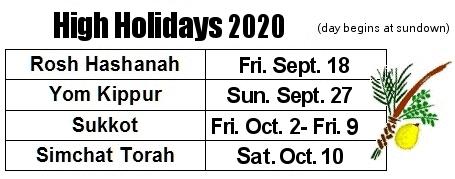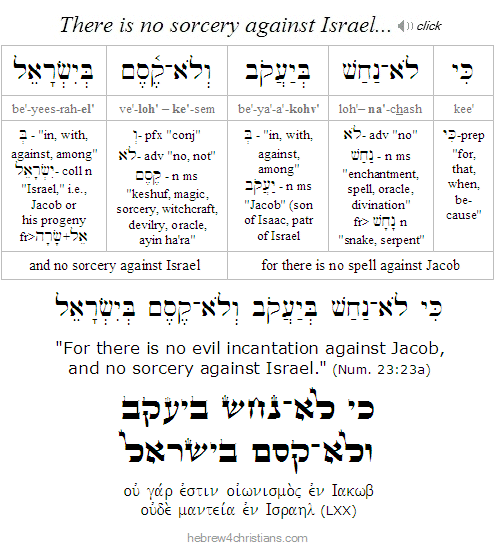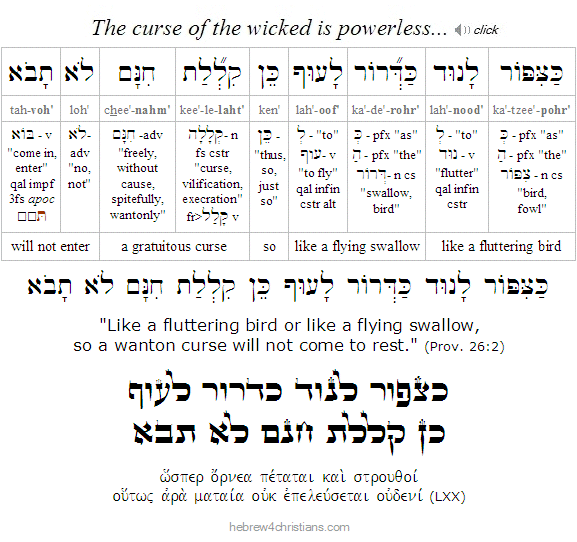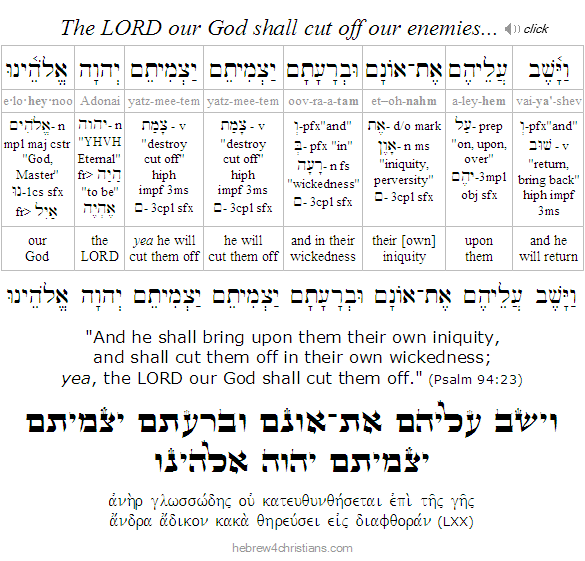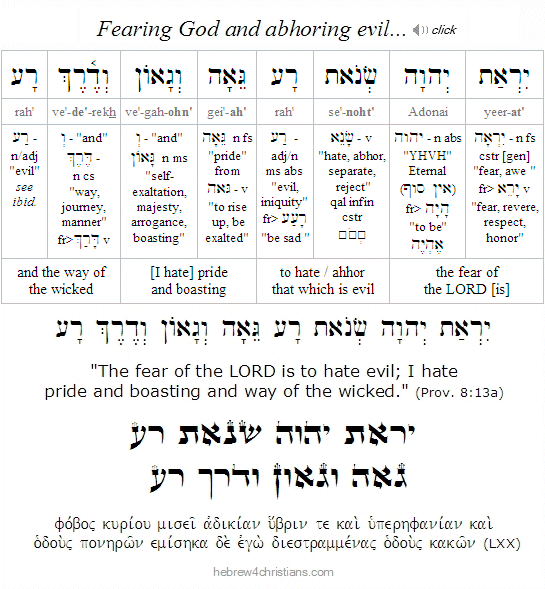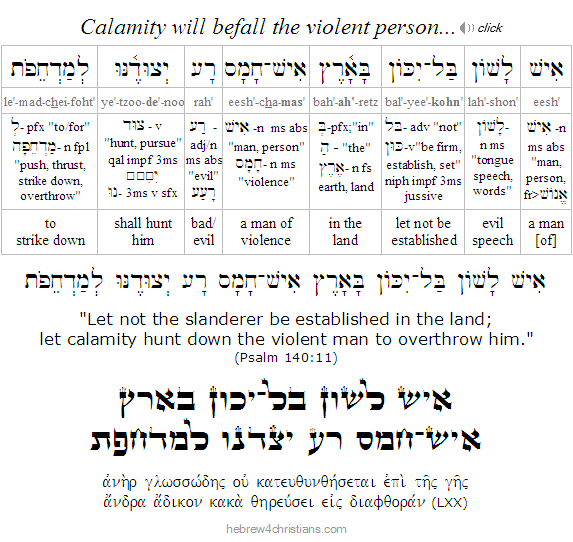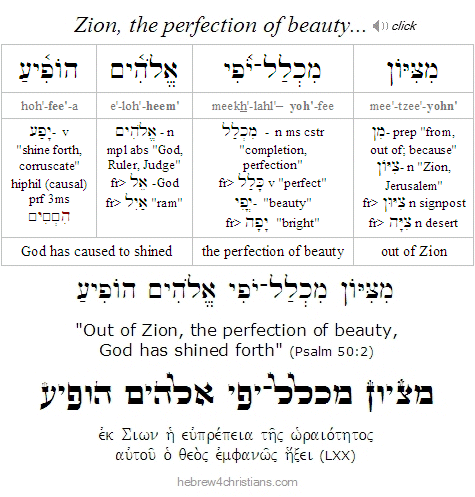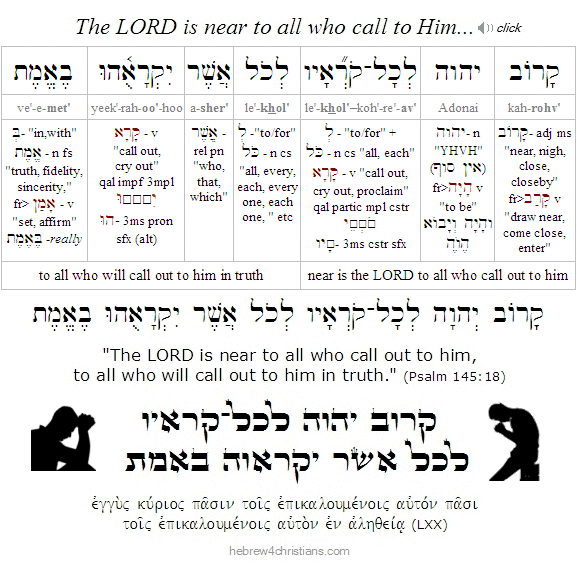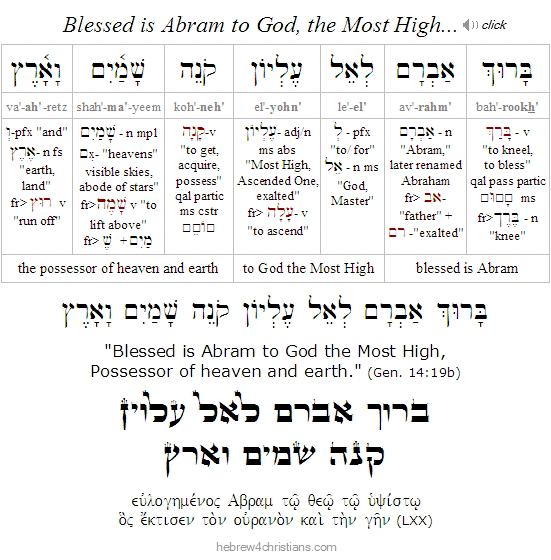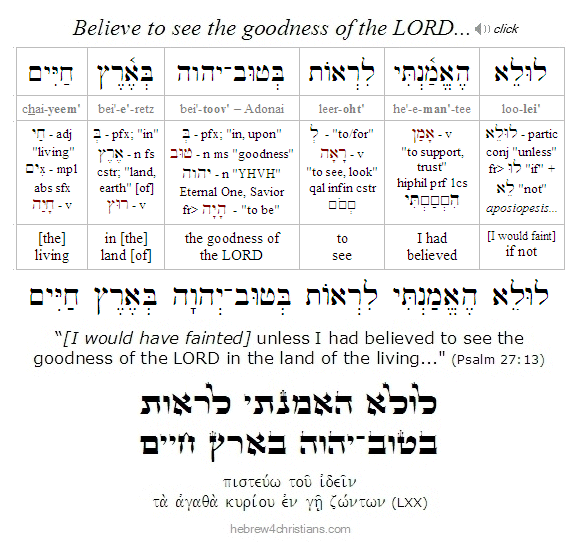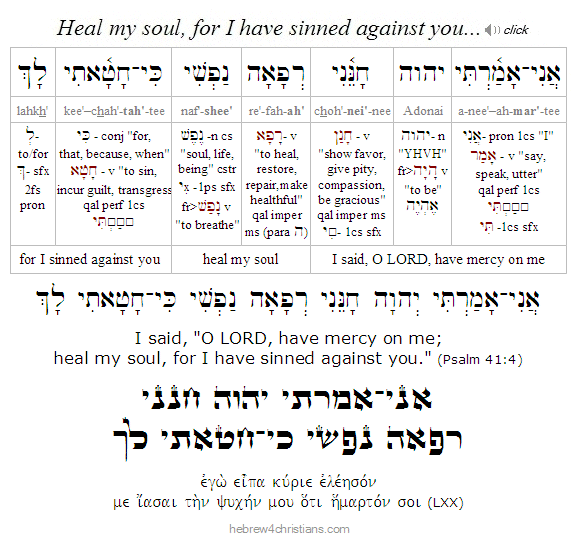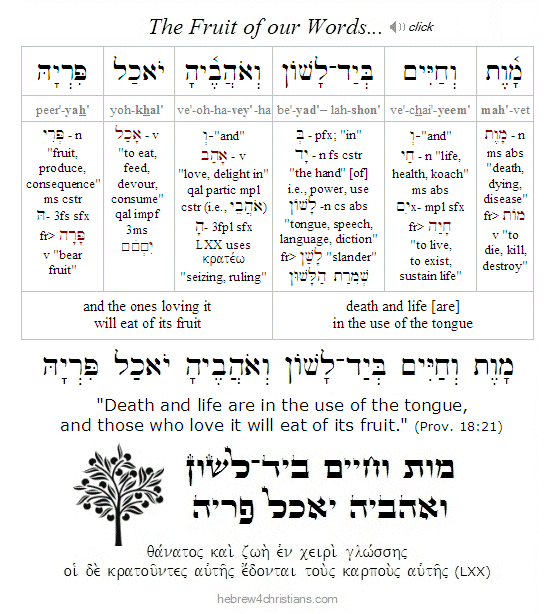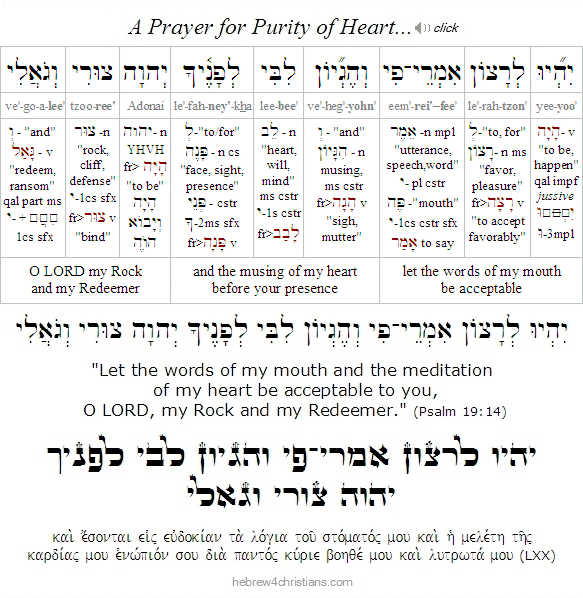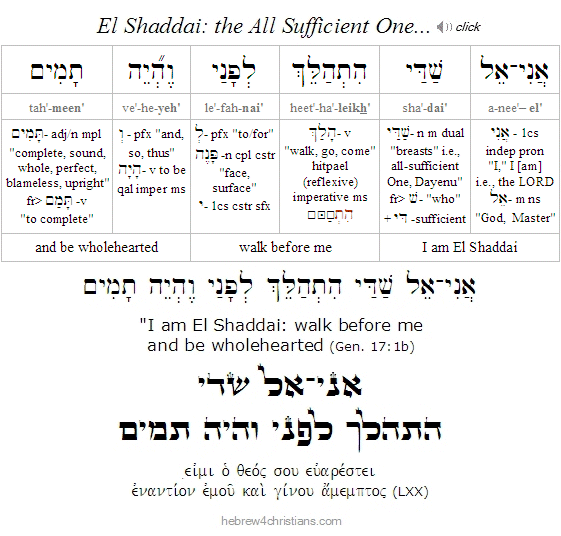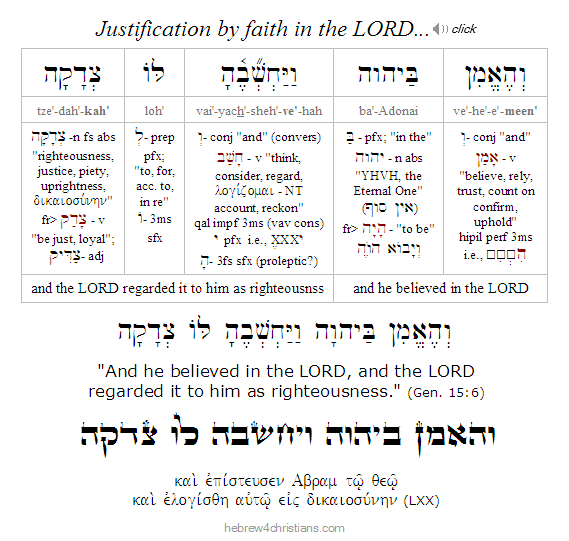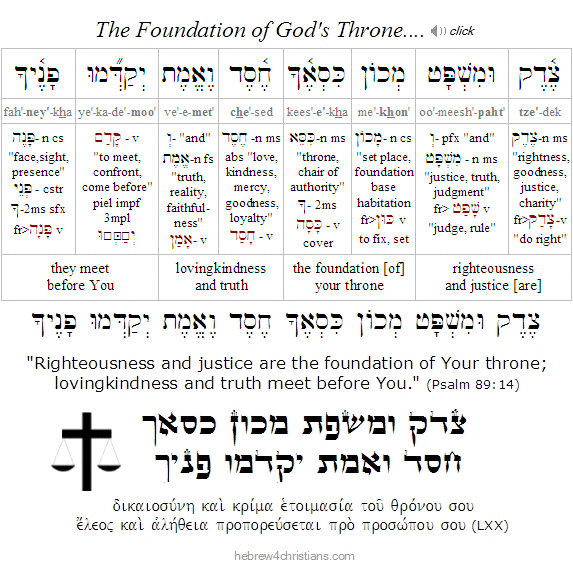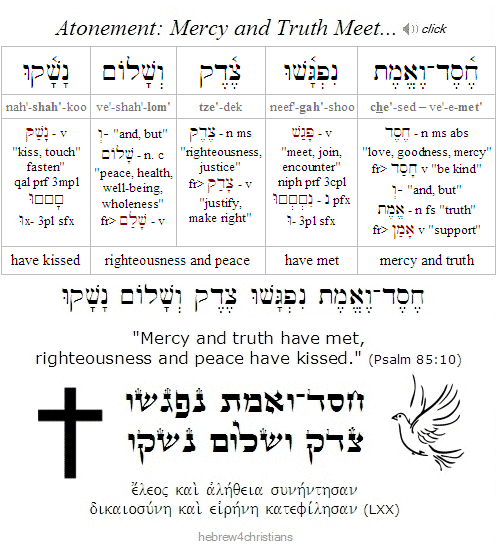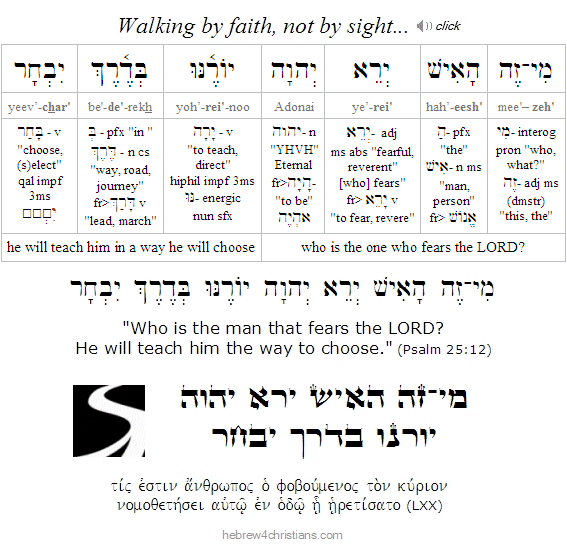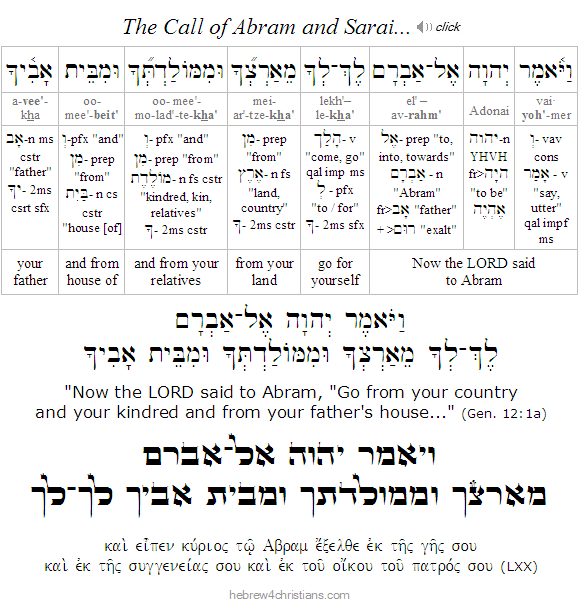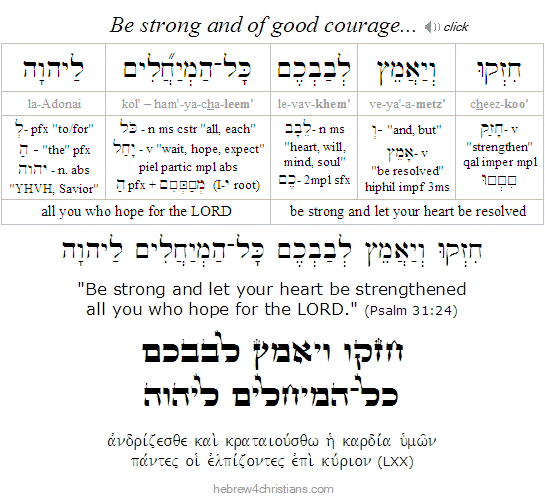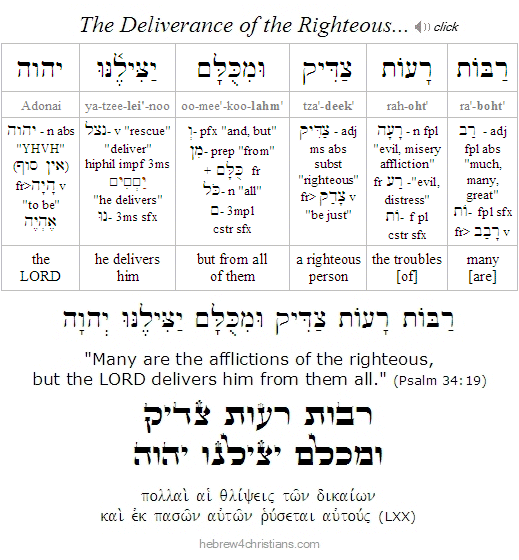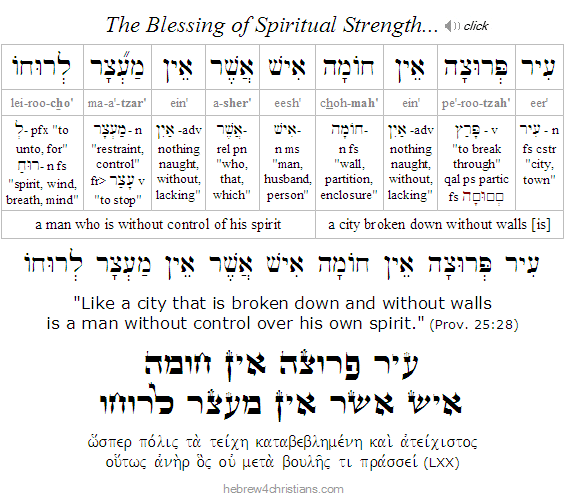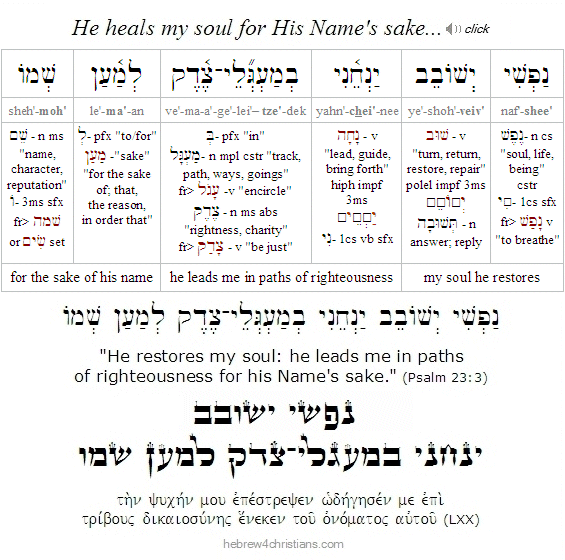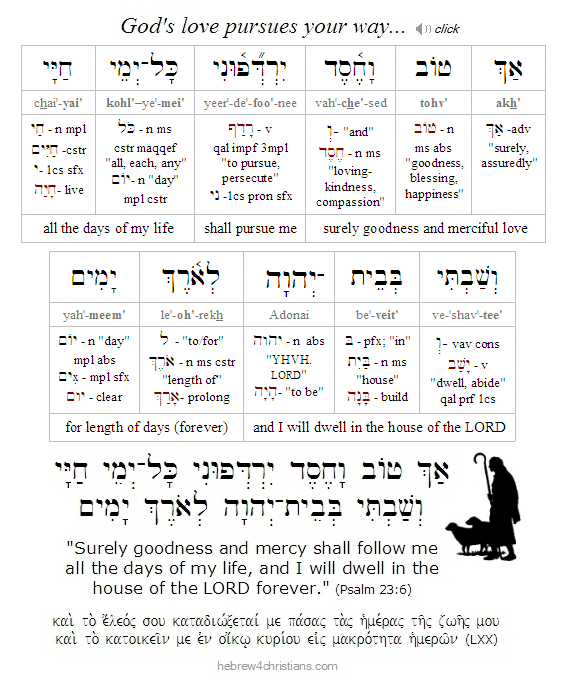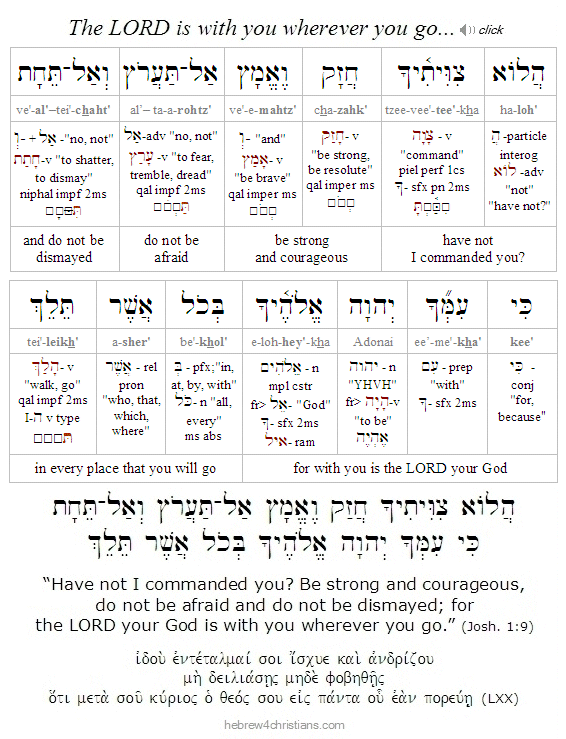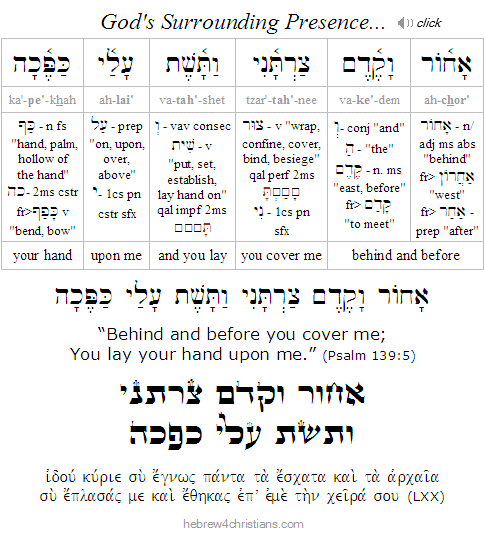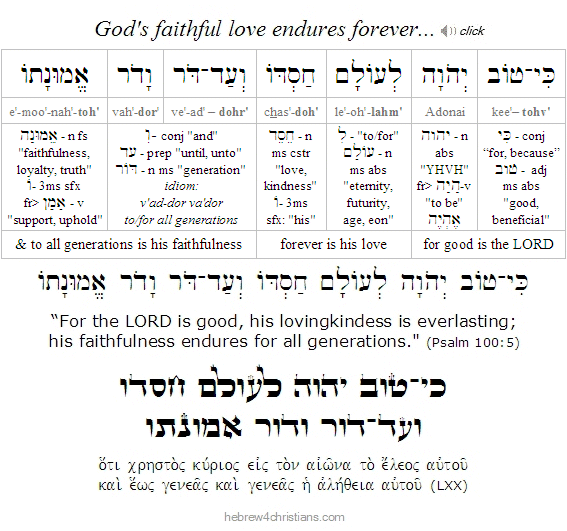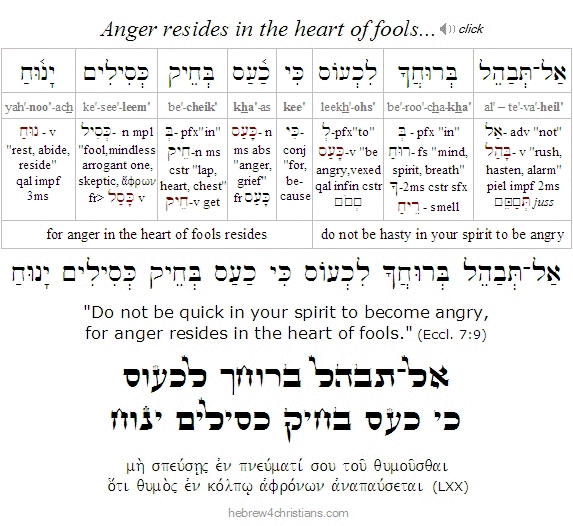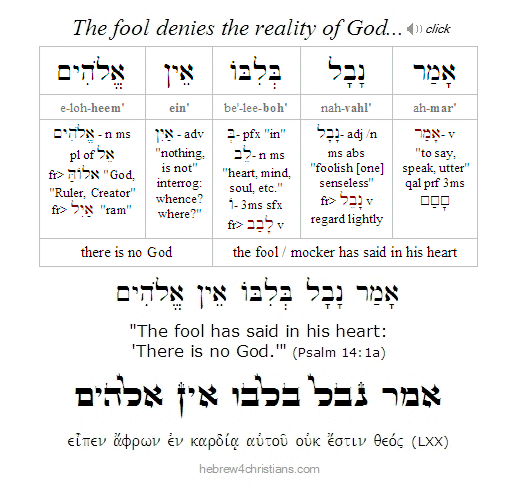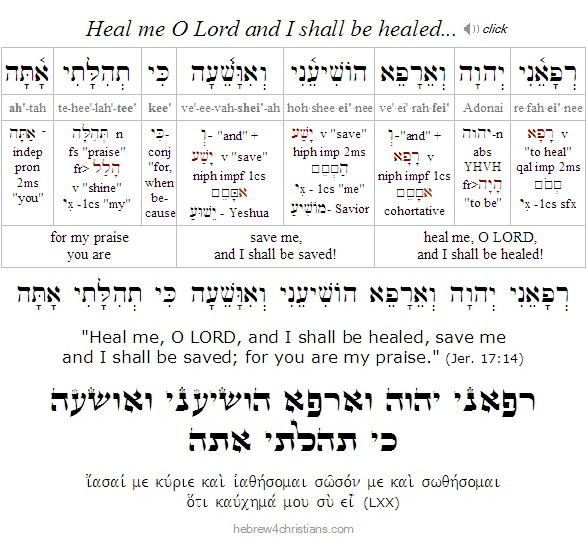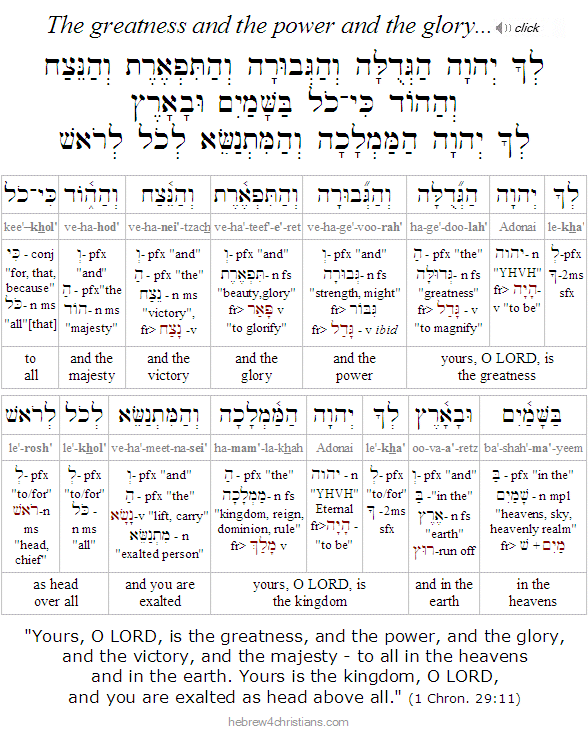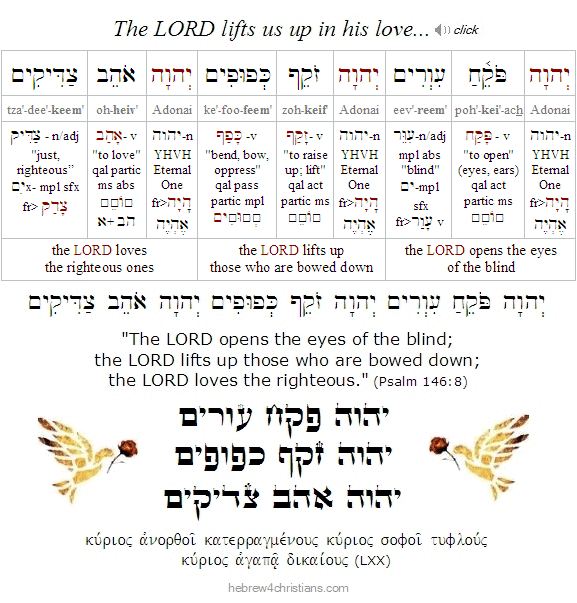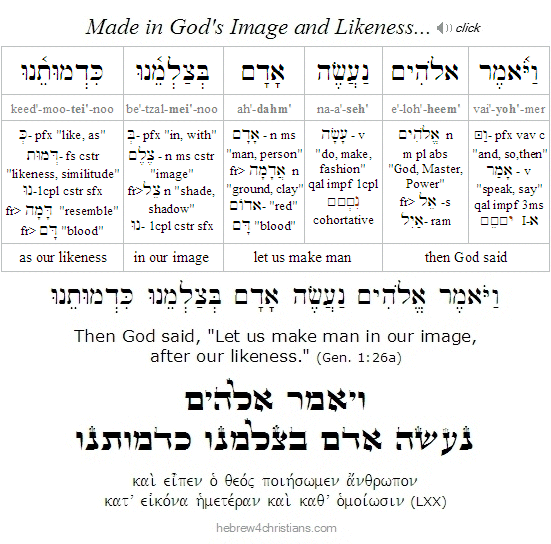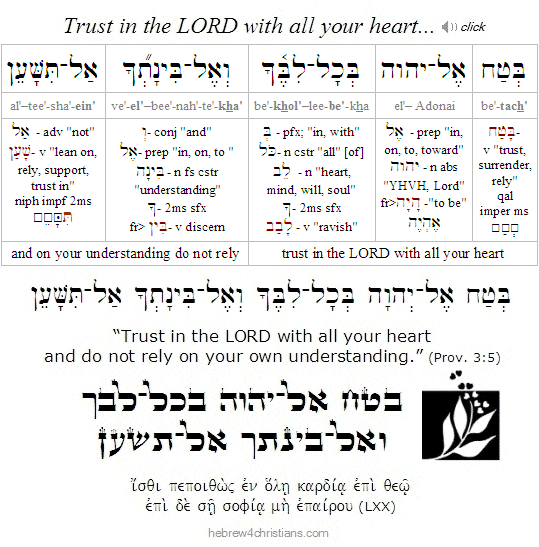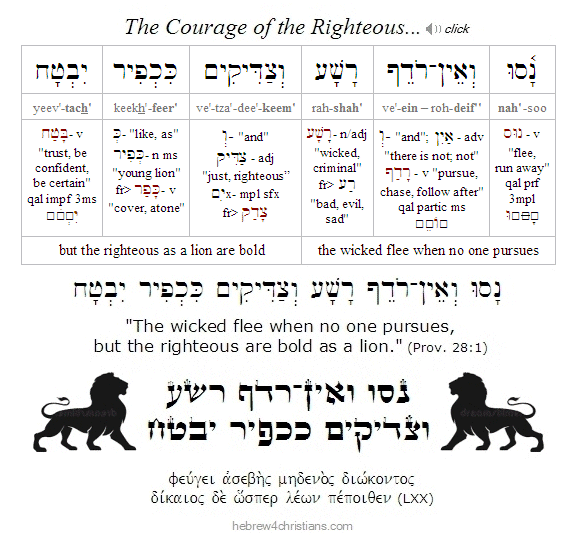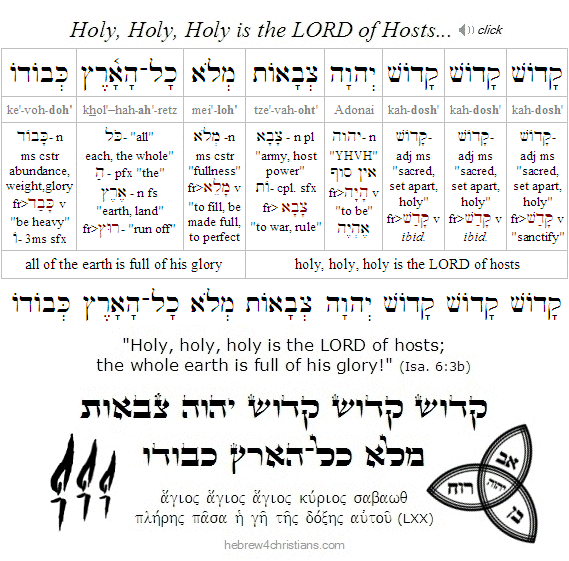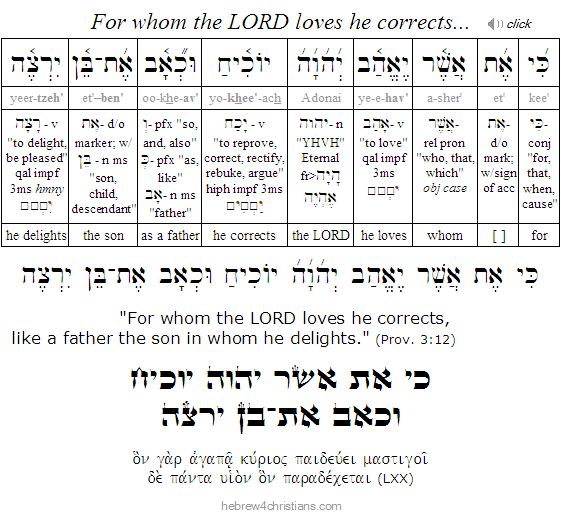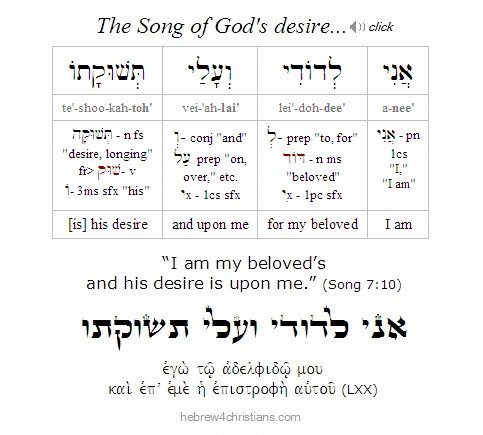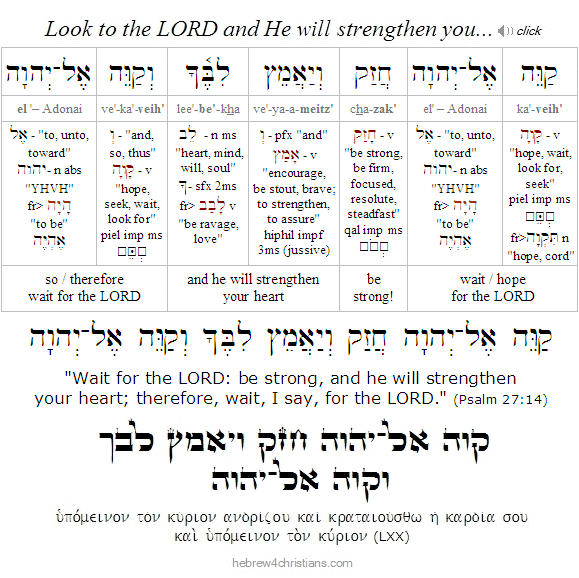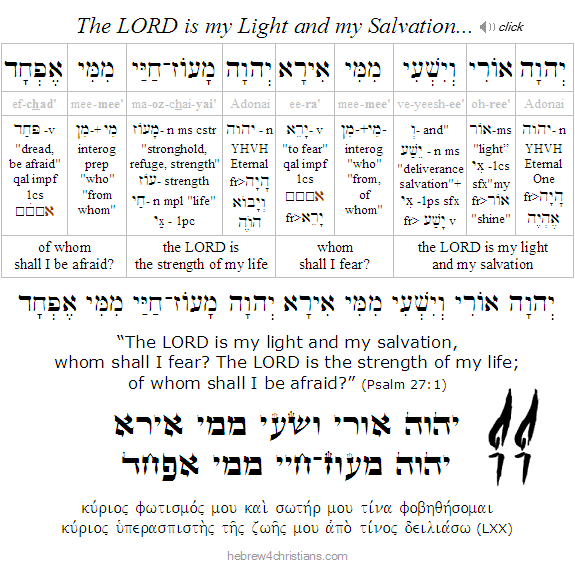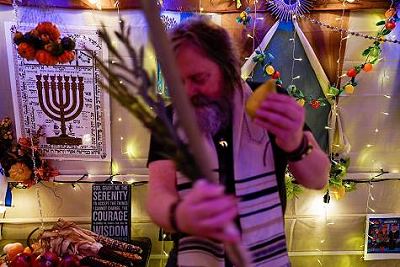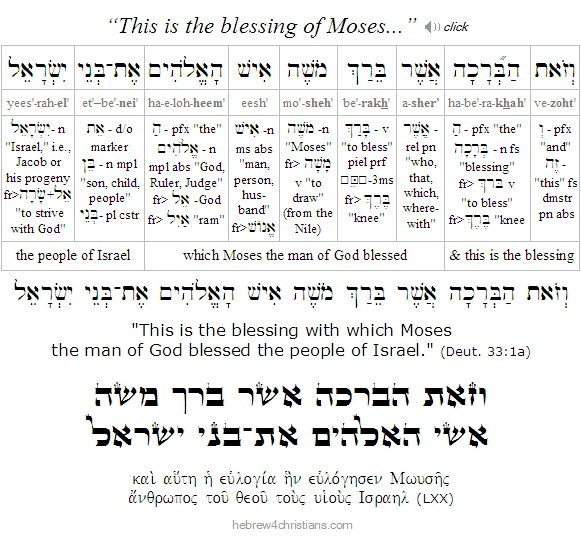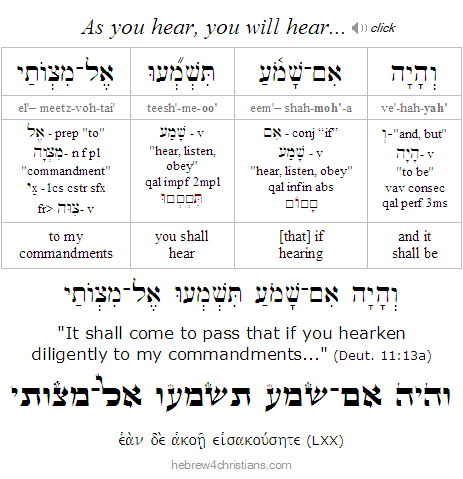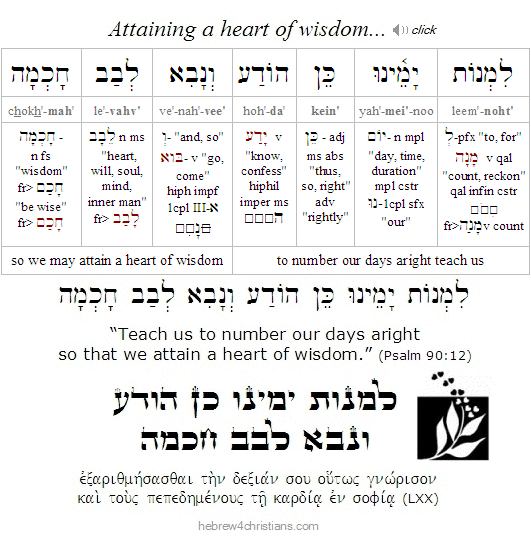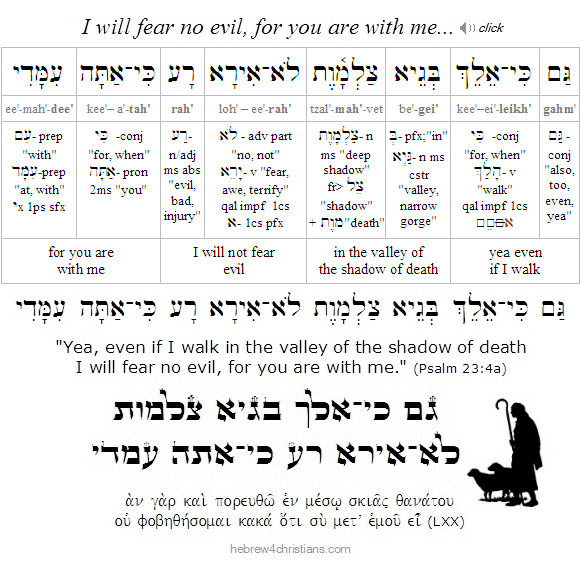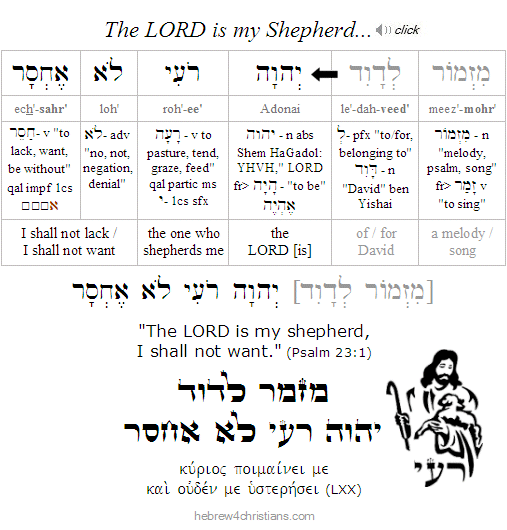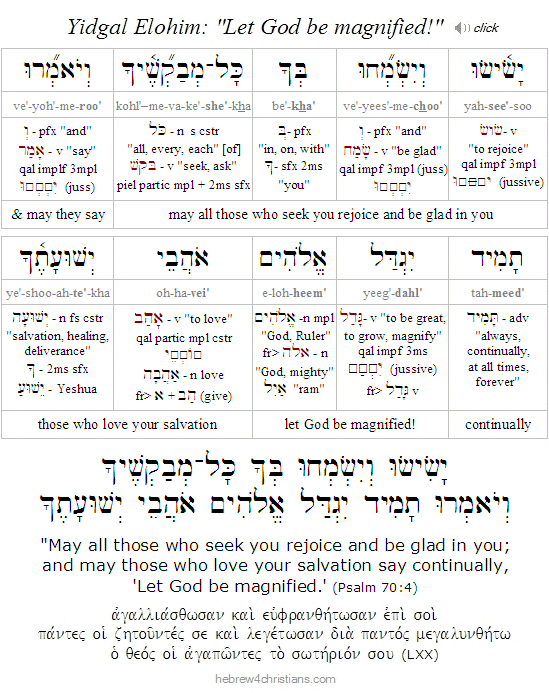|
Jewish Holiday Calendar
For October 2020 site updates, please scroll past this entry....
The Torah divides the calendar into two symmetrical halves: the Spring and the Fall, indicating the two advents of Messiah. The Biblical year officially begins during the month of the Passover from Egypt (called Rosh Chodashim, see Exod. 12:2), and the spring holidays of Passover, Unleavened Bread, and Firstfruits both recall our deliverance from Egypt and also our greater deliverance given by means of the death, burial, and resurrection of the Messiah, the great Passover Lamb of God. Yeshua was crucified on erev Pesach, buried during Unleavened Bread, and was resurrected on Yom Habikkurim (Firstfruits). The holiday of Shavuot (i.e., "Pentecost") both commemorates the revelation of the Torah at Sinai as well as the revelation of the Ruach HaKodesh (Holy Spirit) at Zion, in fulfillment of the promise given by our Lord....
The intermediate months of summer end with the advent of the sixth month of the calendar, called the month of Elul, which recalls the time Moses interceded on behalf of Israel after the sin of the Golden Calf. To commemorate this time of our history, we likewise focus on teshuvah (repentance) in anticipation of Rosh Hashanah and especially in anticipation of Yom Kippur, the great "Day of Atonement." In Jewish tradition the 30 days of Elul are combined with the first ten days of the seventh month (called the "Days of Awe") to set apart "Forty Days of Teshuvah" leading up to the Day of Forgiveness for Israel. Immediately following Yom Kippur, the mood changes as we begin preparing for a joyous week-long celebration called Sukkot (i.e., "Tabernacles") that concludes with the holiday of Simchat Torah.
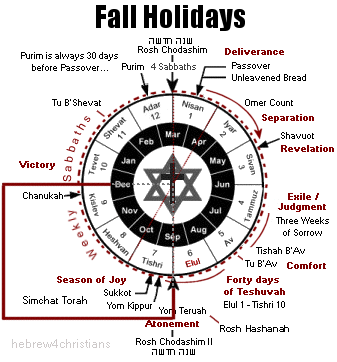 |
The Fall Holidays:

The fall festivals prophetically indicate the Day of the LORD, the second coming of Yeshua, the great national turning of the Jewish people, and the establishment of the reign of the Messiah upon the earth during the Millennial Kingdom in the world to come.
Note that in accordance with tradition, holiday dates begin at sundown. Moreover, some holidays may be postponed one day if they happen to fall on the weekly Sabbath:
1. Month of Elul (Wed. Aug. 19th [eve] - Fri. Sept. 18th [day])
2. Month of Tishri (Fri. Sept. 18th [eve] - Sat. Oct. 17th [day]) - Fall holidays begin!
3. Month of Cheshvan (Sat. Oct. 17th [eve] - Mon. Nov. 6th [day])
- Four Sabbaths: Noach, Lekh-Lekha, Vayera, Chayei Sarah
- Yom Ha'Aliyah - Honoring Israel's immigrants (Sat. Oct. 24th; Cheshvan 7)
- Sigd - 50th day after Yom Kippur; Ethiopian Jewish holiday Sun Nov. 15th)
4. Month of Kislev (Mon. Nov. 17th [eve] - Tues. Dec. 15th [day])
- Four Sabbaths: Toldot, Vayetzei, Vayishlach, Vayeshev
- Winter Solstice: Mon. Dec. 21st, Tevet 5)
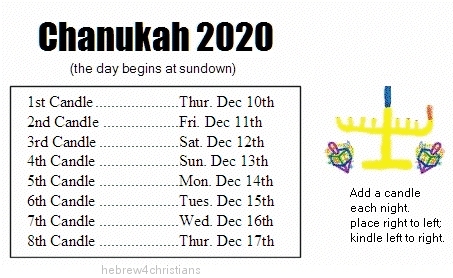
- Dates for Chanukah 2020 (5781):
- 1st Chanukah candle - Thurs. Dec. 10th [i.e., Kislev 25]
- 2nd Chanukah candle - Fri. Dec. 11th [Kislev 26]
- 3rd Chanukah candle: Sat. Dec. 12th [Kislev 27]
- 4th Chanukah candle: Sun. Dec. 13th [Kislev 28]
- 5th Chanukah candle: Mon. Dec. 14th [Kislev 29]
- 6th Chanukah candle: Tues. Dec. 15th [Kislev 20]
5. Month of Tevet (Fri., Dec. 15th [eve] - Sun. Jan. 26th [day])
- Four Sabbaths: Miketz, Vayigash, Vayechi, Shemot
- Dates for Chanukah (continued):
- 7th Chanukah candle: Wed. Dec. 16th [Tevet 1] (Chodesh Chanukah)
- 8th Chanukah candle: Thur. Dec. 17th [Tevet 2] Zot Chanukah
- Asarah B'Tevet - Fri. Dec. 25th (dawn); fast over the seige of Jerusalem
- Christmas: Fri. Dec. 25th (Tevet 9, 5781)
- Secular New Year: Fri. Jan. 1st, 2021 (Tevet 17, 5781)
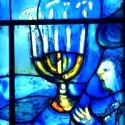 |
Note: For more about the dates of these holidays see the Calendar pages....
October 2020 Updates
Note: If any page content appears to be missing, please refresh the page...
Vanity of the Wicked...

10.30.20 (Cheshvan 12, 5781) Regarding the pagan holiday of "Halloween," remember that there is no "spell" or evil incantation (i.e., nachash: נַחַשׁ) effective against Jacob, there is no sorcery (i.e., kesem: קֶסֶם) against Israel. At this time it must be said of Jacob and of Israel, 'Look at what God has done (מַה־פָּעַל אֵל)' [Num. 23:23]. No weapon formed against God's people shall prosper (Isa. 54:17), and the curse of the wicked is powerless against the tzaddikim (Prov. 26:2). Ein od milvado (אֵין עוֹד מִלְבַדּו) - God is the only true Power (Deut. 4:35; 1 Chron. 29:11; Rev. 4:11). Satan is an impostor and a foiled usurper. As Yeshua told his followers, "Behold I give to you authority (ἐξουσία) to tread on serpents and scorpions and over all the power of the enemy (καὶ ἐπὶ πᾶσαν τὴν δύναμιν τοῦ ἐχθροῦ), and nothing shall by any means hurt you" (Luke 10:19). Like Balaam and Haman, all who curse God's people or attempt to foil His plans will be upended... Hallelujah and Amen.
Hebrew Lesson:
Numbers 23:23a reading (click):
"No weapon that is formed against you shall prosper; And every tongue that accuses you in judgment you will condemn. This is the heritage of the servants of the LORD, And their vindication is from Me," declares the LORD (Isa. 54:17). The wicked gnash their teeth and accuse the godly, but their words are vain and their end is certain... "Like a fluttering bird or like a flying swallow, so a wanton curse does not come to rest" (Prov. 26:2).
Hebrew Lesson:
Proverbs 26:2 reading (click):
Hebrew Lesson:
Psalm 94:23 reading (click):
Turning away from Evil...
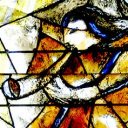
10.30.20 (Cheshvan 12, 5781) Contrary to the empty philosophy of this fallen world, the essence of love hates what is evil; just as it is hateful to be "tolerant" of what is wicked... Followers of Yeshua must love the truth and abhor the lie. Tolerating (or indulging) sin in a world ripe for judgment is a tacit form of "collaboration" with the enemy... Indeed, the only thing regarded as intolerable in the devil's world is the objection that people have a supposed "liberty" to sin. But the LORD is clear on this point: those who call evil good and good evil are subject to divine wrath and judgment (Isa. 5:20-21). Therefore we are enjoined: "O you who love the LORD, hate evil" (Psalm 97:10). Yes, hate what is evil (and most especially hate the evil within your own heart) and love what is good (Amos 5:15). As King David said, "Do I not hate those who hate you, O LORD? And do I not loathe those who rise up against you? I hate them with complete hatred; I count them my enemies" (Psalm 139:21-22). The connection between loving God and hating evil is repeated in the New Testament: "Let your love be genuine (ἀνυπόκριτος, without a "mask" put on): abhor what is evil; cling to what is good (Rom. 12:9). If we truly love the LORD, let us walk in the awe of His great Name by hating what is evil - both the sin lurking within our own breast and the cruelty and injustice we see in the world today...
Every day we make decisions regarding good and evil, and therefore every day we are deciding (i.e., proclaiming, teaching, attesting) what we love and what we hate. Choosing not to chose is itself a choice.... The issue is not whether we love or whether we hate, but what we love and what we hate. The LORD has paid us the "intolerable compliment" of forcing us to choose whether we will serve evil or turn to God for deliverance and life. And the choice is ours to make....
Hebrew Lesson:
Proverbs 8:13a reading (click):
The Scriptures do not mince words with this issue. "There are six things that the LORD hates, seven that are an abomination to him: haughty eyes, a lying tongue, and hands that shed innocent blood, a heart that devises wicked plans, feet that make haste to run to evil, a false witness who breathes out lies, and one who sows discord among brothers" (Prov. 6:16-19). "I hate and abhor lying, but I love Your law" (Psalm 119:163). "Take no part in the works of darkness, but instead expose them" (Eph. 5:11). The cross of Messiah is meaningless if God does not really hate sin, violence, and evil... The heart cry of the tzaddik adjures: "O you who love the LORD, hate evil" (Psalm 97:10).
Flee from the Wrath to Come...
Any culture that glorifies violence, despises moral authority and spiritual truth, and that tolerates injustice is under divine judgment. Indeed, throughout the Scriptures "Sodom" symbolically represents gross immorality, depravity, and therefore ineluctable self-destruction. For example, the prophet Ezekiel later wrote of Judah: "Behold, this was the guilt of your sister Sodom: she and her daughters had arrogance, abundant food, and careless ease, but she did not help the poor and needy. Thus they were haughty and committed abomination (תּוֹעֵבָה) before me; therefore I removed them when I saw it" (Ezek. 16:49-50). The New Testament refers to the fate of Sodom as "a fearful example of the everlasting fire of retribution" (Jude 1:7) -- the destructive result of spiritual anarchy, lawlessness, sexual perversion, and trauma (2 Pet. 2:6-10). Thankfully there is real hope for those who seek to escape from the wrath to come by turning to God and trusting in his healing power of salvation, though only a "remnant" shall find true deliverance (Matt. 7:14). Speaking of the final salvation of Israel, the Apostle Paul quotes Isaiah: "If the LORD of Hosts hadn't left us a few survivors, we'd be as desolate as Sodom, doomed just like Gomorrah" (Isa 1:9; Rom. 9:29). Flee from the wrath to come; find your refuge in Yeshua the LORD!
Hebrew Lesson:
Psalm 140:11 reading (click):
Escape from Egypt...
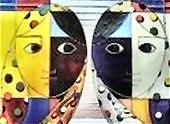
[ The following entry is related to this week's Torah reading, parashat Lekh-Lekha.... ]
10.30.20 (Cheshvan 12, 5781) Some time after entering the promised land, Abram's faith was tested: "Now there was a famine in the land, and Abram went down to Egypt to sojourn there..." (Gen. 12:10). The sages say that Abram stumbled by leaving the land, and that he should have trusted that the LORD would provide for him despite the apparent lack of food. Indeed during his time in Egypt Abram lost sight of God, lied about Sarai, compromised his values, and was passive as his wife was abducted into Pharaoh's harem. The situation got so bad that the LORD God finally intervened by sending "great plagues" upon Pharaoh and his household to rescue the family from their captivity (Gen. 12:17). Because of these plagues, Pharaoh urged Abram to to make an "exodus" from the land, and Abram left with wealth acquired there (including Hagar, a daughter of Pharaoh). Humbled by his lapse of faith, Abram then returned to the altar he built near Bethel and there called upon the LORD (Gen. 12:10-13:4). Note the parallels here with the later deliverance from Egypt under Moses. Indeed, during the "dark vision" Abram had at the "covenant of the parts" ritual, he foresaw that his experience with Pharaoh would be revisited in the lives of his children (Gen. 15:12-18). Even a great tzaddik like Abram had to learn obedience, as indeed did Messiah himself: "Although he was a son, he learned obedience through what he suffered" to become our great High Priest (Heb. 5:8-10). "Out of Egypt have I called my son..."
Abram's carnal excursion to Egypt resulted in the addition of Hagar to the family, and through her role as a "surrogate mother," to the advent of Abram's son Ishmael. Later the Apostle Paul associated the descendants of Hagar as "children of the flesh" in contrast to the descendants of Sarah who are "children of the promise." Ishmael's conception was "natural," i.e., was "of the flesh" and the result of human intervention and calculation; Isaac's conception, on the other hand, was supernatural and the result of God's direct intervention and design. Paul interprets these historical events in allegorical terms. The two mothers "represent" two distinct covenants: Hagar (the daughter of Pharaoh) represents the covenant made at Sinai that results in "children born for slavery," whereas Sarah represents the covenant made earlier based on divine promise that results in freeborn children (Gal. 4:24-27). Mount Sinai is in the barren wilderness -- the starting point of a nation that was once enslaved in Egypt; but Mount Zion/Jerusalem (representing the fulfilled promise) is in the "land flowing with milk and honey" -- the end point of a nation that was divinely chosen. Mount Sinai is ultimately barren, but Mount Zion is "the perfection of beauty" (Psalm 50:2) that bears innumerable children (Isa. 54:1).
Hebrew Lesson:
Psalm 50:2 reading (click):
For more on this subject, see "The Allegory of Hagar and Sarah."
The Spirit of Hope...

10.29.20 (Cheshvan 11, 5781) When Moses proclaimed the good news of God's forthcoming redemption for Israel, the Torah states that the people could not listen because they were "short of breath" (Exod. 6:9). Interestingly, this phrase (i.e., mi'kotzer ru'ach: מִקּצֶר רוּחַ) can also mean "lacking in spirit," as if in a paralyzed state of hopelessness. But how did the people become so downhearted? Had they forgotten the promise given to Abraham (Gen. 15:12-14)? Had they disregarded Joseph's final words (Gen. 50:24-25)?
According to some of the sages, part of the reason for their "shortness of breath" (besides the cruel bondage and hard labor imposed on them) was that the Israelites miscalculated the duration of their 400 year exile, and therefore they began to lose hope. When members of the tribe of Ephraim tried to escape from Egypt some 30 years before the time of the redemption, they were all killed by the Philistines, and many of the Israelites began to believe that they would remain as perpetual slaves (Shemot Rabbah, 20:11). They became "short of breath" and could no longer receive the message of the Holy Spirit...
Indeed, life in this evil world can be suffocating at times. And though we may not be under the oppression of a cruel Pharaoh, we are affected by the "princes of this age" who spurn the message of the Messiah's redemption and love, and we are still subjected to bondage imposed by taskmasters who defy the LORD and who seek to enslave us by means of lies, propaganda, and threats of violence... The devil is still at work in the hearts and minds of many of his "little Pharaohs" that govern the world system... The Scriptures make it clear that we are engaged in genuine spiritual warfare: "For we do not wrestle against flesh and blood, but against the rulers, against the authorities, against the cosmic powers over this present darkness, against the spiritual forces of evil in the heavenly places" (Eph. 6:12).
It is evident that one of the central purposes of God's redemption is to bestow freedom and dignity upon his people. As the story of Pharaoh reveals, God does not take kindly to oppressors, dictators, and other megalomaniacal world leaders who deny the truth and who therefore seek to enslave (or kill) human beings created in His image and likeness. Just as God judged Egypt for its oppression and violence, so He will one day break the "rulers of this world" with a rod of iron and dash them in pieces like a potter's vessel (Psalm 2:9-10). Halevai...
To help us "catch our breath" during this time of waiting for the coming day, it is important to remember that the LORD redeems us so that we may become His children and therefore be clothed with everlasting dignity... Our redemption makes us heirs of the Kingdom of God and citizens of heaven. We must never regard ourselves as slaves - not to the State, not to the bankers, not to fear, and not to religion (Gal. 5:1). God gave up His Son for us so that we could be made free to live with honor as his dearly loved children.... All the threats of the world system - economic, political, religious, social, etc. - are ultimately made empty and vain by the glorious redemption promised to us in Yeshua our Savior.
There is an old story of the Maggid of Brisk who each year would bring proof from the Torah that the Messiah would come that year. Once a certain Torah student asked him, "Rabbi, every year you bring proof from the Torah that the Messiah must come that year, and yet he does not come. Why bother doing this every year, if you see that Heaven ignores you?" The Maggid replied, "The law states that if a son sees his father doing something improper, he is not permitted to humiliate him but must say to him, 'Father, the Torah states thus and so.' Therefore we must tell God, who is our Father, that by keeping us in long exile, he is, in a sense, causing injustice to us, and we must point out, "thus and so it is written in the Torah," in hope that this year he might redeem us." This same principle, of course, applies to those of us who are living in exile and who eagerly await the second coming of the Messiah Yeshua. We should continue asking God to send Him speedily, and in our day, chaverim...
The Scriptures declare that "we are saved by hope" (ελπιδι εσωθημεν), that is, we are saved through an earnest expectation of good to come on account of the promises of the LORD God of Israel. Amen. The LORD is called "The God of Hope" (אֱלהֵי הַתִּקְוָה), indicating that He is its Author and its End (Rom. 15:13). God both gives birth to our hope (tikvah) and is the satisfaction of our heart's deepest longings. For those with God-given hope, gam zu l'tovah – all things work together for good (Rom. 8:28). In light of God's promises, hope is the one "work" that we are called to vigorously perform: "What shall we do, that we might work the works of God?" Yeshua answered, "This is the work of God, that you trust (i.e. hope) in the one whom He sent" (John 6:28-29).
Don't let the world system destroy or impugn your hope, chaverim... If the devil can't seduce you with illusory hope or counterfeit joy, he will attempt to oppress you with fear, outrage, and doubt. Fight the good fight of faith and refuse to succumb to despair. Run the race before you with endurance (Heb. 12:1). Look up, for the time of your deliverance draws near... God redeems us for the sake of His love and honor... It is the "breath of God" that gives us life and courage to face this dark and perverse world (John 20:22). May you be filled with the hope and strength that comes from the Holy Spirit. Amen.
אליך יהוה נפשׁי אשׂא
אלהי בך בטחתי אל־אבושׁה
אל־יעלצו איבי לי
e·ley'·kha A·do·nai naf·shee es·sa
E·lo·hai be·kha va·tach'·tee · al–e·vo'·shah
al–ya·al·tzoo oy·vai lee

"Unto thee, O LORD, do I lift up my soul.
O my God, I trust in thee: let me not be ashamed,
let not mine enemies triumph over me."
(Psalm 25:1-2)
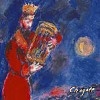
Download Study Card
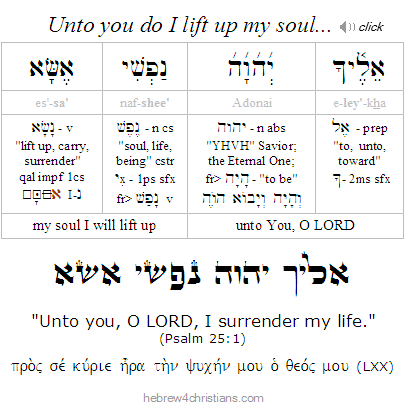
Keeping your Focus...
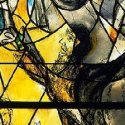
10.29.20 (Cheshvan 11, 5781) The walk of faith involves kavanah (כַּוָנָה), or focus; we are to "press on" (διώκω) to hear the upward call of God (Phil. 3:14). The problem for many of us is that we are irresolute, indecisive, and therefore we hesitate... A divided heart is at war within itself, "two-souled" (δίψυχος) and unstable in all its ways (James 1:8). If "purity of heart is to will one thing," then impurity of heart is the result of simultaneously willing two things... It is therefore a state of inner contradiction, of having two separate "minds" or "wills" that hold contrary thoughts or desires. Yeshua said that "a divided house cannot stand." May it please God to heal us of such ambivalence by making our hearts whole, resolute, steadfast, full of conviction, and entirely awake to the glory of His Presence at our right hand (Psalm 16:8). The LORD is always near; he is not far from each one of us. "Draw near to God (ἐγγίσατε τῷ Θεῷ) and he will draw near to you; purify your hearts, you double-minded" (James 4:8). As it is written: "The LORD is near to all who call on Him, to all who call on Him in truth" (Psalm 145:18). May we be set free from lesser fears that divide the heart and rob the soul of shalom shelemah, God's perfect peace... Amen.
Hebrew Lesson:
Psalm 145:18 reading (click):
The Original Priesthood...
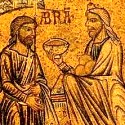
[ The following entry is related to this week's Torah reading, parashat Lekh-Lekha.... ]
10.29.20 (Cheshvan 11, 5781) The Torah reveals that the very first "priest" (i.e., kohen: כּהֵן) was neither a Jew nor a Levite nor a descendant of Aaron, but rather Someone who is said to have "neither beginning of days nor end of life" but is made like (ἀφωμοιωμένος) the Son of God, a priest continually (Heb. 7:3). This priest, of course, was Malki-Tzedek (מַלְכִּי־צֶדֶק), the King of Salem (מֶלֶךְ שָׁלֵם) to whom Abraham offered tithes after his victory over the kings (Gen. 14:18). The author of the Book of Hebrews makes the point that the priesthood of Malki-Tzedek is greater than the Levitical priesthood and is therefore superior to the rites and services of the Tabernacle (Heb. 7:9-11). It was to Malki-Tzedek that Abram (and by extension, the Levitical system instituted by his descendant Moses) gave tithes and homage -- and rightly so, since Yeshua is the great High Priest of the ultimate covenant based on God's eternal life (Heb. 8:6).
Hebrew Lesson:
Genesis 14:19b reading (click):
For more on this subject, see the article, "Exploring the Identity of Malki-Tzedek."
The Meaning of "Hebrew"...

[ The following entry is related to this week's Torah reading, parashat Lekh-Lekha.... ]
10.28.20 (Cheshvan 10, 5781) In our Torah reading for this week (i.e., parashat Lekh Lekha) Abram is called ha-ivri (הָעִבְרִי) - "the Hebrew," a term that means "one who has crossed over" (עָבַר) from another place (Gen. 14:3). Rashi identifies this "other place" as Ur of the Chaldees (אוּר כַּשְׂדִים), located east of the Euphrates River, though the midrash (Genesis Rabbah) symbolically identifies it as the realm of idolatry: "The whole world stood on one side, but Abram crossed over to the other." Abram separated himself from a world steeped in idolatry and polytheism by worshiping the One LORD God who is the sole Creator of all things.... Understood in this way, being "Hebrew" means being regarded as an "other," a "stranger," or an "outsider" to idolatrous world culture. Similarly, all those who "cross over" from the realm of death to life because of Yeshua our Savior are rightly called "Hebrews" (John 5:24).
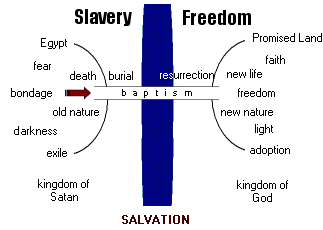 |
To Abram came to divine invitation: "Lekh-Lekha, go forth ... I will show you" (Gen. 12:1). It was only after Abram made the long journey to the unknown land of Canaan that God appeared to him to him by the Oaks of Mamre saying, "To your offspring I will give this land" (Gen. 18:1). Abram did not believe the promise because he saw God; he was only able to see God after he had walked in faith. First Abram heard the message, and later - after he acted on his faith - was he enabled to see more. This is the deeper meaning of being "Hebrew," one who crosses over from the realm of the dead to the realm of the Living God...
Therefore we note that hearing (shema) is more important than simply seeing... When we hear the truth and accept it into our understanding, it informs our perceptions, not the other way around. Truth is something revealed to the heart first, and only later to the senses.
Hebrew Lesson:
Psalm 27:13 reading (click):
Words of Death and Life...
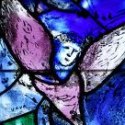
10.28.20 (Cheshvan 10, 5781) Just as the body can become sick with illness, so can the soul: "I said, 'O LORD, be gracious to me; heal my soul (רְפָאָה נַפְשִׁי), for I have sinned against you'" (Psalm 41:4). The targum Onkelos states that God breathed into Adam the ability to think and to speak. In other words, thought and speech are two primary characteristics of the image (tzelem) and likeness (demut) of God. Since our use of words is directly linked to the "breath of God" within us, lashon hara (לָשׁוֹן הָרָה), or evil speech, defaces God's image within us.... Using words to inflict pain therefore perverts the image of God, since God created man to use language to "build up" others in love. This is part of the reason the metzora (i.e., one afflicted with tzara'at, or skin disease) was regarded as a "leper" in need of rebirth...
Hebrew Lesson:
Psalm 41:4 reading (click):
Lashon hara (evil speech) is really a symptom of the "evil eye" (ayin hara). As it says in Scripture: "Evil comes to one who searches (דָּרַשׁ) for it" (Prov. 11:27). We must train ourselves to use the "good eye" (ayin tovah) and extend kaf zechut (כַּף זְכוּת) - the "hand of merit" to others. Genuine faith is optimistic and involves hakarat tovah, that is, recognizing the good in others and in life's circumstances. Gam zu l'tovah: "This too is for the good" (Rom. 8:28). The Midrash states that God afflicted houses with tzara'at so that treasure hidden within the walls would be discovered. The good eye finds "hidden treasure" in every person and experience.
King David said (Psalm 35:13): "May what I prayed for happen to me!" (literally, tefillati al-cheiki tashuv - "may it return upon my own breast"). Some of our prayers are conscious words spoken to God, whereas others are unconscious expressions of our inner heart attitudes. When we harbor indifference, ill will, or unforgiveness toward others, we are only hurting ourselves. It is very sobering to realize that our thoughts are essentially prayers being offered up to God... When we seek the good of others we find God's favor, healing and life. Yeshua spoke of "good and evil treasures of the heart" that produce actions that are expressed in our words (Luke 6:45). A midrash states that if someone speaks well of another, the angels above will then speak well of him before the Holy One.
In light of the enigma of "spiritual impurity" (i.e., tumah) and its ultimate expression revealed in the corruption of death, it is all the more telling that we should heed the cry of the Spirit: "Choose Life!" (Deut. 30:19). מָוֶת וְחַיִּים בְּיַד־לָשׁוֹן - "Death and life are in the use of the tongue" (Prov. 18:21). Sin is a type of "spiritual suicide" that seduces us to exchange eternal good for the petty and trivial. The nachash (serpent) in the garden of Eden was the first to speak lashon hara. He slandered God and lied to Eve about how to discern between good and evil. He is a murderer and the father of lies. Resist his wiles with the truth of God...
Hebrew Lesson:
Proverbs 18:21 reading and derash (click):
May it please the LORD to help each of us be entirely mindful of the power and sanctity of our words... May it please Him to help us use our words for the purpose of strengthening and upbuilding (οἰκοδομὴν) one another (Eph. 4:29). May God help us take every thought "captive" to the obedience of the Messiah, thereby enabling us to always behold and express the truth of God's unfailing love. Amen.
Hebrew Lesson:
Psalm 19:14 reading and derash (click):
The Name El Shaddai...

[ The following entry is related to this week's Torah reading, parashat Lekh-Lekha.... ]
10.27.20 (Cheshvan 9, 5781) When Abram was ninety-nine years old the LORD appeared to him and said, "I am El Shaddai (אֲנִי־אֵל שַׁדַּי); walk before me, and be made whole" (Gen. 17:1). Since the compound name "El Shaddai" depicts the image of a nursing mother (i.e., the word shadayim (שדיים) means "breasts," symbolizing sufficiency and nourishment, e.g., Gen. 49:25), perhaps this revelation was meant to remind Abram and Sarai that the LORD would be the Womb, the Sustenance, and the Substance of the coming promised Seed. Only God can bring life out of death - even life from the deadness of Sarai's womb (see Rom. 4:19). For this reason, both Sarai and Abram were renamed by adding the letter Hey (ה) to their original names, symbolizing the Holy Spirit of God. The promised Seed was to be born miraculously, not unlike the virgin birth of the Messiah reported in the Gospels (i.e., just as Sarai was "without a womb" yet enabled to bear the promised seed (of Isaac), so was Mary, a virgin who was enabled to bear God's promised Seed - the Messiah).
אֲנִי־אֵל שַׁדַּי
הִתְהַלֵּךְ לְפָנַי וֶהְיֵה תָמִים
a·nee · El · sha·dai
heet·ha·leikh · le·fa·nai · ye·he·yeh · ta·mim

"I am El Shaddai:
walk before Me and be wholehearted." (Gen. 17:1)

Hebrew Lesson:
Gen. 17:1b reading (click):
Most English translations render El Shaddai as "God Almighty," probably because the translators of the Septuagint (i.e., the ancient Greek translation of the Old Testament) thought Shaddai came from a root verb (shadad: שָׁדַד) that means "to overpower" or "to destroy." The Latin Vulgate likewise translated Shaddai as "Omnipotens" (from which we get our English word omnipotent). In other words, the translators regarded this term to suggest that God is so overpowering that He is considered "Almighty." According to the Jewish sages, however, Shaddai is a contraction of the phrase, "I said to the world, dai (enough)" (as in the famous word used in the Passover Haggadah, Dayenu -- "it would have been sufficient"). God created the world but "stopped" at a certain point. He left creation "unfinished" because He wanted us to complete the job by means of exercising chesed (love) in repair of the world (tikkun olam).
Jacob's blessing given in Genesis 49:25, however, indicates that Shaddai is indeed related to the word for breasts (shadayim), indicating sufficiency and nourishment (i.e., "blessings of the breasts and of the womb" (בִּרְכת שָׁדַיִם וָרָחַם)). In this case, the Name might derive from the contraction of sha ("who") and dai ("enough") to indicate God's complete sufficiency to nurture the fledgling nation into fruitfulness. Indeed, God first uses this Name when He refers to multiplying Abraham's offspring (Gen. 17:2). Understood in this light, the name El Shaddai provides a picture of God's nurturing love for our lives... God sustains us and loves us, like a mother loves her newborn child...
El Shaddai is used almost exclusively in reference to the three great patriarchs: Abraham, Isaac, and Jacob, and (according to Exodus 6:2-3) was the primary name by which God was known to the founders of Israel (the name YHVH given to Moses suggests God's absolute self-sufficiency, whereas the name Elohim suggests God's sovereign power). The word "Shaddai" (by itself) was used later by the prophets (e.g., Num. 24:4; Isa. 13:6, Ezek. 1:24) as well as in the books of Job, Ruth, and in the Psalms. In modern Judaism, Shaddai is also thought to be an acronym for the phrase Shomer daltot Yisrael - "Guardian of the doors of Israel" - abbreviated as the letter Shin on most mezuzot:
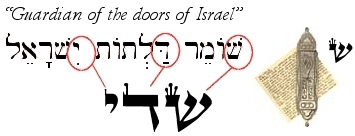 |
Heart of Righteousness...
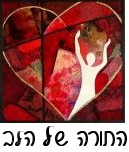
10.27.20 (Cheshvan 9, 5781) From our Torah reading for this week (Lekh-Lekha) we learn about the resolute faith of Abram who, despite his old age, trusted that God would make him a father with descendants as numerous as the stars in the night sky: "And the LORD brought him outside and said, "Look toward heaven and count the stars, if you are able to number them." Then the LORD said to him, "So shall your offspring be. And he trusted in the LORD, and He reckoned it to him for righteousness" (Gen. 15:6). Abram "staggered not" at the promise of God, and therefore God imputed to him righteousness (צְדָקָה), a term understood here to be divine esteem and grace. After all, what could Abram do in the face of seeming impossibility? There was nothing he could do to bring about the miracle. The New Testament comments: "He did not weaken in faith when he considered his own body, which was as good as dead (since he was about a hundred years old), or when he considered the barrenness of Sarah's womb" (Rom. 4:19). It was in a state of utter powerlessness and complete helplessness that Abram retained hope and thereby received the promise by faith. "For he was beyond hope, yet in hope he trusted that he would indeed become a father to many nations, in keeping with what he had been promised, 'so shall your offspring be'" (Rom. 4:18).
Understand that 400 years before the law was given at Sinai, the LORD regarded the faith of Abram as the heart of the righteousness later prescribed by the Torah. Therefore the very First Commandment of the Decalogue is simply: Anochi Adonai Elohekha (אָנכִי יְהוָה אֱלהֶיךָ): "I AM the LORD your God" (Exod. 20:2), which repeats the call to trust God before everything else, since it is complete surrender to the love and grace of God that justifies us, as it is written: "to the one who does not work but trusts in the One who justifies the ungodly (i.e. the helpless), his faith is counted as righteousness" (Rom. 4:5).
Where the LORD says "Look toward heaven and count the stars, if you are able to number them," we note the Hebrew word "count" (סָפַר) may also mean "recount," "interpret," or explain... This is the same word used in the famous verse, "The heavens declare (מְסַפְּרִים) the glory of God" (Psalm 19:1). The idea here would be not merely that Abraham would have lots of descendants, but they would shine in brilliance against the backdrop of the darkness. Abraham's children would be lights upon the earth, declaring the truth of God and enlightening the darkness of mankind. "And those who are wise shall shine like the brightness of the sky above; and those who turn many to righteousness, like the stars forever and ever" (Dan. 12:3). In the same way, "let your light shine before others, so that they may see your good works and give glory to your Father who is in heaven" (Matt. 5:16; 13:43).
Hebrew Lesson:
Gen. 15:6 reading (click):
Broken and Remade...

10.27.20 (Cheshvan 9, 5781) "See to it that no one fails to obtain the grace of God; that no root of bitterness springs up and causes trouble, and by it many become defiled; that no one is immoral or profane like Esau, who sold his birthright for a single meal. For you know that afterward, when he desired to inherit the blessing, he was rejected, for he found no chance to repent, though he sought it (the blessing) with tears" (Heb. 12:15-17; Gen. 27:38). "For my people have committed two evils: they have forsaken Me, the fountain of living waters (מְקוֹר מַיִם חַיִּים), and hewed out cisterns for themselves, broken cisterns that can hold no water" (Jer. 2:13). Spiritually speaking, there are two basic sorts of breaking. One is to be broken by the inevitable sin and ruin of this world, and the other is to be made lev-nishbar (לֵב־נִשְׁבָּר), a broken heart, before the LORD. The former breaking comes from the vain attempt to find life in the broken vessels of this world, and "repentance" is expressed as remorse over perceived temporal loss. This sorrow eventually leads the soul to death (2 Cor. 7:10). To be inwardly broken, on the other hand, requires mourning over your life and returning to God for deliverance (Matt. 5:4). In hunger and thirst for God's righteousness the soul finds eternal satisfaction, since God alone provides the vessel of "living water" we need to live (John 4:14; 7:38). We all must drink from God's fountain of life (מְקוֹר חַיִּים), lest we suffer spiritual dehydration and death....
Are you haunted by an inner ache for love, joy, peace, and life? "Blessed are those who hunger and thirst for righteousness, for they shall be satisfied" (Matt. 5:6). Our inner poverty and need is a disguised grace; our desire for healing reveals the Spirit's invitation. Faith begins with the recognition of our need, since only then will we come to Yeshua for the "Bread of Life" (לֶחֶם הַחַיִּים) and the "Living Water" (מַיִם חַיִּים). Everything we need is found in him, though we must reach out in faith: "For without faith (אֱמוּנָה) it is impossible to please him, for whoever would draw near to God must believe that he exists, and that he rewards those who seek him" (Heb. 11:6). God rewards those who seek him; he answers the heart's cry; he responds to all who trust in his love and salvation. Therefore "ask, and it will be given to you; seek, and you will find; knock, and it will be opened to you. For everyone who asks receives, and the one who seeks finds, and to the one who knocks it will be opened" (Matt. 7:7-8). We are not saved by faith in our own faith, but in the Reality and Power of the LORD God who alone can raise the dead to new life....
Hebrew Lesson:
1 Chron. 16:11 reading (click):
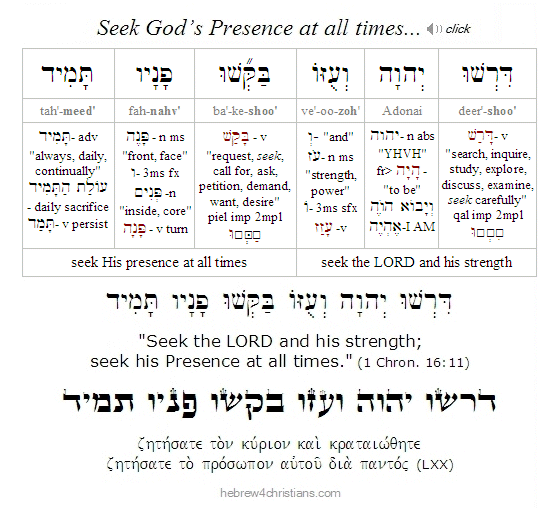 |
No Other Savior...

10.26.20 (Cheshvan 8, 5781) Philip said to him, "Show us the Father and we will be satisfied." Yeshua replied, "Have I been with you so long, and you still do not know me, Philip? Whoever has seen me has seen the Father. How then can you ask, 'Show us the Father'? (John 14:8-9). Yeshua – and Yeshua alone – reveals the heart and truth of God to us, and looking for God "beyond" Him – up in heaven, across the sea, or in the mysteries of unfathomable forces that pervade reality – is ultimately a sign of unbelief and a denial of God Himself. The Father and the Son are of one essence and trying to separate them vitiates the message of Yeshua and makes it appear unfinished.... On the contrary, the work of salvation is finished, and "Whoever has the Son has the life (החיים); but whoever does not have the Son of God does not have the life" (1 John 5:12). There is no other way to access the heart of the Father than through Yeshua, and Yeshua is the Name above all other names for salvation (John 14:6; Acts 4:12; Phil. 2:9-11; John 17:3). Every knee shall bow to Him; there is no other Savior (Isa. 45:21-23). Those who honor the Son honor the Father and understand the heart of creation. To know God is to know the revelation given in the Son, for the Son is God clothed in human skin, reaching out in compassion to heal the trusting sinner from eternal alienation. Just as the Angel of the LORD is the "King of Angels," the manifestation of God in angelic form, so the Son of Man is the manifestation of the LORD in human form. There is no other Savior; there is no further place to ascend or to seek: Yeshua is the Beginning and End of the Truth of the Compassion of the Eternal God. Let us resolve, then, that with all our heart, with all our soul, and with all that is within us, we shall express the truth of God's kingdom and the truth of His salvation. Amen.
Hebrew Lesson:
Psalm 89:14 reading (click):
"Many people love falsehood and only a few love truth. For it is possible to love falsehood truly, but it is impossible to love truth falsely" (R' Yaakov of Pshischa). May the LORD God of truth (יהוה אֵל אֱמֶת) help us to love truth truly, then, with all our hearts, since love and truth characterize God's rule: As it is written, "Righteousness and justice are the foundation of your throne; lovingkindess and truth meet before you" (Psalm 89:14).
אֱמֶת מֵאֶרֶץ תִּצְמָח
וְצֶדֶק מִשָּׁמַיִם נִשְׁקָף
e·met · me·e'·retz · teetz·mach
ve·tze'·dek · mee·sha·ma'·yeem · neesh·kaf

"Truth springs up from the ground,
and righteousness looks down from the heavens"
(Psalm 85:11)

Hebrew Lesson:
Psalm 85:11 reading (click):
Truth springs up everywhere; righteousness shines down over all the earth. This primarily concerns the sacrificial work of the Messiah, of which it is rightly said: "Love and truth have met; righteousness and peace have kissed" (Psalm 85:10). Because of the great reconciliation we have through Yeshua, the truth of God shall prevail among men. The "Seed" that was planted in Zion and becomes a Tree of Life throughout all the earth. "Deliverance goes before the LORD, and prepares a pathway for Him" (Psalm 85:13).
We have a moral imperative, given by God Himself, to receive the truth and to live according to the nature of spiritual reality. Those who reject or suppress the truth, however, are responsible for their actions, as it is written, "No one who practices deceit shall dwell in my house; no one who utters lies shall continue before my eyes" (Psalm 101:7).
Hebrew Lesson:
Psalm 85:10 reading (click):
He Gives Greater Grace...

10.26.20 (Cheshvan 8, 5781) "For though the LORD is exalted, He regards the lowly, but the haughty He knows from a distance" (Psalm 138:6). Yea, God opposes the proud but gives grace to the humble (James 4:6). And who are the humble but those keenly aware of their own nothingness - the despised, the needy, and the rejected of men? The LORD justifies the ungodly by faith; He hears their cry for deliverance "from the depths"; he creates them anew yesh me'ayin, "out of nothingness," by making them into a "new creation" (בְּרִיאָה חֲדָשָׁה) through the agency and power of the Holy Spirit (Rom. 4:5; 5:6; 2 Cor. 5:17; Rom. 4:17). O praise Adonai Oseinu, the LORD God our Maker, for he looks upon the lowly, he is near to nishberei lev, the brokenhearted, and he binds up their wounds... Amen.
כי־רם יהוה ושׁפל יראה
וגבה ממרחק יידע
kee-rahm · Adonai · ve·shah·fahl · yeer·eh
ve·gah·voh'·ha · mee·mer·chak · ye·yei·dah

"For though the LORD is exalted, He regards the lowly,
but the haughty He knows from afar."
(Psalm 138:6)
Hebrew Study Card

Hebrew Lesson:
Psalm 138:6 reading (click):
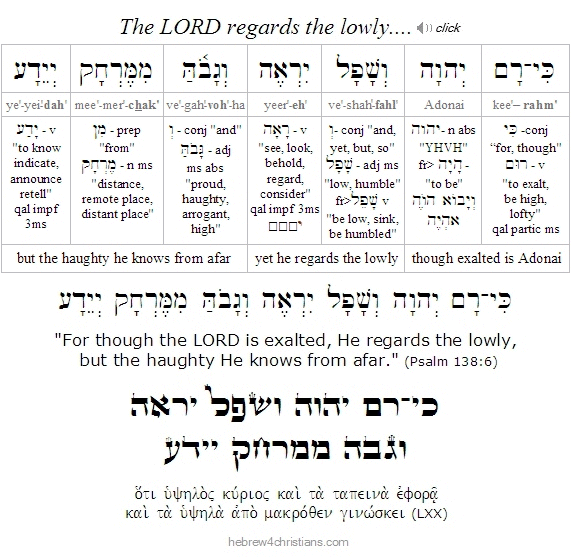 |
Again, just as the LORD made the world yesh me'ayin, "out of nothing," so His creative power continues unchanged. God is able to take a dead heart, a heart of stone, and make it tender and soft through the breath of His Spirit... Therefore His eyes look upon the lowly, the humble, the poor in spirit, but He disregards those who lift themselves up in pride.
Indeed, the LORD resists the proud and repays their scorn with scorn: "With the scorners he is scornful, but to the lowly he gives grace" (Prov. 3:34). Those who mock the idea of sin and arrogantly exalt themselves will be held in derision, but of those who find grace it is written, "Blessed is the man who walks not in the counsel of the wicked, nor stands in the way of sinners, nor sits in the seat of scoffers, but his delight is in the Torah of the LORD, and in His Torah he meditates day and night" (Psalm 1:1-2). Indeed it is a severe mercy, a weighty grace, that is bestowed to us, friends...
Crossing Over to Life...
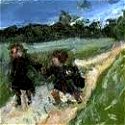
[ The following is related to this week's Torah reading, parashat Lekh-Lekha... ]
10.26.20 (Cheshvan 8, 5781) Our Torah portion this week begins: "Now the LORD said to Abram, "Go (לֶךְ־לְךָ) from your country and your kindred and your father's house to the land I will show you" (Gen. 12:1). The Book of Hebrews comments, "By faith Abraham obeyed when he was called to go out to a place that he was to receive as an inheritance, and he went out, καὶ ἐξῆλθεν μὴ ἐπιστάμενος ποῦ ἔρχεται - "not knowing where he was going" ... for he was looking forward to the city that has foundations, whose designer and builder is God" (Heb. 11:8,10). Abraham closed his eyes to this world and was given the inner light of truth that would reveal his way to God. The Sefat Emet says that every person of faith is likewise commanded daily to "lekh-lekha," to "go for yourself" by crossing over from the world and its deadening habits to live as an exile with God. Paradoxically, we find ourselves when we lose ourselves - when we leave behind the labels, roles, and identities this world foists upon us and instead resolve to seek the promise of God's Kingdom. As Yeshua said, "For whoever will save his life shall lose it, but whoever will lose his life for my sake shall find it" (Matt. 16:25).
Hebrew Lesson:
Psalm 25:12 reading (click):
Note: In a sefer Torah (i.e., a handwritten Torah scroll), Hebrew words are written without vowels, so "lekh lekha" (לך־לך), often translated as "go forth," could be read as "go, go!" - emphasizing the importance of the mitzvah: Get moving! Start walking! Begin your journey!
Parashat Lekh-Lekha...

10.25.20 (Cheshvan 7, 5781) Shavuah tov, chaverim! Last week's Torah portion (i.e., parashat Noach) introduced us to Abram (אַבְרָם), the descendant of Noah's son Shem, who was the great-grandson of the patriarch Methuselah - a man who who personally knew Adam and Eve and upheld the original promise of redemption given in the Garden of Eden. Just as there were ten generations from Adam to Noah, so there were also ten generations from Noah to Abram (see Gen. 11:10-32). And just as Noah became the father of 70 nations, so Abram (through Shem) would become the father of the Jewish people, through whom the Promised Seed - the Messiah and Savior of the world - would eventually come.
In our Torah portion for this week (Lekh-Lekha), we read that Abram was 75 years old, married to (his half-sister) Sarai, and guardian of his nephew Lot (his deceased brother Haran's son) when he received the promise of divine inheritance: "And the LORD said to Abram, "Go from (i.e., lekh-lekha: לך־לך) your country and your kindred and your father's house to the land that I will show you. In Hebrew, the phrase lekh lekha means "go for yourself" (lit. "walk [הָלַךְ] for yourself [לְךָ]"), though it can be interpreted it to mean "go to yourself," that is, "look within yourself" in order to begin walking out your own journey into the promises. The realm of divine promise is only attained when we venture out in faith. Like our father Abraham, we are called to "cross over," leave everything behind, and take hold of God's glorious promise for our lives.
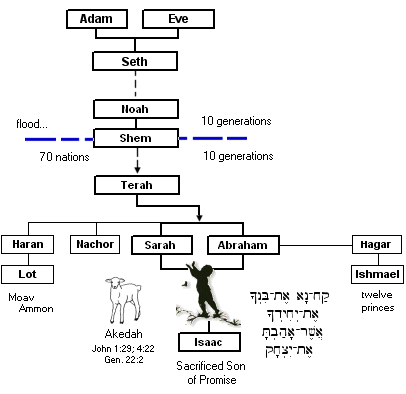 |
Hebrew Lesson:
Genesis 12:1a reading (click):
The Very Heart of Reality…

10.23.20 (Cheshvan 5, 5781) The Scriptures teach us that the most essential truth about life, the "core" of Reality, the very essence of Being itself, is not something objective to be studied (a "what") but Someone intimately to be known (a "Who"), experienced by the revelation of the Heart of God, the Divine Love that is willing to be wounded, to suffer, and even to die for your sake so that you may know that you are beloved, chosen, and treasured of heaven... There are innumerable attributes, names, and titles ascribed to the LORD God in Scripture, but His essence is described as Love itself (1 John 4:16). Indeed, God's heart is the beginning, middle, and end of Reality (אֱמֶת), but if your theology somehow leads you away from this all-encompassing and great truth, you've missed the point of it all... Shabbat shalom, chaverim!
Hebrew Lesson:
Psalm 31:24 Reading (click):
Sin and Despondency...

10.23.20 (Cheshvan 5, 5781) "Whoever battles with monsters had better see to it that it does not turn him into a monster" (Nietzsche). A God-fearing man once complained to a sage that he was tormented by evil desire and had become despondent over it. The sage listened intently and then said, "Guard yourself from such despondency above all else, for it is worse than sin. When the yetzer [evil impulse] awakens desire in us, it is not concerned with plunging us into sin, but with plunging us into despair by way of our sinning."
We recall the words of James the Righteous: "Each person is tempted when he is lured and enticed by his own desire. Then when desire has conceived, it gives birth to sin; and sin when it is fully grown brings forth death. Do not be deceived..." (James 1:14-16). In other words, sin begins with selfish desire, but the "fruit" or "end" of sin is death, understood as separation from life, healing, love, peace, and so on. Sin "crouches" at the door; its desire is for you, but you must master it (Gen. 4:7).
How we choose to think inevitably leads to decisions and actions... In our warfare against the yetzer and the devil, we must be sure to rely upon God's love and grace, lest we find ourselves fighting "evil with evil," thereby amusing the powers of darkness... Tzedek tzedek tirdorf (צֶדֶק צֶדֶק תִּרְדּף) means that we must pursue righteousness righteously (Deut. 16:20). Some people seem to be so afraid that sin and evil will overtake them that they quite forget to exercise caution that they resist sin and evil in sinful ways... May God help us to see our sin and our battle against evil only in the light of His glorious Presence.
 |
Hebrew Lesson:
Psalm 16:8 Shiviti Adonai (click):
Note: The quote (above) comes from Frederick Nietzsche, who was the son of a Lutheran minister (named Carl), but who later fell away from God and went literally insane... I am not endorsing Nietzsche's (anti)theology, of course, though his point that people can become "monsters" over a "cause" is a valid one. Indeed there are entire religions based on the idea that whoever disagrees with their theology ought to be killed... Advocates of such a religion can become monsters for the sake of their religion....
Endurance and Suffering...

10.23.20 (Cheshvan 5, 5781) "Pray that you may never have to endure all that you can learn to bear." Yes, though we must also believe that God "will not let us be tested beyond what we are able to bear, but with the test will also provide the way of escape (τὴν ἔκβασιν) so that we may be able to endure it" (1 Cor. 10:13). Indeed, in light of suffering what we really need is perseverance, or what the New Testament calls hupomone (ὑπομονή), a word that means "remaining [μένω] under [ὑπο]" the Divine Presence while being tested (the English word "suffer" comes from the Latin word sufferre, from sub- (under) + ferre, to carry, and therefore denotes "bearing under" difficulty). Suffering people often do not need moral platitudes or correction from others, but rather the will to believe, the strength to stay constant, and the rise of hope that gives life to simple prayers that focus the heart upon the Lord's Presence: "God have mercy..." "Help me, O God..." "I need Thee, O Lord..." When we receive grace to faithfully suffer, we hear the Spirit whispering back to us: "Be not afraid..." "Live in me..." "Walk in the light..." "I am with you always..." "You are loved..."
רַבּוֹת רָעוֹת צַדִּיק
וּמִכֻּלָּם יַצִּילֶנּוּ יְהוָה
ra·boht · rah·oht · tza·deek
oo·mee·koo-lahm · ya·tzee·le'·noo · Adonai

"Many are the afflictions of the righteous
but the LORD delivers him from them all." (Psalm 34:19)

Hebrew Lesson:
Psalm 34:19 Hebrew reading (click):
Life itself weans us from life as we learn that nothing ultimately belongs to us... We must learn to make peace with our sorrows and disappointments, to let go of them and to accept that this day, despite its frailty and trouble, is a precious gift from above. "My peace I give to you" (שלי שלום אני אתן לך), said Yeshua, "not as the world gives, I give to you" (John 14:27). Not as the world gives... When we let go, when we put everything in God's hands, we acknowledge that all we have is a gift from God. Amen.
Gluttony and Abstinence...

10.23.20 (Cheshvan 5, 5781) We tend to regard "gluttony" as overindulgence in food or drink, but it can also be regarded as any preoccupation that leads to excess. Hence we can become "theologically obese," we can "binge" on religious self-righteousness; we can feed on resentment and be consumed by inner anger; we can bask in apathy, relish greed, lust for the approval of others, wallow in self-pity, obsess over our health, and so on. Similarly, we tend to regard "abstinence" as refraining from feeding our appetites, though it can also be regarded as withholding what we need, denying ourselves tolerance, refusing to forgive ourselves, living under the slavery of perfectionism, legalism, and so on... "We fall not because we are weak, but because we believe ourselves strong."
Hebrew Lesson:
Proverbs 25:28 Hebrew reading (click):
The Friend of Sinners...

10.23.20 (Cheshvan 5, 5781) "The Son of Man came ... and they say, 'Look at him! A glutton and a drunkard, a friend of tax collectors and sinners!'" (Matt. 11:19). People, especially the religious people, were scandalized by Yeshua because he was a "friend of tax collectors and sinners!" Yet what sickness of heart is this, to despise those who are sick? It is a sorrow of heart to realize that religion often creates an "in-group" mentality that attains its status at the expense of the "outsider," the "stranger," the "sinner," and so on... The prayer of the self-righteous is always: 'God, I thank you that I am not like other people: extortionists, unrighteous people, adulterers – or even like this tax collector" (Luke 18:11).
The religious leaders of Yeshua's day were offended because he "welcomed sinners" and enjoyed eating meals with them (Luke 15:2). We can almost hear their disapproving whispers and their dismissive accusations: "How could a good Jew behave like this? Does he not understand the call to personal holiness? Does he not know the Torah of "clean" and "unclean"? If a man is known by the company he keeps, we know enough about Yeshua to know that he's not truly pious..." And to this very day the self-righteous find offensive the idea that God welcomes the sinful, the needy, the broken, the despised, and the "outsider" into His presence... As Yeshua said, "those who are well have no need of a physician," and indeed offering them God's cure will always be regarded as a kind of poison...
We greatly rejoice that God indeed is the friend of sinners; He is the Good Shepherd who seeks and saves the lost. Thank the Lord that he comes not for the "righteous" but for those who are brokenhearted, for those mortally wounded by their own sin... Any so-called theology or religion that repudiates or minimizes God's love for the sinful, the needy, the broken, is little more than a shrine to human pride and vanity... On the contrary: the heart of the Compassionate One always welcomes a sinner who sincerely turns to Him.
Hebrew Lesson:
Psalm 23:3 Hebrew reading (click):
Comfort from our Shepherd...

10.22.20 (Cheshvan 4, 5781) The Spirit of the Lord comforts and reassures those who trust in Him: "My sheep hear my voice, and I know them, and they follow me. And I give them eternal life (חַיֵּי עוֹלָם), and they will never perish - no, never! - and no one will snatch them out of my hand" (John 10:27-28). Note that the Greek grammar in this verse uses a "double negation," which is the strongest way to deny something. In other words, if the question were asked, "Will one of these sheep perish?" the answer is emphatic: "No, no, it will never happen! It is unthinkable!" Indeed all those who belong to Messiah "shall never, ever perish - not into eternity (εἰς τὸν αἰῶνα)." It is an eternal certainty that you who are trusting in Yeshua will never perish, and no power in heaven or earth will be able to take you out of God's hand... "Surely goodness and mercy shall pursue you all the days of your life, and you shall dwell in the Presence of the Lord forever (Psalm 23:6).
Hebrew Lesson:
Psalm 23:6 Hebrew reading (click):
Regarding the certainty of salvation Yeshua said: "I tell you the solemn truth, the one who hears my message and believes in the One who sent me has (i.e., ἔχει, present active indicative) eternal life and will not be condemned, but has passed over (i.e., μετά + βαίνω, lit., "crossed over" [עָבַר]) from death to life" (John 5:24). Note that the verb translated "has passed over" (μεταβέβηκεν) is a perfect active that expresses completed action: "this one has already passed over from death to life." In other words, it is an accomplished spiritual reality though it is only experienced as we surrender to the love and grace of God. As the apostle Paul later summarized: "For it is by grace you have been saved (i.e., σεσῳσμένοι, a perfect passive participle that denotes completed action done on your behalf with effects that continue to the present) through faith, and this not from yourselves, it is the gift of God, not a result of works, so that no one may boast" (Eph. 2:9-10). Ultimately, salvation is a question about who you really are, not about what you do....
God does not want us uncertain or unsure of His great love for us. A fearful believer explained that he was anxious about his acceptance before heaven. When he was asked to define "salvation," he answered, "freedom, deliverance, rest, peace." So you think fear will help you do away with your fear? You are fearful of the idea of freedom from fear?
"Be strong and of good courage" - chazak ve'ematz (חֲזַק וֶאֱמָץ). The LORD God promises "never to leave you nor forsake you," and to be with you wherever you go (Josh. 1:5,9; Heb. 13:15, Psalm 139; Matt. 28:20). In the Greek New Testament the wording of Hebrews 13:15 is highly emphatic: "Not ever will I give up on you (οὐ μή σε ἀνῶ); no, not ever will I leave you behind (οὐδ᾽ οὐ μή σε ἐγκαταλίπω)." May you hear the voice of the Good Shepherd calling you, and may He forever keep you under His watchful care. Amen.
הֲלוֹא צִוִּיתִיךָ
חֲזַק וֶאֱמָץ אַל־תַּעֲרץ וְאַל־תֵּחָת
כִּי עִמְּךָ יְהוָה אֱלהֶיךָ בְּכל אֲשֶׁר תֵּלֵךְ
ha·loh · tzee·vee·tee'·kha:
cha·zak · ve·e·matz · al · ta·a·rotz · ve·al · te·chat
kee ·ee·me·kha · Adonai · E·lo·hey'·kha · be·khol · a·sher · te·lekh

"Have I not commanded you?
Be strong and courageous. Do not be frightened, and do not be dismayed
for the LORD your God is with you wherever you go."
(Joshua 1:9)

Hebrew Lesson:
Joshua 1:9 Hebrew reading (click):
Surrounding Presence...
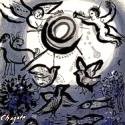
10.22.20 (Cheshvan 4, 5781) The Name of God, YHVH (יהוה), means "Presence" (Exod. 3:13-14), "Breath" (Gen. 2:7; Num. 16:22), "Life" (Deut. 30:20), and "Love" (Exod. 34:6-7), but it also means "I-AM-WITH-YOU-ALWAYS" (אני תמיד איתך), teaching us that God is an ever-present help for us (Psalm 46:1). The Name YHVH means that "God was (i.e., hayah: היה), God is (i.e., hoveh: הוֶה), and God always will be (i.e., veyihyeh: וְיִהְיֶה)," which implies that He is ever present and not restricted by time or space. Moreover, God is called havayah (הֲוָיָה), which means He is continually sustaining creation by the Word of His power: "In Him we live, move, and have our being" (Acts 17:28; Heb. 1:3). As it is poetically expressed in the Psalms, "Behind and before you cover me; You lay your hand upon me" (Psalm 139:5):
אָחוֹר וָקֶדֶם צַרְתָּנִי
וַתָּשֶׁת עָלַי כַּפֶּכָה
a·chor · va·ke'·dem · tzar·ta'·nee
va·ta'·shet · a·lai · ka·pe'·khah

"Behind and before You cover me;
You lay your hand upon me."

Download Study Card
"Behind and before you cover me." The word "behind" translates the adjective achor (אָחוֹר), a word related to the word acharon (אַחֲרוֹן), "west," though it also refers to something later (אַחֲרֵי), such as a later place or time (אַחֲרִית). In Hebrew, the word generally means "backward" (לאחור) or "behind" (מאחור). God's got your back, friend... Note further that the word translated "before" is kedem (קֶדֶם), a preposition that means "east" but also refers to the primordial beginning, the dawn. The root verb kadam (קָדַם) means to "meet" in initial contact. God is always present for you, friend, and that includes times and days that lie ahead, in the distant future... "As far as the east is from the west," so far does God's compassion and love cover you, surround you, and sustain you (Psalm 103:12).
Hebrew Lesson:
Psalm 139:5 Hebrew reading (click):
"You cover me." The verb tzartani (צַרְתָּנִי) comes from the root tzur (צור) that means to encircle, to press upon, to "pressurize," as by relentlessly attacking a stronghold. The image is that God "hems us in," that is, He surrounds us and shelters us with His Presence – so that we cannot escape: You are under God's supervision and protection, friend... And while the root tzur can imply tzuris (trouble, affliction), in this context it is used to picture the Lord securing our station, preserving, protecting, and defending our way. "You lay your hand upon me." God's personal and providential hand is at work in your life – He is HaMashgiach hagadol (הַמָּשְׁגִיחַ הַגָּדוֹל) - the Great Overseer of the universe, and that means your way is as sure and secure as the very power that God's own will affords. Amen.
כִּי־טוֹב יְהוָה לְעוֹלָם חַסְדּוֹ
וְעַד־דּר וָדר אֱמוּנָתוֹ
kee-tov · Adonai · le·o·lahm · chas·do
ve·ad-dor · va·dor · e·moo·na·to

"For the LORD is good; His steadfast love is eternal;
His faithfulness is for all generations." (Psalm 100:5)
Download Study Card

Hebrew Lesson:
Psalm 100:5 Hebrew reading (click):
The Greatness of Noah...

[ The following is related to our Torah reading for this week, parashat Noach... ]
10.22.20 (Cheshvan 4, 5781) Despite the fact that Torah plainly describes Noach as אִישׁ צַדִּיק / ish tzaddik: "a righteous man," "blameless in his generation" (תָּמִים הָיָה בְּדרתָיו), and a man who "walked with God" (אֶת־הָאֱלהִים הִתְהַלֶּךְ־נחַ), Jewish tradition takes a somewhat ambiguous view of him, especially when he's compared to Abraham, the father of the Jewish people... In the Midrash Tanchuma (מדרש תנחומא), for example, it is said that Noach was righteous in his generation -- though he would not be so regarded in other generations. In other words, Noah was "relatively righteous" compared to the world at large, at least according to sages like Rashi, Maimonides, etc. However such an assessment is surely unfair, lashon ha'ra, and even chillul HaShem. After all, is not Noah one of the greatest examples of a person of faith given in the Torah? He was a descendant of the godly line of Seth who lived in a world filled with rampant and unbridled wickedness (Gen. 6:5), and yet he found grace in the eyes of the LORD (מָצָא חֵן בְּעֵינֵי יְהוָה) because of his faith as he walked with God (Gen. 6:8-9). Indeed the very first time the word "grace" (חֵן) appears in the Torah concerns Noah: "Noah found grace in the eyes of the LORD" (מצא חן בעיני יהוה) -- a phrase later ascribed to the great prophet Moses himself (Exod. 33:12, 17).
Hebrew Lesson:
Genesis 6:8 Hebrew reading (click):
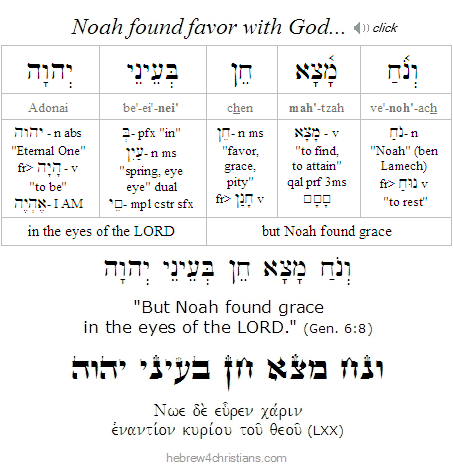 |
Moreover the New Testament affirms Noah's greatness as a tzaddik: "By faith Noah, when he was warned about things not yet seen, with reverent regard constructed an ark for the deliverance of his family. Through faith he condemned the world and became an heir of the righteousness that comes by faith" (Heb. 11:7). Noah was a "preacher of righteousness" (δικαιοσύνης κήρυκα) who faithfully completed the incredible task of constructing an enormous ark (תֵּבָה) to deliver life from God's judgment (2 Pet. 2:5).
Hebrew Lesson:
Genesis 6:9b Hebrew reading (click):
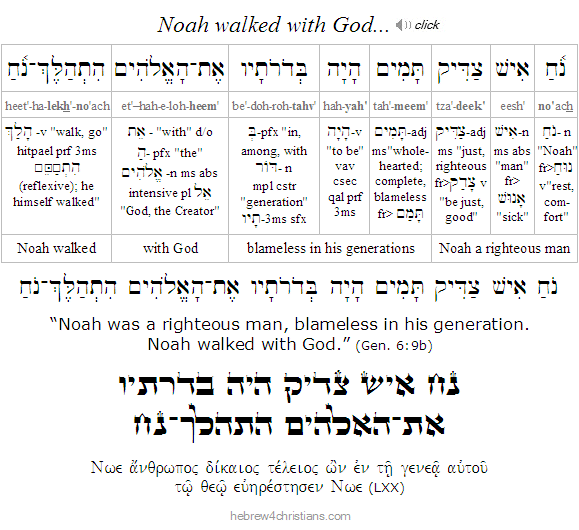 |
The "ark" (i.e., teivah: תֵּבָה) that Noah built was not a ship that had a rudder but was a box-shaped vessel designed simply to rise above the deluge of the flood (מַבּוּל) to be carried up by God's providence. Spiritually understood, then, an "ark" represents a vessel completely surrendered to God's care, and the "Torah of the Ark" (תּוֹרַת הַתֵּבָה) teaches that we must cast ourselves upon the waters of the Father's great mercy (אֲבִי הָרַחֲמִים) and completely trust that He will guide our passage through the storms of this life (1 Pet. 5:7).
Noah trusted in the unseen love and care of his Heavenly Father, despite circumstances that were incomprehensibly dreadful... Like all the other tzaddikim, Noah "walked by faith, not by sight" (2 Cor. 5:7) while looking forward to a "new heavens and earth" (2 Pet. 3:11-15). Yes, of course father Abraham was a marvelous tzaddik who was greatly tested when he offered his beloved son of promise during the Akedah, trusting in the LORD's heart and good will to rectify all things, but we should not underestimate the greatness of Noah's faith, as he labored for over 100 years building the ark without any physical evidence that the great cataclysm would come. Moreover, it would do well for the rabbis to celebrate Noah's example and to remember that Abraham himself owes his life to Noah's obedience of faith, since Abraham is a direct descendant from Noah through his son Shem (Gen. 11:10-32).
The story of Noah reminds us that the great Day of the Lord (יוֹם־יְהוָה הַגָּדוֹל) will surely come (2 Pet. 3:10) and indeed is drawing near (Zeph. 1:14). Yeshua himself forewarned that the spiritual condition of the world would be one of anarchy and moral chaos wherein the wickedness of humanity would be great, and that "every design of the thoughts of people's minds would be full of evil continually" (Gen. 6:5). As in the days of Noah, in the midst of worldwide corruption, our Messiah will return in final judgment (Matt. 24:37-38; Luke 17:26-27). Maranatha - Even so, come Yeshua Adoneinu...
Hebrew Lesson:
Zephaniah 1:14a Hebrew reading (click):
Our Daily Deliverance...
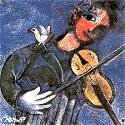
10.21.20 (Cheshvan 3, 5781) Just as we are to ask God for daily bread (לֶחֶם חֻקֵּנוּ), so we are to ask for daily deliverance: "Lead us not into temptation, but deliver us (חַלְּצֵנוּ) from evil" (Matt 6:13). Note that the term translated "evil" in many translations ("deliver us from evil") is a substantive rather than an adjective: τοῦ πονηροῦ, the evil one... "Give us this day our daily deliverance from the evil one...." Our daily bread and our daily deliverance are connected with our decision to "choose life" (בַּחַרְתָּ בַּחַיִּים) -- and to always choose life -- even in moments we find difficult, distressing, and even when we might wish that we were no longer living... Choosing life means refusing to escape reality by evading the significance of our choices; it means finding the will to regard life as worthy; it implies that we will eat our bread in trust that the Lord is at work even in the darkest of hours (Passover occurred at midnight)... Choosing life means refusing to eat the fruit of death and to seek Yeshua, the Tree of Life. We live one day at a time; we only have today. We are given daily bread for this hour of our need. Today is the day of your deliverance - if you are willing to walk in it. Therefore, the Spirit of the Living God cries out, "Choose life and live!"
Hebrew Lesson:
Deut. 30:19b Hebrew reading (click):
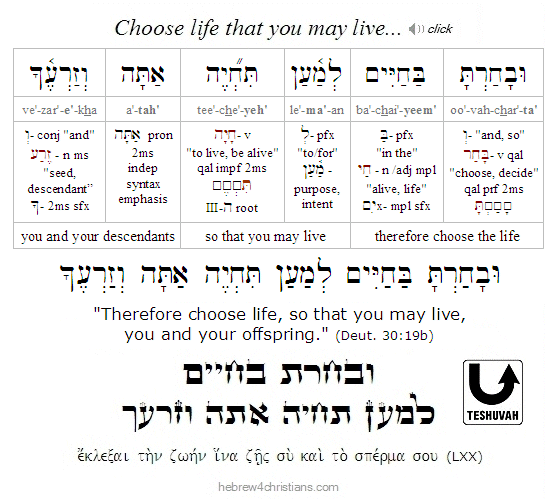 |
As in the days of Noah...

10.21.20 (Cheshvan 3, 5781) "For as were the Days of Noah (ימֵי נחַ), so shall be the coming of the Son of Man. For as in those days before the flood they were eating and drinking, marrying and giving in marriage, until the day when Noah entered the ark, and they were unaware until the flood came and swept them all away (οὐκ ἔγνωσαν ἕως ἦλθεν ὁ κατακλυσμὸς καὶ ἦρεν ἅπαντας). Likewise, just as it was in the days of Lot - they were eating and drinking, buying and selling, planting and building, but on the day when Lot went out from Sodom, fire and sulfur rained from heaven and destroyed them all - so will it be on the day when the Son of Man is revealed" (Matt. 24:37-9; Luke 17:26-30).
Hebrew Lesson:
Matthew 24:37 Hebrew reading (click):
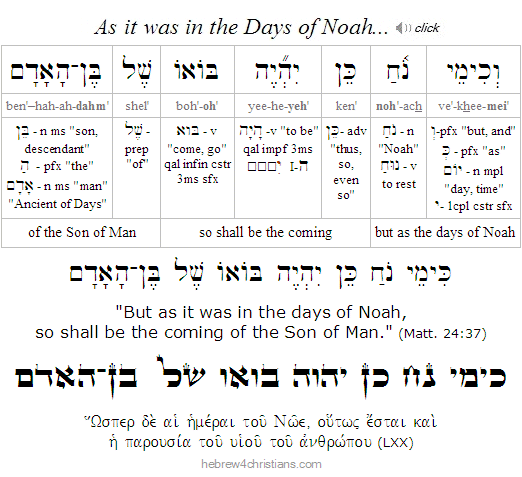 |
So what were these "Days of Noah" like? What can we say about the "Generation of the Flood"? Yeshua explained that the "days of Noah" were marked by people who were asleep, blind, and unaware (ἔγνωσαν, "agnostic"). They went about their business willfully ignorant of the spiritual reality around them (Matt. 24:39). For ten consecutive generations -- from the creation of Adam until the generation of Noah -- people progressively became more and more ignorant of spiritual reality and truth. Eating and drinking, romantic intrigue and marriage, buying and selling, and other worldly affairs were the preoccupations of the day. In short, people lived their lives entirely oblivious to the spiritual reality all around them. They "forgot" who God was, who they were, why they existed, and where they were going. In short, they were spiritually asleep, living a nightmare, and "unaware."
The deadening effects of sin leads to moral and spiritual blindness that leads to corruption and unthinking cruelty and violence. Of Noah's generation it was written that "the whole earth was corrupt before God, and filled with violence" (Gen. 6:11). Rashi understood the word "corruption" (shachat) to primarily refer to sexual immorality (i.e., idolatry) and "violence" (chamas) to primarily refer to theft and robbery. In general, however, the sages regarded the word chamas to refer to lawlessness, that is the denial of Torah, and consequently the benighted condition of living without yirat ha-shamayim (awe of heaven). When people are spiritually dead, they are unconscious of the wonder of God; oblivious to what is real; and they are consequently debased into animals... We see that in our world today.
Hebrew Lesson:
Gen. 6:11 Hebrew reading (click):
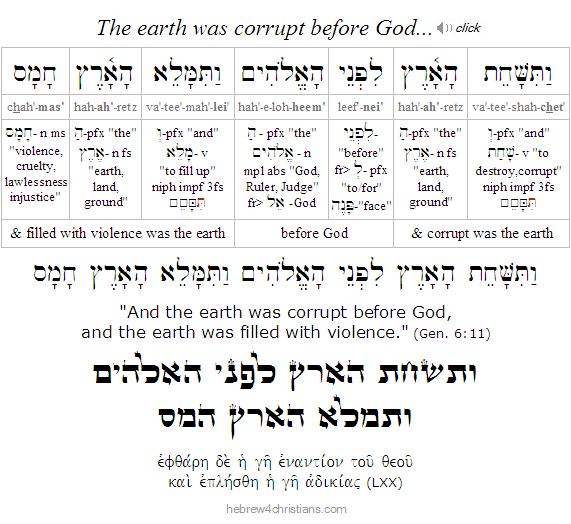 |
Some of the sages think that God's judgment came in stages. The Great Flood was preceded by four successive generations of prophets that warned of the coming cataclysmic judgment: Enoch, Methuselah, Lamech, and finally Noah. It is fascinating to understand that Adam himself was alive when Noah's grandfather Methuselah was born, so the original message of teshuvah (repentance) was an echo that came from Eden itself; moreover, consider that Abraham personally knew of Noah (Abraham was 58 years old when Noah died), and undoubtedly Noah's son Shem told him of his grandfather Lamech, who had seen and spoken with Adam who was directly created by God alone. Later, Abraham's son Isaac also came to know Shem, Noah's firstborn son, and the legacy of the "gospel of the garden" was thereby passed on...
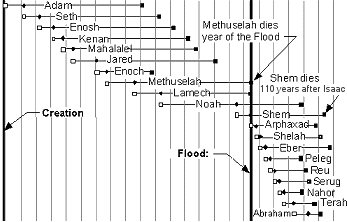 |
The first stage was the abandonment of the inherent dignity of others as people created in the image of God. This negation of the divine characteristics of people led to sexual promiscuity that became rampant upon the earth: "The sons of God saw the daughters of man that they were fair, and they took for themselves wives, whomsoever they chose" (one midrash claims that the Dor HaMabul, the generation of the flood, would regularly exchange marital partners). God then gave mankind 120 years to repent from his sexual corruption or be faced with apocalyptic destruction (Gen. 6:3). Despite Noah's 120 year public building project and the preaching of his grandfather Methuselah, God's patience finally ran out (1 Pet. 3:20). God then "saw that the wickedness of man was great in the earth and that every imagination of the thoughts of his heart was only evil continually" (Gen. 6:5). Mankind refused to repent and turn to God....
There is a tragic progression at work here. The practice of "casual" acts of lawlessness eventually led to the acceptance and practice of sexual promiscuity. This, in turn, resulted in the loss of mankind's sanctity (kedushah), since this derives from man's ability to subordinate his instinctual/emotional desires to his intellectual/spiritual life. Genuine sanctity refuses to exploit others as means to an end. Disregarding truth cheapens and impairs a sense of self, causing disintegration of spiritual life and depersonalization of others. As humanity became more and more fractured and stupefied, God's "like for like" judgment resulted in "giving them over" (paradidomi) to the lusts of their hearts (Rom. 1:26). (In our culture of unbridled pornographic expression and sexual immorality, we mirror this antediluvian world view. Indeed, it is a mark of our age to be enamored with "degrading passions," with gender confusion and regularly practiced idolatry (i.e., fornication, adultery, homosexual relationships, and so on)). The final verdict of this practiced chamas (lawlessness) was the bestowal of a "depraved mind" (αδοκιμον νουν), a condition of being unable to reason properly at all. Since truth is essentially (and necessarily) grounded in a sense of value, and value is a function of conscience, a depraved mind is literally insane from a spiritual perspective... People devoid of conscience are unable to reason along the lines of ethical truth at all. This promoted a cultural collusion to suppress the truth, to silence the truth-tellers, to kill the prophets, and to gag advocates for justice. Lawlessness squelches the inward voice of right and wrong within the human heart.
We are in the Days of Noah...
"But understand this, that in the last days perilous times will come. For people will be lovers of self, lovers of money, proud, arrogant, abusive, disobedient to their parents, ungrateful (ἀχάριστος), unholy (ἀνόσιος), heartless (ἄστοργοι), unappeasable (ἄσπονδος), slanderous (διάβολος), without self-control (ἀκρατής), brutal (ἀνήμερος ), despisers of what is good (ἀφιλάγαθος), treacherous (προδότης), quick to do evil (προπετής), swollen with conceit (τυφόω), lovers of pleasure rather than lovers of God, having the form (μόρφωσις) of godliness but denying its reality (δύναμις)." 2 Tim. 3:1-5
"Everyone then who hears these words of mine and does them will be like a wise man who built his house on the rock. And the rain fell, and the floods came, and the winds blew and beat on that house, but it did not fall, because it had been founded on the rock. And everyone who hears these words of mine and does not do them will be like a foolish man who built his house on the sand. And the rain fell, and the floods came, and the winds blew and beat against that house, and it fell, and great was the fall of it." - Yeshua (Matthew. 7:24-27)
May the LORD Yeshua help us to take refuge in Him.
Idolatry and Rage...

10.20.20 (Cheshvan 2, 5781) We are warned not to destroy ourselves by allowing bitterness, anger, or fear to consume our hearts. In the Torah we read: "And you shall not bring an abominable thing (תּוֹעֵבָה) into your house and become devoted to destruction like it" (Deut. 7:26). The sages of the Mishnah said that yielding to rage is equivalent to idol worship and should never be brought into the home. Indeed, rage is linked with avodah zarah - idolatry - because it exalts the ego and claims that God can't (or won't) help you in your moment of testing or need. Being quick to anger reveals the presence of foolishness within the heart:
Hebrew Lesson:
Ecclesiastes 7:9 Hebrew reading (click):
Hebrew Lesson:
Psalm 14:1 Hebrew reading (click):
The Scriptures affirm, however, that "there is no test given to you that you cannot handle with God's help" (1 Cor. 10:13), and that you are personally invited to come boldly before the Divine Presence to find just such help in your time of need (Heb. 4:16). Believing that you can't overcome your fear or anger problem is therefore a form of idolatry. As is written: Lo yiheyeh vekha el zar (לא־יִהְיֶה בְךָ אֵל זָר) -- "there shall be no foreign god within you" (Psalm 81:9), which means that we must expressly deny the ego's demand to have its will be done (even if that demand is to cling to indignation or fear). Being full of a sense of self-importance is to be enslaved to vanity and to have a foreign god "within you." God and human arrogance cannot coexist - since the inner world of the arrogant person denies God's rightful place as King. As it is written in our Scriptures: "The wrath of man (קֶצֶף אָדָם) does not work the righteousness of God" (James 1:20). God will indeed help us if we ask according to his will (1 John 5:14-15). Thank you, God. "Blessed is the LORD who delivers us from self-destruction." Amen.
Hebrew Lesson:
Blessing for Deliverance... (click):
בָּרוּך יהוה שֶׁמַצִיל אוֹתנוּ
מֵהַרֵס עַצְמִי
ba·rookh · Adonai · she·ma·tzeel
oh·tah'-noo · mei·ha-reis · atz·mee

"Blessed is the LORD who delivers us from self-destruction."
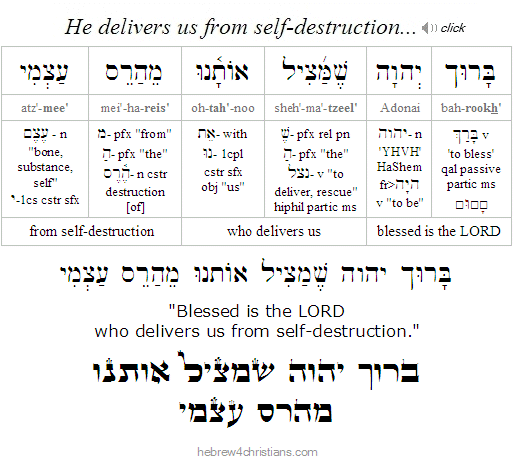
Hope, despite ourselves...

10.20.20 (Cheshvan 2, 5781) We must give our secret pain to God, even if we don't understand it, and even if it refuses to go away... Our hearts are often vexed; we are a mess of mixed motives; we are "strong to be made weak, weak to be made strong." Blessings and curses come from the same mouth... And yet, despite all this, despite our inner contradictions, the battle between the "old man" and the "new," this "divided house" of our inner life - our sorrows, our troubles, our fears – we must endure ourselves, we must press on, and we must never let go of hope in God's love. Never. Therefore we must not hide from God's presence, nor pretend to be something we are not. We are invited to come boldly before the throne of God's loving grace to receive help in our hour of need (Heb. 4:16). O Lord who makes me whole, "heal me, O LORD, and I shall be healed, save me, and I shall be saved, for your are my praise" (Jer. 17:14). O LORD, forgive our sins and heal us of our wounds, or, at least help us to endure suffering with special grace to keep us from being distracted from the truth and glory of your Presence... Grant us strength to abide in your hope, until the last day, to keep watch for the ready hand of Your love... As we go from place to place, from this moment to the next, help us to behold the Sun of Righteousness that pervades our way. Amen.
רְפָאֵנִי יְהוָה וְאֵרָפֵא
הוֹשִׁיעֵנִי וְאִוָּשֵׁעָה כִּי תְהִלָּתִי אָתָּה
re·fa·ei'·nee · Adonai · ve·ei·ra·fei
ho·shee·ei'·nee · ve·ee·va·shei'·ah · kee · te·hee·la·tee · a'·tah

"Heal me, O LORD, and I shall be healed;
save me, and I shall be saved, for you are my praise."
(Jer. 17:14)
Hebrew Study Card

Hebrew Lesson:
Jeremiah 7:14 Hebrew reading (click):
The fact that God knows the number of hairs on your head means that he knows you better than you know yourself... Your heavenly Father "sees in secret," and that also means that he can and will save you from whatever is hidden within you that still resists his love and touch... We have to trust in God's power to heal us, even when it seems that healing is not forthcoming, even when we still find ourselves divided, troubled, and anxious. We have to believe that God's help is always present. "Be strong, and let your heart take courage, all you who hope for the LORD."
God sees what He does within us, His "it-is-finished" work, the effect of His great salvation within our hearts, even if at this present hour this may be hidden from our eyes... There is appearance, and there is reality; and only God sees what is ultimately real. We have to trust in His promise to be transformed into the divine nature, even if today we find ourselves sinful, needy, and in disrepair... By God's grace we are what we are. So don't give up. We are saved by hope (ἐλπίδι ἐσώθημεν, Rom. 8:24), a hope for you today.
Shelter of Light...
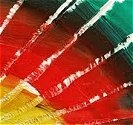
10.20.20 (Cheshvan 2, 5781) The sages say, "in the world to come (הַעוֹלָם הַבָּא), God will bring the sun out of its sheath to burn the wicked; they will be judged by it, but the righteous will be healed by it' (Shemot Rabbah). Yeshua is compared to the "Sun" because as the Sun is the central luminous body of our world, so Yeshua is called the "Light of Life" (אוֹר הַחַיִּים). Yeshua is melech ha-kavod (מֶלֶךְ הַכָּבוֹד), "the King of Glory" -- and no one can stand before the blinding power of His countenance (Psalm 27:4; Rev. 1:8-19). His is the "Fountain of Light" for all of creation, the Source and End of all life: "For by Him all things were created, in heaven and on earth, visible and invisible, whether thrones or dominions or rulers or authorities -- all things were created through Him and for Him. And he is before all things, and in him all things hold together... that in everything He might be preeminent" (Col. 1:16-18). Yeshua is the "Sun of Righteousness," shemesh tzedakah (שֶׁמֶשׁ צְדָקָה), who comes "with healing in his wings" -- that is, in healing radiance, with rays and beams, which metaphorically describe His influence over the hearts of men... Note that the word for "wings" used in this passage (i.e., kanaf: כָּנָף) pictures the image of a heavenly tallit (טַלִּית), or the heavenly firmament (רָקִיעַ) of the LORD's sheltering Presence.
Amen, there is a future time of healing and deliverance coming to us, though we must abide in the shadow of its substance for a bit longer: "For behold, the Day is coming (הַיּוֹם בָּא), burning like an oven, when all the arrogant and all evildoers will be stubble. The Day that is coming shall set them ablaze, says the LORD of hosts, so that it will leave them neither root nor branch. But for you who fear my Name, the Sun of Righteousness (שֶׁמֶשׁ צְדָקָה) shall rise with healing in its wings. You shall go out skipping like calves released from the stall. And you shall tread down the wicked, for they will be ashes under the soles of your feet, on the day when I act, says the LORD of hosts" (Mal. 4:1-3).
Hebrew Lesson:
Proverbs 18:20 Hebrew reading (click):
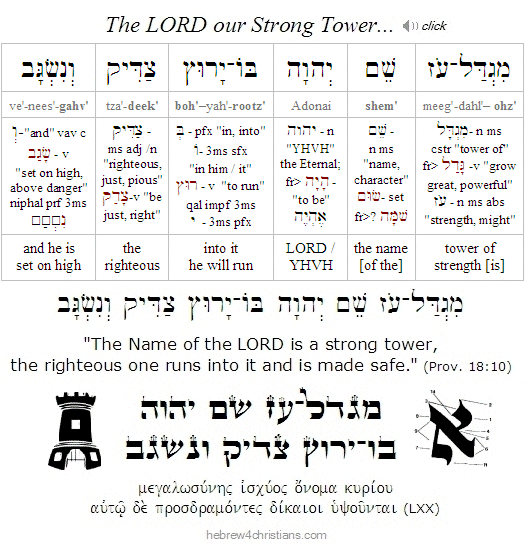 |
The Root of Sin and Death...
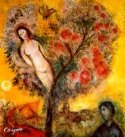
[ The following is related to last week's Torah portion, parashat Bereshit... ]
10.19.20 (Cheshvan 1, 5781) The commandment prohibiting eating from the Tree of Knowledge of good and evil (עֵץ הַדַּעַת טוֹב וָרָע) contained all other Torah commandments by implication (Gen. 2:17). The commandments not to worship idols, not to curse God, not to steal, not to kill, not to commit adultery, not to covet, and to enforce justice all derive from this primary commandment given in the garden. After all, Adam lost awareness of God by focusing on himself (idolatry) and failed to express love and reverence for God (profanity); he took from the Tree what was forbidden (coveting/stealing) which led to his own death (killing) and his own inner promiscuity (adultery). He failed to be vigilant and exercise justice by removing the presence of the tempting snake... Notice how these implications form the basic categories of the Ten Commandments, as well as the 613 commandments given later at Sinai. Looked at the other way, all of the commandments of Torah were concentrated into this single prohibition, since had Adam refrained from eating, he likewise would have refrained from all the other sins derived from this first great transgression. Moreover, since the essence of Torah is to trust God (i.e., "the righteous shall live by his faith"), when Adam sinned, he lost faith and the exile began... The Tree of Knowledge of good and evil is really the tree of the knowledge of sin and death. Just as the law defined sin to reveal our lethal spiritual condition, so the Tree of Knowledge led to the consequence of death and the revelation of our need for healing and deliverance given by Yeshua. "The law of the Spirit of life sets you free in Yeshua the Messiah from the law of sin and death" (Rom. 8:2).
The root of sin and death is found in the desire for "the knowledge of good and evil," that is, by seeking that which what defines sin, or that which is not God's will... It is the attempt to transcend God's authority for something beyond his sovereign will for us, and as such it denies reality and leads to exile and death. In this connection note that the Hebrew phrase that warns of the consequence of eating from the Tree is mot tamut (מוֹת תָּמוּת), meaning "in dying you will die," which both implies the spiritual nature of death as separation from the divine life, but also the repeated experience of death – ongoing decay, dissolution, and loss... Spiritual death is the underlying problem for humanity, and healing is found only one way.
Hebrew Lesson:
Proverbs 16:25 Hebrew reading (click):
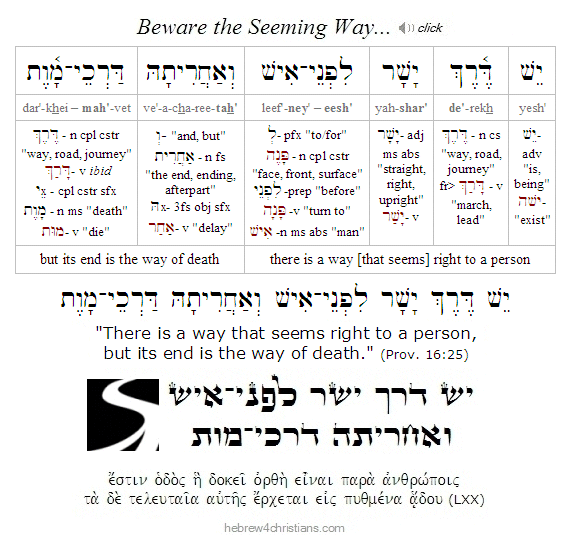 |
Seeing the yet-unseen...
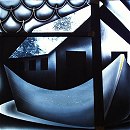
[ The following entry concerns this week's Torah reading, parashat Noach... ]
10.19.20 (Cheshvan 1, 5781) Just as Noah foresaw the great cataclysm to come, so we are to understand that the world above our heads and under our feet is destined to destruction, as we likewise await the promised world to come: "Lift up your eyes to the heavens, and look at the earth beneath; for the heavens vanish like smoke, the earth will wear out like a garment, and they who dwell in it will die in like manner; but my salvation will be forever (וישׁוּעָתִי לְעוֹלָם תִּהְיֶה), and my righteousness will never be dismayed" (Isa. 51:6).
This idea is repeated in the New Testament: "For as were the days of Noah, so will be the coming of the Son of Man" (Matt. 24:37). "But the Day of the LORD will come like a thief, and then the heavens will pass away with a roar, and the heavenly bodies will be burned up and dissolved, and the earth and the works that are done on it will be exposed. Since all these things are thus to be dissolved, what sort of people ought you to be in lives of holiness and godliness, waiting for and hastening the coming of the Day of God, because of which the heavens will be set on fire and dissolved, and the heavenly bodies will melt as they burn? But according to his promise we are waiting for new heavens and a new earth in which righteousness dwells. Therefore, beloved, since you are waiting for these, be diligent to be found by him without spot or blemish and at peace" (2 Pet. 3:10-14).
In light of all this, we look not to the things that are seen but to the things that are unseen. "For the things that are seen are transient, but the things that are unseen are eternal... For the invisible things of Him from the creation of the world are clearly seen, being understood by the things that are made, even his eternal power and Godhead. Therefore we are strangers and exiles on the earth, looking forward to the city that has foundations, whose designer and builder is God" (2 Cor. 4:18; Rom. 1:20; Heb. 11:10,13).
Faith sees the invisible; it reckons and thereby apprehends God's promise as a present reality... Our father Abraham was promised descendants as numerous as the stars in the sky or sand on the seashore, despite the fact that he was an old man and his wife had long past the age of bearing children. Abraham believed in the One who gives life to the dead and - καλοῦντος τὰ μὴ ὄντα ὡς ὄντα - "calls into existence the things that do not exist as existing" (Rom. 4:17). "He staggered not at the promise of God through unbelief but was strong in faith, giving glory to God; and being fully persuaded that, what He had promised, He was able also to perform: And therefore it was imputed to him for righteousness" (Rom. 4:19-22).
Hebrew Lesson:
Genesis 15:6 Hebrew reading (click):
Parashat Noach (פרשת נח)

[ The following entry concerns this week's Torah reading, parashat Noach... ]
10.18.20 (Tishri 30, 5781) Chodesh tov, chaverim. Last week's Torah portion (Bereshit) showed how the mutiny of Adam and Eve caused humanity to plunge into idolatrous chaos. The subsequent generations lost sight of the LORD and became progressively steeped in moral anarchy and bloodlust, so that "every intention of the thoughts of man's heart was only evil continually" (Gen. 6:5). After just nine generations, the LORD had grown so weary of humanity that he "regretted" (i.e., yinchem: יִּנָּחֶם) creating man and "his heart was grieved" (Gen. 6:6). However, God recognized Noach (from the godly line of Seth) as a tzaddik (צַדִּיק), a righteous man of faith, and graciously made provision to save him from the wrath to come....
Noah's father Lamech (לֶמֶךְ, "powerful one") regarded his son as a deliverer who would comfort humanity from the ravages of the original curse (Gen. 5:29). Noach would give rest (נוּחַ) from the toil and vexation of life. Symbolically Noah was a "type" of the Savior to come who would rebirth the world by giving lasting comfort and rest (for more on this, see the page "Noah and Jesus"). In like manner it was prophesied that Yeshua would give us everlasting rest: "His rest shall be glorious" (Isa. 11:10), just as He offers rest to the weary (Matt. 11:28, Heb. 4:9). His sacrifice on the Cross at Moriah undoes the kelalah (curse of work) over the children of Adam. Indeed, His life, sacrifice, and resurrection was like a "magic spell" that "spoke backwards" the sin of the "First Adam" - and by means of His deliverance the power of the curse is forever broken (see Gal. 3:13, John 3:14, 2 Tim.1:10; Heb. 2:14; Heb. 9:27-28; 1 John 3:8, Rev. 22:3). Yeshua is Adam ha-Sheni - the "Second Adam" - the promised Son of Man. By means of His Spirit we are given an everlasting comfort (John 14:16).
Eschatologically, the "days of Noah" present a picture of the idolatrous conditions of the world that will prevail just before the calling up of the followers of Yeshua before the time of Great Tribulation upon the earth: "As were the days of Noah, so will be the coming of the Son of Man" (Matt. 24:37). The generation of the Flood was said to be "filled with violence" (Gen. 6:13) caused by ignorance -- literally the "state of ignoring" moral and spiritual truth. Because people willingly disregarded God from their midst, they arrogated to themselves divine prerogatives: "every man did what was right in his own eyes." The resulting moral corruption and anarchy led to divine and catastrophic judgment: the world returned to its primordial state of tohu va'vohu v'choshekh: "confusion and emptiness and darkness" (Gen. 1:2). Notice, however, that despite the godlessness and lawlessness that prevailed, the "days of Noah" were not marked by overt "tribulation," since people were eating and drinking, marrying and giving in marriage, until the day that Noah entered into the ark, "and they were unaware" (καὶ οὐκ ἔγνωσαν) until the flood came and swept them all away -- so will be the coming of the Son of Man (see Matt. 24:38-39). In other words, the "end of the world" judgment fell suddenly and took them by surprise...
The seven day warning given to Noah further suggests the seven year tribulation period to come (Daniel's 70th week), and also the "rapture" of the people of God who will be carried above the prophesied worldwide cataclysm. Just as God protected Israel during the time of judgment upon Egypt, so He will protect His people from the wrath of the "great Day of the LORD." But please note that "the LORD shut him in" (Gen. 7:16). Noah's teivah (ark) had God Himself as its designer (Gen. 6:15f), just as salvation in Messiah is by God's design (Jonah 2:9; Eph. 1:9, 1:11). It contained only one door (Gen. 6:16), just as Yeshua is the only door to salvation (John 10:9; 14:6). Noah's ark contained three levels (Gen. 6:16) and salvation has three own experiential levels (2 Cor. 1:10): past, present, and future. In the past (at Moriah) Yeshua delivered us from the penalty of sin; in the present, He is delivering us from the power of sin; and in the future He will deliver us from the very presence of sin. Baruch Hashem - may that day come soon!
Hebrew Lesson:
Genesis 6:9b Hebrew reading (click):
It sometimes surprises me that people who claim to follow the LORD can get so "triggered" (offended) about the timing of Yom Adonai (the Day of the LORD) and chevlei Mashiach (the tribulation) that they choose to hate other followers of Yeshua. What shandeh and chillul HaShem! Look, the "End of the World" is the day you will die to face God to give account of your life. You argue over incidentals and ignore the deeper fact that God will guide his children through whatever comes their way to bring them back home. You may disagree with the timing of the "rapture" or some other matter of eschatology, but you are forbidden to despise your brothers and sisters or to mock them. Be careful not to confuse your pride for the love of the truth; truth used as a weapon is not truth: even the devil quotes Scripture.
Chodesh Cheshvan....
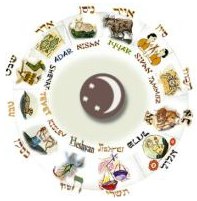
10.18.20 (Tishri 30, 5781) On the Biblical calendar, the month of Cheshvan (חֶשְׁוָן) immediately follows the "holiday month" of Tishri, and begins Friday, October 21st (at sundown) this year. The Torah records that God brought down the Great Flood that destroyed the world on Cheshvan 17 (Gen. 7:10-11), which lasted until Cheshvan 27 (Gen. 8:14) - exactly one calendar year after it began (Rashi notes that the 11-day discrepancy between the 17th and 27th represents the 11-day difference between the solar and lunar calendar year). Because Noah's Flood began and ended during this month, Cheshvan is generally regarded as "mar" - a time of judgment, especially regarding water (rain). Cheshvan always has a two-day Rosh Chodesh. Because rain is central to the health of the spring crops, on the 17th of the month those living in Israel begin requesting rain by adding vetein tal u'matar librakha ("and grant dew and rain for blessing") to the Amidah prayer.
יְהִי רָצוֹן מִלְּפָנֵיךָ יהוה אֱלהֵינוּ
וֵאלהֵי אֲבוֹתֵינוּ שֶׁתְּחַדֵּשׁ עָלֵינוּ חדֶשׁ טוֹב
בַּאֲדנֵינוּ יֵשׁוּעַ הַמָּשִׁיחַ אָמֵן
ye·hee · ra·tzohn · meel·fah·ney·kha · Adonai · E·lo·hey·noo
vei·loh·hey · a·voh·tey·noo · she·te·kha·deish · ah·ley·noo · khoh·desh· tohv
ba'a·doh·ney·noo · Ye·shoo·a' · ha·mah·shee·akh · a·mein

"May it be Your will, LORD our God and God of our fathers,
that you renew for us a good month in our Lord Yeshua the Messiah. Amen."

Download Study Card
Our Father, Our King...

10.16.20 (Tishri 28, 5781) "Blessed are you, O LORD God of Israel our Father, forever and ever. Yours, O LORD, is the greatness and the power and the beauty and the victory and the majesty, for all that is in the heaven and in the earth is yours. Yours is the kingdom, O LORD, and you are exalted as head above all" (1 Chron. 29:10-11). Amen, amen. In light of this blessed truth, then, what is it but unbelief that incites us to fear, to become anxious, frustrated, angry, and to seek to control outcomes? Forgive us, O Lord: We sometimes fail to remember your greatness; we lose sight that you indeed reign over all; our fears moves us into exile, our hearts grieve when we find ourselves immersed in the vanity of this world... But "all that is in heaven and earth is thine" (כּל בַּשָּׁמַיִם וּבָאָרֶץ לְךָ), and therefore everything is under your ongoing supervision... You sustain and uphold all things by the Word of your Power (נוֹשֵׂא כל בִּדְבַר גְּבוּרָתוֹ); you are our good Shepherd, our loving Father; you watch over our ways; you write our names upon your hands; you show us the path of life (Psalm 16:11). "You are strength and might, and it is in Your power to make anyone great and strong," and therefore help us, O Lord, to revere you; help us to know that nothing is trivial; awaken us to the truth of your Reality and Presence... Teach us to number our days that we might become wise (Psalm 90:12); we are as a breath; our days are like a passing shadow (Psalm 144:4); have mercy upon us and redeem the days appointed for our sojourn.
לְךָ יְהוָה הַגְּדֻלָּה וְהַגְּבוּרָה וְהַתִּפְאֶרֶת
וְהַנֵּצַח וְהַהוֹד כִּי־כל בַּשָּׁמַיִם וּבָאָרֶץ
לְךָ יְהוָה הַמַּמְלָכָה וְהַמִּתְנַשֵּׂא לְכל לְראשׁ
le·kha · Adonai · ha·ge'·doo·lah · ve'ha·ge'·voo·rah · ve'ha·teef·e'·ret
ve'ha·neitz'·ach · ve'ha·hod · kee·khol · ba·sha·ma'·yeem · oo'va·a'·retz
le·kha · Adonai · ha·mam'·la·khah · ve·ha·meet'·na·sei · le·khol · le·rosh

"Yours, O LORD, is the greatness and the power and the beauty
and the victory and the majesty, for all that is in the heaven and in the earth is yours.
Yours is the kingdom, O LORD, and you are exalted as head above all."
(1 Chron. 29:11)

Hebrew Lesson:
1 Chron. 21:11 Hebrew reading (click):
Be Anxious for Nothing...

10.16.20 (Tishri 28, 5781) To those anxious over the latest rumor (or outrage) of the day, remind yourself that there is be more to life than what's going on in this world... The invisible things of Him are "clearly seen" by the eye of faith. Therefore refuse to agree with this world's way of seeing and its darkened visions; abandon the godless news of this age; take every thought captive to the truth of Messiah: test the spirits to see if they are truly from God. As it says in our Scriptures: "Do not be conformed to this world, but be transformed by the renewal of your mind, that by testing you may discern what is the will of God, what is good and acceptable and perfect" (Rom. 12:2).
Hebrew Lesson:
Psalm 146:8 Hebrew reading (click):
Olam Malei - An Entire World...

10.16.20 (Tishri 28, 5781) God made you entirely unique, and no one else was created for the special role that you have in the overarching plan of Almighty God... Jewish tradition says that God created Adam alone as "olam malei" (עוֹלָם מָלֵא), "an entire world," to teach that each individual is of great value and significance. "Thus anyone who sustains one individual has sustained the world; and anyone who destroys one individual has destroyed an entire world" (Sanhedrin 37a). In addition, God created man as a solitary creation to remind us that all people descend from a common source: No one has a greater or better lineage or "pedigree" than anyone else. Moreover, each of us is created with a radical sense of "aloneness," a built in "hunger" for relationship and especially for God's presence. Therefore the very first commandment to Adam and Eve comes in the form of a blessing: "And God blessed them (וַיְבָרֶךְ אֹתָם) and said, פְּרוּ וּרְבו / pe'ru ur'vu: "be fruitful and multiply" (Gen. 1:28). This teaches us that people were created to be in fellowship with others and with God, but when this is lacking, there is a profound soul hunger and need...
Hebrew Lesson:
Isa. 43:21 Hebrew reading (click):
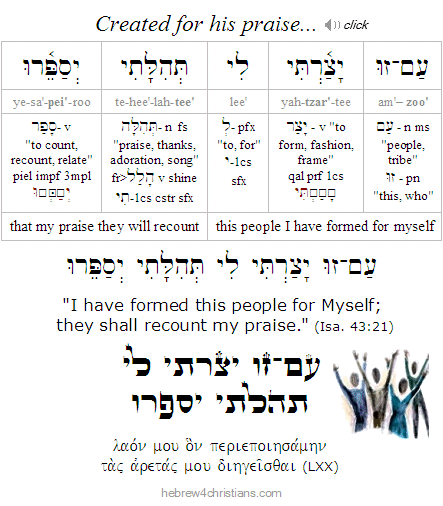 |
The Call to Faith...

10.15.20 (Tishri 27, 5781) An implication of genuine faith in the LORD is the realization that your life is a sacred trust and therefore everything matters... Nothing is trivial; nothing is inconsequential. In the world to come you will be shocked to understand that everything you thought, everything you said, and everything you did was given to you from above, and therefore has tremendous significance (Matt. 12:36-37). Indeed, your entire life is on loan from heaven itself. Therefore "seek first the kingdom of God and His righteousness..." (Matt. 6:33). Faith invests all of the heart to the journey at hand; it seeks God's presence in all things and trusts God in all its ways (Prov. 3:5-6). "The present form (τὸ σχῆμα) of this world is passing away" (1 Cor. 7:31), and the heart of faith looks for a city whose designer and builder is God Himself (Heb. 11:10). "So we do not lose heart... For the things that are seen are turning to dust, but the things that are unseen endure forever" (2 Cor. 4:16-18).
בְּטַח אֶל־יְהוָה בְּכָל־לִבֶּךָ
וְאֶל־בִּינָתְךָ אַל־תִּשָּׁעֵן
בְּכָל־דְּרָכֶיךָ דָעֵהוּ וְהוּא יְיַשֵּׁר ארְחתֶיךָ
be·tach · el · Adonai · be·khol · lee·be'·kha
ve'el · bee·na'·te·kha · al · tee·shah·ein
be·khol · de·ra·khey'·kha · da·ei'·hoo · ve·hoo · ye·ya·shier · or·cho·tey'·kha

"Trust in the LORD with all your heart,
and do not lean on your own understanding.
Know Him in all your ways, and He will straighten your paths."
(Prov. 3:5-6)
Hebrew Study Card

Hebrew Lesson:
Proverbs 3:5-6 Hebrew reading (click):
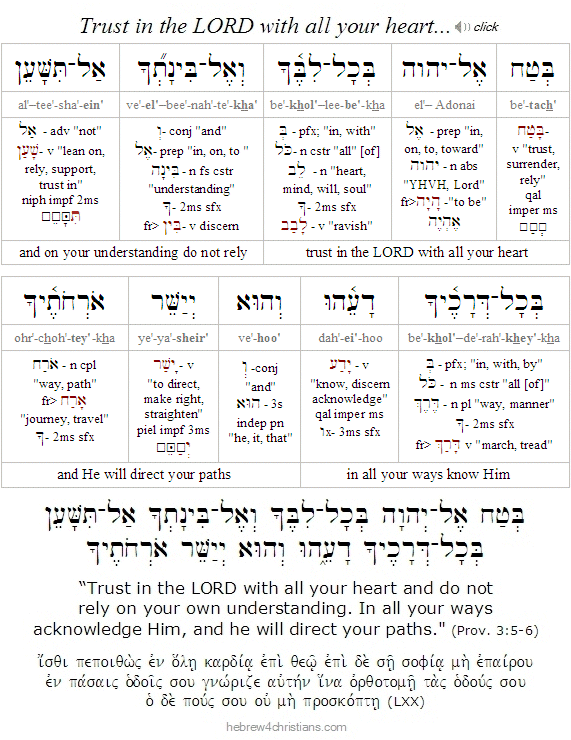 |
"Know Him in all your ways," that is, in all that you put your hand to do look for the Divine Presence and guidance (1 Cor. 10:31). As King David stated, "I have set the Lord always before me, because He is at my right hand, I shall not be moved" (Psalm 16:8). The very first step of the journey is to find hope, and every subsequent step is marked by hope's comfort. Therefore keep moving forward and don't look back. Yeshua warned us that the person who puts his hand to the plow and then turns back is not fit for the kingdom of heaven (Luke 9:62). Keep focused on what is most essential; guard yourself from the world and its varied distractions. Make a place within your heart for the Divine Presence; find a quiet moment to listen for God's comfort. Trust that God is on the road ahead for you; believe that God foresees your way and prepares a place for you. Ask for guidance from the Lord: "Cause me to know the way I should go, for I lift up my soul to you..." (Psalm 143:8).
Hebrew Lesson:
Psalm 143:8 Hebrew reading (click):
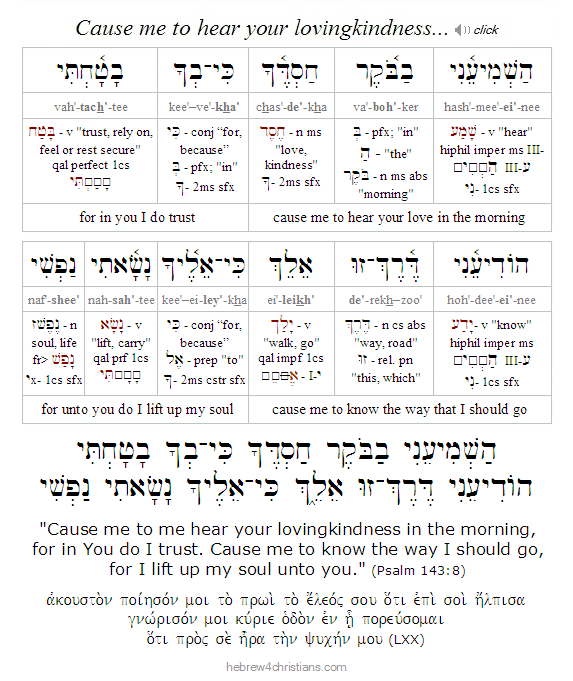 |
Creation and Rest...

[ The following concerns this week's Torah reading, parashat Bereshit... ]
10.15.20 (Tishri 27, 5781) The general account of creation ends: "So God blessed the seventh day and set it apart as as holy (וַיְבָרֶךְ אֱלֹהִים אֶת־יוֹם הַשְּׁבִיעִי וַיְקַדֵּשׁ אֹתוֹ), because on it God rested (i.e., shavat: שָׁבַת) from all his work that he had created to do" (Gen. 2:3). Here we note that rest (shevat) should not be thought of as idleness, that is, the mere cessation of work, since the divine rest is blessed and introduces a higher-level of existence, above the natural realm. This is likened to the "hidden blessing" that no manna fell on Sabbath so that what had been accrued could be used at that time (Exod. 16:25). The midrash says here that God rested only from the "work of this world," but not from the work of heaven, that is, the ongoing work of sustaining creation by the word of his power, caring for the righteous and judging the wicked, feeding the birds and watering the lilies of the field (Matt. 6:26-29, Heb. 1:3; Col. 1:16-17). "Yea, He that keeps Israel shall neither slumber nor sleep" (Psalm 121:4). Therefore it was on the Sabbath day that Yeshua asked the paralytic man, "Do you want to be healed?" and then instructed him to take up his mat and walk (John 5:1-9). To those religious gatekeepers who accused him of "breaking the Sabbath" because he did this, Yeshua said, "My Father is working until now, and I am working too," a statement that enraged them, since they understood that Yeshua was making himself equal with the LORD God Himself (John 5:17-18).
Hebrew Lesson:
Deut. 5:12 Hebrew reading (click):
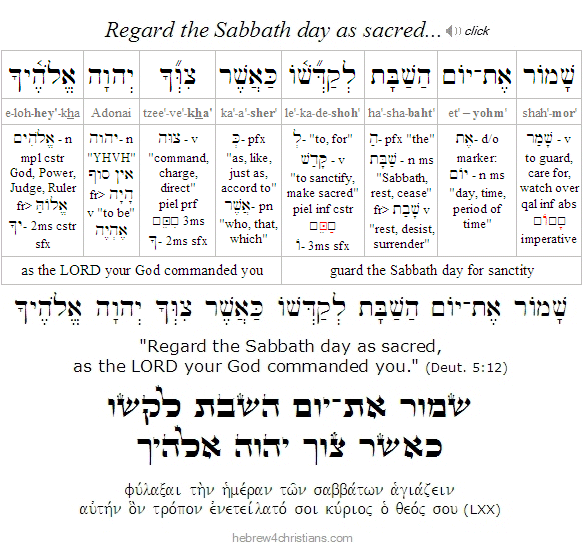 |
But what about this matter of Sabbath observance? Did Yeshua "break the Sabbath" as he was accused or did he rather have a different understanding of its true meaning? When he was criticized by the Pharisees for allowing his disciples to pick some grain from the fields on the Sabbath, he responded that the Scriptures themselves testified that King David "broke the commandment" by eating the sacred bread reserved for the priests (i.e., the "showbread"), and noted that the priests likewise "profaned" the Sabbath by performing their avodah (service) at the Temple (Matt. 12:1-5). Yeshua then stated that "someone greater than the Temple is here" and went on to chastise his accusers by pointing out that the deeper principle of the Torah is to show mercy before sacrifice (see Hos. 6:6, Psalm 51:16-17, Prov. 15:8, Matt. 9:13, etc.). As the very "Lord of the Sabbath" (i,e., אֲדוֹן הַשַּׁבָּת, Matt. 12:8), Yeshua sanctioned acts of mercy and compassion to be performed on the consecrated day of rest. Indeed, just as the law permitted a male to be circumcised or an animal to be pulled out of a well on this day, for all the more reason should a person be healed on the Sabbath (Matt. 12:11-13). The Sabbath is therefore not a day of (static) rest (or "non-doing") but is a means of providing rest for others by doing gemilut chasadim, that is, acts of chesed and mercy. Again, the Pharisees and religious authorities had confused the "inner" with the "outer" and made a category mistake, and therefore Yeshua axiomatically said: הַשַּׁבָּת נֶעֶשְׂתָה לְמַעַן הָאָדָם וְלֹא הָאָדָם לְמַעַן הַשַּׁבָּת - "the Sabbath was made for man, and not man made for the Sabbath" (Mark 2:27). Of our Savior it was prophetically said: "Out of the ground that the LORD has cursed, this one shall bring us comfort (נָחַם) from our work and from the painful toil of our hands" (Gen. 5:29).
Design and Substance...

[ The following is related to last week's Torah portion, parashat Bereshit... ]
10.15.20 (Tishri 27, 5781) "In the beginning God created the heavens and the earth, and the earth was tohu va'vohu - without form and empty, and darkness was over the face of the deep..." (Gen. 1:1-2). The sages comment that knowing that God created the heavens and the earth makes us realize that by themselves earthly things are without purpose and substance, since life in the natural world is havel havalim (הֲבֵל הֲבָלִים), "vanity of vanities," apart from the design (form) and the substance of God. Faith in the upper "world" of God, that is, the heavenly realm, therefore evokes a sense of discontent and longing within the soul, and the temporal world and its pleasures will seem distracting and empty. This lack of form and emptiness was part of the original design of creation, however, since it was after God had created the universe that "he saw everything that he had made, and behold, it was very good" (Gen. 1:31).
Just as we cannot see light but by means of it we see other things, so with Yeshua, the Light of Life, the Form and Substance of God... By His illumination we are able to see the spiritual reality of God's Presence and invincible love... Yeshua is "the radiance of the glory of God and the exact imprint of his nature, and he upholds the universe by the word of his power" (Heb. 1:3). He is the Fountain of Life: by his light we see light (Psalm 36:9). Amen, God is light, and in Him is no darkness at all (1 John 1:5).
Hebrew Lesson:
Psalm 36:9 Hebrew reading (click):
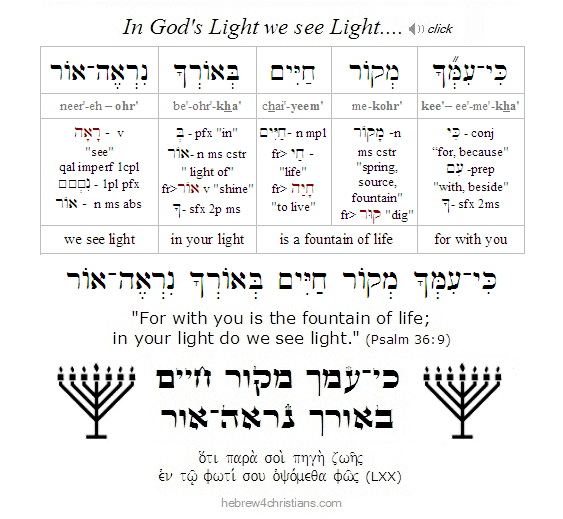 |
Note that some teachers claim that there was a "gap" in time between Gen. 1:1 and 1:2 in which the devil rebelled and a cosmic war between good and evil occurred that resulted in the fall of Satan. According to this view, God "started over" by saying yehi ohr, "Let there be light" (Gen. 1:3). There is no textual evidence for such a gap, however, and indeed there are reasons to reject this view as mistaken. First, the Ten Commandments state that God created all that existed - including time, space, angels - in six days (Exod. 20:11; John 1:3). Second, the devil could not have fallen before the creation since he was created "an anointed covering cherub" while in the original paradise (see Ezek. 28:13-15). Third, the taunt of the fall of the King of Babylon prefigured the fall of Satan, where the pride of the evil one was exposed: "You said in your heart, 'I will ascend to heaven; above the stars of God I will set my throne on high; I will sit on the mount of assembly in the far reaches of the north; I will ascend above the heights of the clouds; I will make myself like the Most High' (Isa. 14:13-14). Notice that the desired ascent was above the stars, above the clouds, etc., all of which were created when God made the expanse (Gen. 1:14-18). Finally, the Scriptures state that there was no sin or death until man brought them into the world (Rom. 5:12), and, since Torah tells us everything was very good at the end of the creation week (Gen. 1:31), Satan must have fallen after Adam was created.
The Gospel in the Garden...

[ We always read parashat Bereshit on the Sabbath following the holiday of Simchat Torah, and therefore it begins Torah reading for the new Jewish year.... Right at the outset of the narrative of the Torah, then, we will read about the "proto-euangelion," or the "first gospel" message of God's redemption given through the Promised Seed of Eve... ]
10.15.20 (Tishri 27, 5781) The very first prophecy of the Torah concerns the promise of the coming "Seed of the woman" who would vanquish the serpent (nachash) that had originally tempted and deceived Eve (Gen. 3:15). This prophecy is sometimes called the proto-euangelion ("first gospel"), since it is the starting point of all subsequent prophecy and redemptive history revealed in the Scriptures. Indeed, since the mystery of the Incarnation of God the Son (the "Son of Man") is foreshadowed here, this prophecy is linked to the original woman, Eve. Just as Eve became a carrier of the corruption of human nature by heeding the voice of the tempter, so she would be the carrier of God Himself for the deliverance of mankind through the advent of the Redeemer. In the tragic aftermath of the transgression of the first man and woman, then, God first announced His unfailing redemptive love for the human race that would culminate in the birth, sacrifice, and resurrection of Yeshua our Savior and Deliverer - "born of a woman, born under the law" (Gal. 4:4).
Our restoration begins with God's love and passion. God's first question to Adam after he broke covenant was: "Where (אַיֶּכָּה) are you?" - the voice of a loving Father in search of his son (Gen. 3:9). Of course God knew exactly how his son was attempting to hide, though He almost acted as if He was unwilling to believe that he would betray his love by disobeying His commandment. Therefore God's poignant question was directed to Adam's heart: "Oh my son, how did you get to this place?" God was giving Adam an opportunity to turn back to Him, to confess the sin, to undergo teshuvah, to become reconciled... This is the necessary prelude to any honest relationship with God.
Recall that the original promise of the coming Savior was given within the context of the curse and judgment upon Satan: "I will put enmity between you and the woman, and between your seed and her seed; he shall crush your head, and you shall crush his heel" (Gen. 3:15). That God's promise was first directed to Satan is surely by design, since he "left his first estate" by becoming the "monster in the garden" and was therefore primarily responsible for the transgression of Adam and Eve in the first place (Ezek. 28:13-15,19). The promise delivered to Satan was therefore one of coming retribution and divine judgment: Evil would not have the last word in the matter of mankind, and therefore Satan's schemes would be avenged by God in the fullness of time (Gal. 4:4-5). Notice, however, that Adam and Eve were not yet judged for their sin when the LORD God gave the promise of the coming of the Redeemer. Before a word of judgment was directed toward them, God's love and light was already revealed. Indeed, immediately after their judgment was pronounced, "the LORD God made tunics of skin for Adam and his wife and clothed them" (Gen. 3:21) - a clear picture of being compassionately "robed in righteousness" imparted by an innocent sacrifice. The very first sacrifice recorded in the Torah - performed by God Himself - prefigured the coming redemption by the "seed of the woman" who would die as a substitutionary sacrifice for their sins, and therefore Yeshua is rightly called "the Lamb slain from the foundation (or beginning) of the world" (Rev. 13:8). This further explains why Eve's son (Abel) offered a blood sacrifice that was accepted by the LORD, whereas Cain's offering the "fruit of the earth" was rejected.
The very first prophecy of Torah therefore describes - in the most succinct form - the coming of the Savior and the great conflict of the ages. First, God declares that He would put enmity (אֵיבָה) between Satan and the woman. This enmity, or "hostile hatred," was based on the memory of Eve's misguided trust she evidenced in the garden. When Eve first sympathetically listened to the lies of the nachash (serpent), she immediately began her descent into exile and became a temptress herself. Her first step toward sin was a gullibility or openness that ultimately resulted in a lack of trust of God (which is part of the reason why we must be saved by trusting, as a "like-for-like" reversal of the original sin). At the very dawn of human history, then, we see that "truth" (אֱמֶת) apart from God (א) leads to death (מֵת). Eve was deceived because of Satan, but Adam deliberately chose to disobey God (2 Cor. 11:3; 1 Tim 2:14). In response to her teshuvah (repentance), God blessed Eve before He judged her by imparting to her a God-given hatred for Satan and his lies, as well as the promise that she would take part in the birth of the Savior of mankind. The first promise of the gospel, then, focused on the woman and her role in the coming redemption. Notice that Adam later renamed his wife Eve (i.e., Chavah: חַוָּה, the "mother of life") as an expression of his faith that the promised seed would come through her.
וְאֵיבָה אָשִׁית בֵּינְךָ וּבֵין הָאִשָּׁה
וּבֵין זַרְעֲךָ וּבֵין זַרְעָהּ
הוּא יְשׁוּפְךָ רֹאשׁ
וְאַתָּה תְּשׁוּפֶנּוּ עָקֵב
ve·ey·vah a·sheet be·ne·kha oo·vein ha·ee·shah
oo-vein zar·a·kha oo-vein zar-ah
hoo ye·shoof-kha rosh
ve·a·tah te·shoo·fen'·noo a·keiv

I will put enmity between you and the woman,
and between your offspring and her offspring;
he shall crush your head, and you shall crush his heel."
(Gen. 3:15)
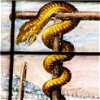
Hebrew Lesson:
Genesis 3:15b Hebrew reading (click):
 |
Eve might have initially believed that her firstborn son Cain (קַיִן) was the promised Seed himself. After all, the miracle of birth surely came as a great shock to her, and Eve's faith in God's promise that through her seed would come the deliverer was doubtlessly upon her heart at this time. When Eve called her son "Cain" (wordplay from the verb kana (קָנָה), "to get"), she was expressing her faith in God's promise: קָנִיתִי אִישׁ אֶת־יהוה / kaniti ish et-Adonai, "I have gotten a man - namely, the LORD" (Gen. 4:1). Eve's faith was obscured by the translators, however, who rendered the Hebrew as "I have gotten a man with the help of the LORD" (i.e., they inserted the idea of "help" and translated the particle et (את) as "with" rather than as the direct object marker for the verb). The ancient Jewish targums, however, agree with the original Hebrew. For example, Targum Yonatan reads: "I have gotten a man - the Angel of YHVH." Surely Eve, the first mother of humanity, was endowed with great wisdom from God, especially after she turned to Him in repentance after her disobedience. The straightforward reading of her words, then, expressed her hope that the LORD Himself would be made a man...
Despite her hope that Cain was none other than the God-Man and promised Deliverer, Eve's hopes were dashed when it became clear that her son was of the seed of Satan (1 John 3:12). His younger brother Abel (הֶבֶל) was a shepherd who evidenced faith in the promise of the coming redeemer by offering blood sacrifice (Gen. 4:3-5). Abel was persecuted and finally murdered by his brother Cain "because his own deeds were evil and his brother's righteous." Their spiritual conflict is indicative of the ongoing warfare between the "sons of darkness" and the "sons of light."
The murder of Abel necessitated that the coming seed would descend through another child, and therefore the Torah describes the birth of Seth (שֵׁת, lit. "appointed"), the third son of Adam and Eve. The Scriptures further state that it was the descendants of Seth who "began to call upon the Name of the LORD" (לִקְרא בְּשֵׁם יהוה), indicating that they had faith in God (אֱלהִים) as the Compassionate Covenant Keeper (יהוה) who would redeem humanity by means of the coming seed. Seth called his firstborn son Enosh ("man"), perhaps in the hope that his child would be the promised Savior (interestingly, bar enosh (בַּר אֱנָשׁ), or "Son of Man," is the name for the Savior (Dan 7:13).
To continue reading see: "The Gospel in the Garden: Further thoughts on parashat Bereshit."
The Dust of God....
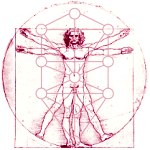
[ The following is related to last week's Torah portion, parashat Bereshit... ]
10.15.20 (Tishri 27, 5781) "Then the LORD God formed the man from dust of the ground and breathed into his nostrils the breath of life, and the man became a living soul" (Gen. 2:7). We tend to think of dust in self-effacing terms; for example, repenting in "dust and ashes" expresses unworthiness and sinfulness. Yet the dust God used to form Adam was not worthless, but instead represented very fine particles of creation, a substance suspended midway between heaven and earth, almost a "spiritual matter." This is suggested by the fact that God first intended man to be his image bearer and only then used dust as the material for that higher end. The sages note that regarding the creation of animals, God said, "Let the earth (eretz) bring forth according to their kinds" (Gen. 1:24), but regarding man he said, "Let us make him be'tzelmeinu - in our image (as a photograph), after our likeness" (Gen. 1:26). Therefore God brought forth the lower animals in groups, but he created Adam as the only one of its kind, the son of God and prince of God's creation. God breathed into Adam nishmat chayim (נִשְׁמַת חַיִּים), "a living soul" (the word neshamah [נשָׁמָה] is used to describe life breathed into humans, not to animals). The LORD breathed "out of himself" to share his own spirit with mankind... Therefore your soul does not come from nature, but from God; your inner essence originates directly from the LORD. Yeshua breathes out and says to you, "Receive the Holy Spirit" (John 20:22).
The very first occurrence of the Name YHVH (יהוה) concerns the creation of Adam. When Adam first opened his eyes and human consciousness was born, he immediately understood that the LORD created all things, including himself. According to midrash, Adam's first words were, יהוה מֶלֶךְ עוֹלָם וָעֶד / Adonai malakh olam va'ed: "The LORD is King for ever and ever" (Exod. 15:18). God then said, "Now the whole world will know that I am King," and He was very pleased. This was the "tov me'od" (טוֹב מְאד) moment of creation, when God saw all that He had made "and found it very good" (Gen. 1:31). Amen, "Let everything that has breath praise the LORD! Praise ye the LORD! (Psalm 150:6).
Hebrew Lesson:
Psalm 150:6 Hebrew reading (click):
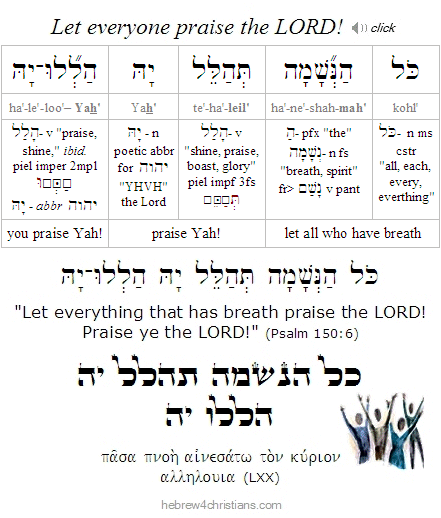 |
Note: From the statement, "for the LORD God had not caused it to rain on the land, and there was no man to work the ground" (Gen. 2:5), the early sages inferred that without man, the physical world itself would be pointless... Though there was mist physically present, the providential rains of blessing needed for the cultivation of plant and animal life would be given solely for the benefit of man... The LORD God planted the garden in the east for the sake of Adam (Gen. 2:8). From the very beginning the LORD is the Fountain of living water (מְקוֹר מַיִם־חַיִּים) poured out for us.
Daily Perush Audio Podcast:
In God's Image and Likeness...
Click the graphic below to listen to an audio lesson on the Hebrew text of Genesis 1:26 and what is meant by the "image and likeness" of God:
Mystery and Creation...

[ The following is related to last week's Torah portion, parashat Bereshit... ]
10.14.20 (Tishri 26, 5781) Why is there something rather than nothing? Why does anything exist at all? These are basic questions about the meaning of life. Where do we come from? What are we? Where are we going? "God created the universe," you say, yes, but exactly why did He do so? What purpose did he have in mind? In particular, why were you created? What is the purpose of your life? What do you hope to achieve with the limited amount of time you have on this earth? Such questions brood within the soul, even if they are hidden from consciousness by various forms of busyness and distraction. At the outset of serious thinking about anything at all we are confronted with such ultimate questions. What is real? Why are we here? Where are we going? What does God want from us?
"Where am I? Who am I? How did I come to be here? What is this thing called the world? How did I come into the world? Why was I not consulted? And If I am compelled to take part in it, where is the director? I want to see him." - Soren Kierkegaard
The Torah begins: "In the beginning God created..." (Gen. 1:1). No explanation is given, simply the mysterious declaration that God's eternal power is behind the realm of the world of appearances. We only begin to get some idea of God's hidden purposes as he reveals his design in Scripture. There we learn that God chose to create the universe yesh me'ayin, "out of nothing," in order to share his wisdom, glory, and love with other beings He created. "You created all things, and for Thy pleasure they are and were created" (Rev. 4:11). All this was for the sake of the Messiah, who built the world in chesed (חֶסֶד) and who forever reigns as the King of eternal life and love. "For from him and through him and to him are all things" (Rom. 11:36). The purpose of your life is to learn that you are beloved by God, to know and receive the infinite worth you have in his eyes, and to share that love with others. Indeed, you were created to be made part of God's great family, the Kingdom of Love...
Hebrew Lesson:
1 Chron. 29:14b Hebrew reading (click):
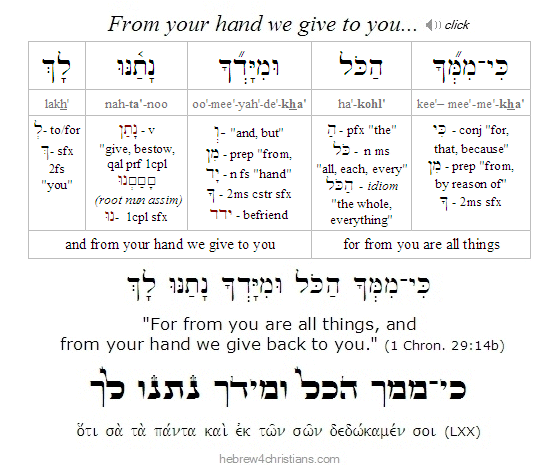 |
For more on this topic see: "Creation and the Kingdom of Love..."
Seeing the Unseen...
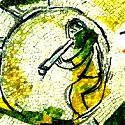
10.14.20 (Tishri 26, 5781) The Torah begins with the letter Bet (בּ), representing the number two, because God created not one world, but two. There is the realm of this world, called olam ha-zeh (עוֹלָם הַזֶּה), and there is the realm of the world to come, called olam ha-ba (עוֹלָם הַבָּא). The letter Bet therefore represents a two-fold house (בַּיִת) - the "house" of physical creation and the "house" of spiritual reality. The letter itself is formed from three Vavs (ו), which add up to 18, the same value for the word chai (חי), or "alive." We are strangers and sojourners here. Life is this present world is likened to a walking a corridor that leads to the next world. Awaken to your eternal end in the world to come: "Know whence you came and to where you are going and before Whom you are destined to give a final accounting" (Pirkei Avot 3:1). Learn to discern "the invisible things of Him from the creation of the world" (Rom. 1:20). "So do not lose heart. Though our outer self is wasting away, our inner self is being renewed day by day. For this light momentary affliction is preparing for us an eternal weight of glory beyond all comparison, as we look not to the things that are seen but to the things that are unseen. For the things that are seen are transient, but the things that are unseen are eternal" (2 Cor. 4:16-18). Press on toward the goal for the prize of the upward call of God in Yeshua our Messiah (Phil. 3:14).
Hebrew Lesson:
Psalm 33:6 Hebrew reading (click):
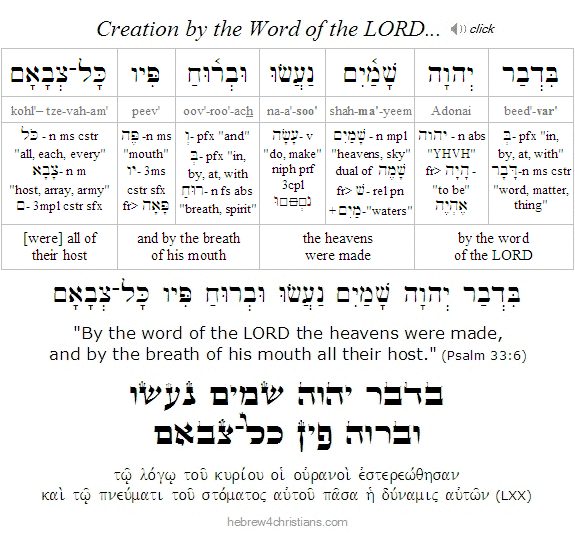 |
The Narrator of Torah...
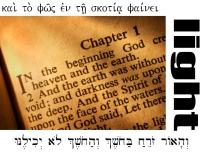
10.14.20 (Tishri 26, 5781) Since we are reading the Torah again for another year, it is worthwhile to remind ourselves about how the Torah itself begins... In this connection we note that it speaks from an omniscient, "third person" perspective. When we read, "In the beginning, God (אֱלהִים) created the heavens and the earth," we must ask who exactly is speaking? Who is the narrator of the Torah? The next verse states that the Spirit of God (רוּחַ אֱלהִים) was hovering over the face of the waters (Gen. 1:2), followed by the first "direct quote" of God Himself: i.e., יְהִי אוֹר: "Let there be light" (Gen. 1:3). The creative activity of Elohim (God) and the presence of Ruach Elohim (the Spirit of God) are therefore narrated by an omniscient Voice or "Word of God" (i.e., davar Elohim: דְּבַר הָאֱלהִים). Obviously the Spirit of God is God Himself, just as the Word of God is likewise God Himself, and therefore the first verses of the Torah reveal the glorious nature of the Godhead (i.e., hashilush HaKadosh: השילוש הקדוש). God is One in the sense of echdut, "unity," "oneness," and and so on, though not "one" in the monistic sense of a solipsistic mind (νοῦς). God is beyond all theological predications: there can be no sense of "person" apart from relationship, and therefore God's Personhood entirely transcends all our finite conceptions - and yet God forever is One....
Hebrew Lesson:
Genesis 1:1 Hebrew reading (click):
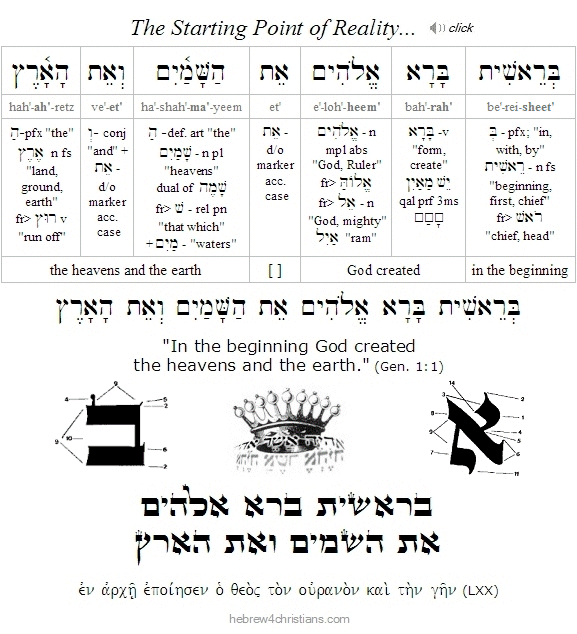 |
Trust from the Heart...

10.14.20 (Tishri 26, 5781) "Trust in the LORD with all your heart, and do not rely on your own understanding" (Prov. 3:5). Note the contrast between trusting and understanding in this familiar verse. Trust is a matter of heart, the decision to let go, whereas understanding is analytical, "objective," a matter of physical seeing. Human reason may help you discern the "what" of faith, but it is powerless to waken the soul, to breath life into heart, and to impart passion to seek God's Presence as your greatest need and your utmost good. That only comes through the painful awareness of your own sinful condition, the inner conviction that you are utterly undone and without hope apart from the real presence of God in your life...
בְּטַח אֶל־יְהוָה בְּכָל־לִבֶּךָ
וְאֶל־בִּינָתְךָ אַל־תִּשָּׁעֵן
be·tach · el-Adonai · be·khol-lee·be'·kha
ve·el-bee·na·te·kha · al-tee·sha·ein

"Trust in the LORD with all your heart
and do not rely on your own understanding"
(Prov. 3:5)

Hebrew Study Card
Hebrew Lesson:
Proverbs 3:5 reading (click):
Most commandments do not test how we comprehend our faith as much as they test the surrender of our heart. The test of faith requires bittachon (בִּטָּחוֹן) - that is, abandoning our need to understand so that we can completely cling to God's wisdom...
"Fear not, for I am with you..." אַל־תִּירָא כִּי עִמְּךָ־אָנִי. What we need most of all is right here, present in this hour, whether we're conscious of it or not. God is with you, even if you feel alone, lost in darkness, unclean, afraid... "Dear Lord Jesus, I don't know who I am, I don't know where I am, and I don't know what I am, but please love me" (prayer of a sufferer from Alzheimer's disease). That's what we need most, to trust that we are safe in God's love, and that's the ultimate message of our atonement in Messiah.
Great War for our Souls...

10.13.20 (Tishri 25, 5781) Ultimately we are living in the midst of a great spiritual war -- the war for truth. This has been the battle from the beginning. The very first recorded words of Satan (הַנָּחָשׁ) questioned God's truth: "Did God really say...?" (Gen. 3:1). In the end there will be found two types of people: those who love the truth and those who love the lie. These are the children of light (בְּנֵי הָאוֹר) and the children of darkness (בְּנֵי הַחשֶׁךְ), respectively. Followers of Yeshua the Messiah are told to "walk as children of light" / ὡς τέκνα φωτὸς περιπατεῖτε (Eph. 5:8). The children of light are called to be am kadosh - a holy people - separate from the evil engendered by the fallen world and its forces, just as the very first creative expression of God was the separation of light from darkness (Gen. 1:3-4). The children of light "hate evil and love the good," and conversely, the children of darkness "hate the good and love evil" (Psalm 34:21, Prov. 8:13, Amos 5:15, John 3:20-21). Regarding the heavenly Zion to come, it is written: "nothing ritually unclean will ever enter into it, nor anyone who does what is detestable or practices falsehood (lit. "makes a lie"), but only those whose names are written in the Lamb's book of life" (Rev. 21:27).
We have to stand for the truth, because the truth is what sets us free (John 8:32). As Yeshua said, "For this purpose I was born and for this purpose I have come into the world -- to testify to the truth. Everyone who is of the truth listens to my voice" (John 18:37). We must turn away from the lie to embrace the truth. One day all that is hidden will become manifest. "As I looked, thrones were placed, and the Ancient of Days took his seat; his clothing was white as snow, and the hair of his head like pure wool; His throne was ablaze with fire and its wheels were all aflame. A river of fire was streaming forth and proceeding from his presence; a thousand thousands served him, and ten thousand times ten thousand stood before him; the court sat in judgment, and the books were opened...." (Dan. 7:8-9).
If the devil can't kill you, he will try to make you insane... He will lie to you about who you really are... He he will attempt harass you and vex your soul. He will whisper fearful things in your ear... He will make what is small seem big and what is big seem small. He will raise dark suspicion within your soul, causing you to walk in mistrust. He will remind you of your sins to make you feel ashamed and dirty. He will hiss that you are unlovable and unworthy. He will argue on behalf of your flesh that you deserve better than this... He will tempt you to seek relief in cisterns of emptiness and futility. Most of all, he will try to cast a spell to make you forget that you are truly a prince or princess of God Almighty... The devil seeks to drive you into the exile of loneliness and despair. Resist him in the Name of the LORD!
נָסוּ וְאֵין־רֹדֵף רָשָׁע
וְצַדִּיקִים כִּכְפִיר יִבְטָח
na'·soo · ve'ein-ro·deif · ra·sha
ve·tza·dee·keem · keekh·feer · yeev·tach

"The wicked flee when there is no one pursuing,
but the righteous are as confident as a lion."
(Prov. 28:1)
Download Study Card

Hebrew Lesson:
Proverbs 28:1 reading lesson (click):
Da lifnei mi attah omed: "Know before whom you stand!" As Elisha said to his servant Gehazi, "Do not be afraid, for those who are with us are more than those who are with them" (2 Kings 6:16). We are surrounded by an innumerable multitude of angels, with the LORD of Hosts who rules over all. Ask the LORD God Almighty to give you the "strategic advantage" over the enemy -- for you to see his wiles, but not for him to see you.... Ask God for the armor of light that blinds eyes accustomed to darkness (Rom. 13:12). How else can we fight this archenemy of our souls? We cannot fight "fire with fire," but we can appeal to the One who fills heaven and earth "with horses and chariots of fire all around" (2 Kings 6:17). "Kadosh, kadosh, kadosh, Adonai Tzeva'ot" (Holy, holy, holy is the LORD of the armies of heaven); "melo khol-ha'aretz kevodo" (the whole earth is filled with His glory" (Isa. 6:3).
Hebrew Lesson:
Isaiah 6:3 reading lesson (click):
Daily Dvar Audio Podcast:
Irrepressible Creation...

10.13.20 (Tishri 25, 5781) There is rational, intuitive, and empirical evidence to believe that the universe was created in time by a transcendental power that is the source of all value, meaning, purpose, and so on. Martin Heidegger asked, "Why is there something rather than nothing," which is not a question about a possible cause for an observed effect, but is a question about the underlying cause of any possible existence at all. The Scriptures reply: "For God's invisible attributes, namely, his eternal power and divine nature from the creation of the world, have been clearly perceived, because they are understood through what has been made, so people are without excuse" (Rom 1:20).
Hebrew Lesson:
Psalm 19:1-2 reading lesson (click):
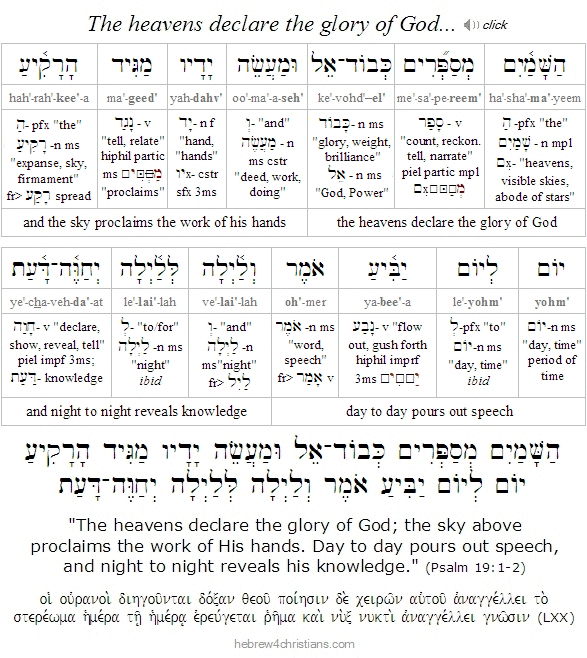 |
If the LORD is God, then that changes absolutely everything, and nothing is unaffected by this all-pervasive truth. As Abraham Heschel once said, "God is of no importance unless He is of supreme importance," and this is eminently true because "in Him we live, and move, and have our being" (Acts 17:28). Since reality turns on God, reasoning from another set of assumptions is really a form of delusional thinking that ultimately leads to insanity, that is, unsoundness of mind derived from folly or unreasonableness. The fool has said "in his heart" there is no God (Psalm 14:1). "The wicked boasts of the desires of his soul, and the one greedy for gain curses and renounces the LORD. In the pride of his face the wicked does not seek Him; all his thoughts are, 'There is no God'" (Psalm 10:3-4). The suppression of the truth necessarily implies an exchange for the lie, and with the lie comes deranged reasoning, slavery, darkness, and fear....
For more see:
The Midst of the Whirlwind...
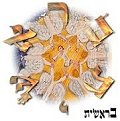
10.12.20 (Tishri 24, 5781) For reasons not explained in Scripture, God chose to begin creating the world in chaos: תהוּ וָבהוּ וְחשֶׁךְ / tohu vavohu ve'choshekh: "confusion and emptiness and darkness" (Gen. 1:2). From chaos and darkness God would shine forth light - indeed, the divine light was the first of all God's creations (a counterpart of the "Light of the World" Himself): יְהִי אוֹר וַיְהִי־אוֹר / yehi or, vayhi-or: "Let there be light, and there was light" (Gen. 1:3). God's handiwork in creation, then, first involves His mastery over chaos...
God speaks from the midst of a whirlwind (סְעָרָה, "tempest"), demonstrating that He is LORD over the seemingly chaotic world around us (Job 40:6). "Greek-minded" theology is more inclined to seek after "Apollo" (the pagan ideal of harmony and order) than the seemingly chaotic ways of the LORD God of Israel. We often want some sort of "systematic theology" and for God to be explained to us in an orderly, logical way. There is danger here that we forget that the LORD is called Esh Okhlah (אֵשׁ אכְלָה), a "consuming Fire" (Deut. 4:24, Heb. 12:29). God's thoughts are not our thoughts, neither are His ways our ways (Isa. 55:8-9). As the prophet Isaiah also said: יוֹצֵר אוֹר וּבוֹרֵא חשֶׁךְ עשֶׂה שָׁלוֹם וּבוֹרֵא רָע אֲנִי יְהוָה עשֶׂה כָל־אֵלֶּה / "I form the light, and create darkness: I make peace, and create woe; I the LORD do all these things" (Isa. 45:7).
We live in fearful times, chaverim. People are afraid of losing their money, their health, their freedoms, and so on. But we must be careful here. The fear of "losing control" can move us to anger, yet the sages liken anger to idolatry since it denies the providence of God in our lives (i.e., hashgacha partit: השגחה פרטית). Anger over the apparent chaos of life implies that we don't really believe that God is in control -- that He is speaking "from the midst of the whirlwind" -- and therefore we feel aggrieved and perhaps embittered by what might happen to us. We must look to God as the Master of the storms of life and draw closer to Him in trust. The Scriptures affirm that for those who love God "all things work together for good" - gam zu l'tovah - even if the present hour seems incomprehensible and even dangerous (Rom. 8:28-39).
Yeshua warned us not to live in fear of man, but rather to live in fear of God (Matt. 10:28). The worst that man can do is "kill the body" but he has no real power over the soul... Tribulation - the "squeezing of grapes" - is part of the life of faith, but we are invited to come "boldly" before the Throne of Grace (παρρησίας τῷ θρόνῳ τῆς χάριτος) to find help for our lives (Heb. 4:16). Note that the word translated "boldly" in this verse (παρρησίας) means that we can speak freely to God from the center of the chaos of our hearts -- without fear or shame. We don't need to conceal ourselves from the Divine Light, since this is the very Light that overmasters the "tohu va'vohu" chaos of creation! Those who accept that God is in complete control of their lives are set free from the terrible burdens of fear and outrage. Abiding in ahavah shlemah (אַהֲבָה שְׁלֵמָה, God's "perfect love") means that you can let go.
May God help us all remember: חֶרְדַּת אָדָם יִתֵּן מוֹקֵשׁ וּבוֹטֵחַ בַּיהוה יְשֻׂגָּב / "The fear of man lays a snare, but whoever trusts in the LORD will be made safe" (Prov. 29:25). Note that this "fear of man" is not just the fear of external dangers but more deeply is the fear we embrace within of our hearts - our own insecurity that undermines our faith.... May the LORD help us abide in His perfect love, free from the ravages of fear, anger, and anxiety. Amen.
Hebrew Lesson:
Proverbs 29:25 Hebrew Reading Lesson (click):
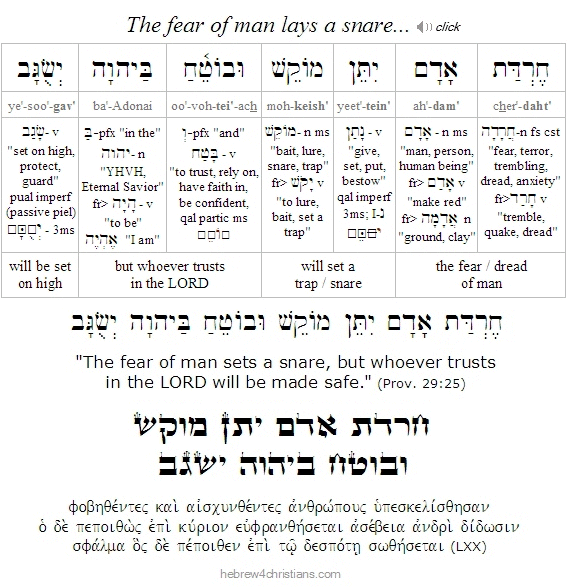 |
Daily Dvar Audio Podcast:
Arguing with God?

10.12.20 (Tishri 24, 5781) Here is another Hebrew reading lesson ("Daily Dvar") on Proverbs 3:12, "For whom the LORD loves he reproves, like a father the son in whom he delights." Click the link below to listen.
The Song of Desire...

[ The following is related to our Torah portion for this week, parashat Bereshit... ]
10.12.20 (Tishri 24, 5781) The midrash says that the word "bereshit" (בְּרֵאשִׁית) can be arranged to spell shir te'ev (שִׁיר תְּאֵב), meaning the "song of desire." This is the holy plea sounded by all of creation to be made whole, healed, and ultimately perfected. As it says in our Scriptures: "For the creation was subjected to futility, not willingly, but because of him who subjected it in hope" (Rom. 8:20). Therefore when we take hold of Yeshua's heart, vision, and mission, we partake in the repair of the world (תיקון עולם) by testifying of God's healing love given in Messiah. We begin and end our journey to life with the "song of desire" on our lips – that is, with our heart awakened to its need for God. As it says: "The LORD is near to all who call on him, to all who call on him in truth. He fulfills the desire of those who fear him; he also hears their cry and saves them" (Psalm 145:18-19).
אֲנִי לְדוֹדִי וְעָלַי תְּשׁוּקָתוֹ
a·nee · le'do·dee · ve·a·lai · te·shoo·ka·to

"I am my beloved's, and his desire is upon me."
(Song 7:10)

Hebrew Lesson:
Song 7:10 Hebrew reading Lesson (click):
Spelling out "Bereshit"...
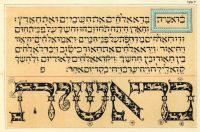
[ The following is related our Torah portion for this week, parashat Bereshit... ]
10.12.20 (Tishri 24, 5781) The 18th century Torah sage Vilna Gaon taught that the Hebrew word "bereshit" (בְּרֵאשִׁית), which is the very first word of the Bible, may be thought of as an acronym for meaningful spiritual life. The first letter, Bet (בּ), stands for bittachon (בִּטָּחוֹן), a word that means complete trust in God's love for your life; the next letter, Resh (ר), stands for ratzon (רָצוֹן), or the desire to live according to God's will; the central letter Aleph (א) stands for ahavah (אַהֲבָה), which is the love for God and for our fellow man (Deut. 6:5; Lev. 19:18); and the letter Shin (שׁ) is for shetikah (שְׁתִיקָה), or "keeping silent," which is the cardinal virtue of godly self-control and wisdom (James 1:26; 3:1-18; Psalm 34:13; Prov. 13:3, etc.). The letter Yod (י) is for yirah (יִרְאָה), or reverence for God's authority and dignity; and finally, the letter Tav (ת) is for Torah (תּוֹרָה), the study of which brings transformation and sanctity to your life (Psalm 19:7; Psalm 119:105; Prov. 6:23; Matt. 5:17-19; 2 Tim. 2:15-16).
Torah begins with the word 'bereshit' (בְּרֵאשִׁית), which may also be understood to say 'God created the world for the sake of the beginning.' All the Creator asks is that you make a beginning, that you turn in the right direction." Repent and believe -- what? Believe that you are loved, you need God's compassion and healing in your life... Indeed, we never really get past the first steps made in earnestness toward God. In that sense we are "always beginning," since we never get beyond the need of the heart to turn to God. We are all incomplete, awaiting the end for which we were created, and therefore we are always calling on the LORD, always abiding in Him, always seeking His face... We begin, we end, and in everything Yeshua is the Center of our hearts...
Shavuah Tov Audio Podcast:
The Gospel in the Garden...

10.12.20 (Tishri 24, 5781) THE VERY FIRST PROPHECY OF THE TORAH concerns the promise of the coming "Seed of the woman" who would vanquish the serpent (nachash) that had originally tempted and deceived Eve (Gen. 3:15). This prophecy is sometimes called the proto-euangelion ("first gospel"), since it is the starting point of all subsequent prophecy and redemptive history revealed in the Scriptures. Indeed, since the mystery of the Incarnation of God the Son (the "Son of Man") is foreshadowed here, this prophecy is linked to the original woman, Eve. Just as Eve became a carrier of the corruption of human nature by heeding the voice of the tempter, so she would be the carrier of God Himself for the deliverance of mankind through the advent of the Redeemer. In the tragic aftermath of the transgression of the first man and woman, then, God first announced His unfailing redemptive love for the human race that would culminate in the birth, sacrifice, and resurrection of Yeshua our Savior and Deliverer - "born of a woman, born under the law" (Gal. 4:4).
Shabbat Bereshit...

[ The Sabbath that immediately follows Simchat Torah is called Shabbat Bereshit... ]
10.11.20 (Tishri 23, 5781) In Jewish tradition, the word "Bereshit" can refer to either the first Torah portion of the Bible (i.e., Gen. 1:1-6:8) or to the first book of the Torah itself. When it is used to refer to the Torah portion, it is called "parashat Bereshit," and the text covers the creation of the universe, including Adam and Eve, the subsequent transgression of Adam and Eve, the murder of Abel by humanity's firstborn son Cain, and the increasing depravity of the generations until the time of the calling of Noah. When it is used to refer to the book, however, it is called "sefer Bereshit," or the "Book of Bereshit," and the text covers everything from the creation of the universe to the descent of Jacob's son Joseph into Egypt in anticipation of the great Exodus. Note that the ancient Greek translation of the Bible (i.e., the Septuagint) called this book "Genesis," (Γένεσις: "birth", "origin"), a name that was carried over in subsequent Latin and English translations.
The first Torah portion of Bereshit opens with this succinct statement about the creative activity of God: "In the beginning (i.e., "bereshit") God (i.e., Elohim) created the heavens and the earth." Note immediately that the Scriptures therefore begin - not from the first person perspective of some man's understanding of God - but from an omniscient third person perspective, a Voice that reveals the Glorious Power that created the entire cosmos by means of His Word. The very first verse of the Bible, then, alludes to the triune nature of God, as further indicated by the use of the plural form of the name Elohim with the singular verb bara (he created). Indeed, the word bereshit itself includes the root idea of "head" (i.e., rosh), which suggests the "head of all things," that is, to the Messiah, the Creative Word of God who is the "head of all beginning and authority" and through Whom and for Whom all things were created (Col. 1:16; 2:10).
Hebrew Lesson:
Genesis 1:1 Hebrew reading Lesson (click):
 |
After this breathtaking opening line, shrouded as it is in mystery, the Torah describes how God created the universe yesh me'ayin - out of nothing (Heb. 1:3) over a six "day" period. On the first day God created darkness and light; on the second day He created the atmosphere, dividing the "upper" from the "lower" waters. On the third day He set the boundaries of land and sea and seeded the earth with trees and vegetation. On the fourth day He fixed the position of the sun, moon and stars as timekeepers and illuminators of the earth. Fish, birds and reptiles were created on the fifth day; and land animals, and finally the human being, on the sixth. God ceased from His creative work on the seventh day, and sanctified it as a day of rest: the very first Shabbat...
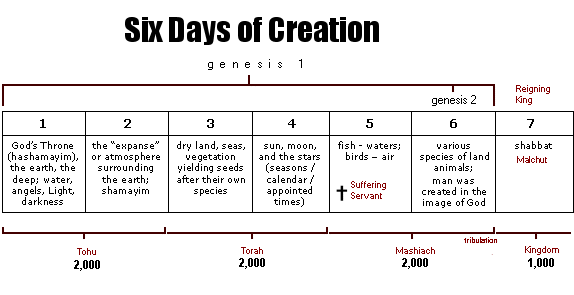 |
In addition to this general, "day by day" account of the creation of the universe by God, the Torah provides a more focused account about how God formed Adam's body from the dust of the earth and blew into his nostrils the "breath of life" so that he became a "living soul." Notice that the more detailed account includes reference to the LORD God, the first time the name YHVH is used in the Scriptures. Interestingly, in this second account the earth is described as a sort of "desert." The earth was barren of vegetation, no rain had yet fallen upon the earth, and the LORD formed the man from the "dust from the ground." After breathing into him so that he became a living soul, God planted a garden in Eden, "in the east," and there caused every tree that was pleasant to the sight and good for food to spring up from the ground. In the very midst of this orchard were two special trees: the "Tree of Life" and the "Tree of the knowledge of good and evil" (עֵץ הַדַּעַת טוֹב וָרָע). God then instructed the man to tend the orchard and to eat from whatsoever tree he desired, though he was warned not to eat from the tree of knowledge of good and evil, "for in the day that you eat of it you shall surely die" (Gen. 2:17).
Made Captive to Hope...
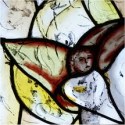
10.09.20 (Tishri 21, 5781) God gives us special graces, especially in light of the passing of days, with thwarted hope, aching bones, and inner keening for lasting deliverance. This gift of despondency helps us to awaken and to reach out to find the Real, the True, the Eternal. Learn to wait; ask God for the wisdom of patience. Between acceptance and anxiety, always choose acceptance. Find hope while waiting...
Many people want healing apart from the cure. How many settle for half-measures? While you might find respite for your suffering in temporary measures, you cannot have lasting healing apart from the divine remedy...
An old Jewish prayer, uttered somewhat wistfully, begins, "O Lord, I know that Thou wilt help us; but wilt Thou help us before Thou wilt help us?" It's not always easy to wait for God, especially when we are in pain or anxiety, but we must never, ever, give up; we must never ever, abandon our heart's longing for ultimate healing. Faith excercises hope in the Reality, Substance, and Being (ὑπόστασις) of the Invisible and is made captive to undying hope (Heb. 11:1). Therefore the Spirit cries out: "Wait for the LORD; be strong and he will strengthen your heart; and (again) wait for the LORD."
קַוֵּה אֶל־יְהוָה חֲזַק וְיַאֲמֵץ לִבֶּךָ
וְקַוֵּה אֶל־יְהוָה
ka·veih · el-Adonai · cha·zak · ve-ya·meitz · lee·be'·kha
ve-ka·veih · el-Adonai

"Wait for the LORD; be strong and and he will strengthen your heart;
and again wait for the LORD." (Psalm 27:14)
Download Study Card

Hebrew Lesson:
Psalm 27:14 Hebrew reading lesson:
In this verse, the imperative verb translated "wait" is the Hebrew word kaveh (קַוֵּה), which might better be rendered as "look for with anticipation!" or "hope!" (the same root appears in the Hebrew word for hope, i.e., tikvah: תִּקְוָה). Therefore hope in the Lord and "chazak!" - be strong! (the Septuagint translates chazak as "andridzou" (ἀνδρίζου - act like a man!). Note that the verb ve'ametz is a causal active stem (i.e., Hiphal) in the "jussive mood," which means it is imperative – "command your heart to be strengthened," or "let your heart be made strong!" Make the decision to be strong in the LORD, and the LORD will give you strength to bear your present suffering: "Look to the LORD (קַוֵּה אֶל־יְהוָה) and find hope."
בָּרוּךְ אַתָּה יהוה אֱלהֵנוּ מֶלֶךְ הָעוֹלָם
אֲשֶׁר עָשָׂנוּ אֲסִירֵי תִּקְוָה
ba·rookh · a·tah · Adonai · E·lo·hei'·noo · me'·lekh · ha·o·lam,
a·sher · a·sa'·noo · a·see·rei · teek·vah

"Blessed are You, LORD our God, King of the universe,
who has made us captives of hope."

When we put our hope in the LORD, strong in our conviction, we will be given courage to bear whatever may befall us - and this is help indeed during these perilous days! So "hope to the LORD (קַוֵּה אֶל־יְהוָה); be strong and strengthen your heart; and (again) hope to the LORD." There can be no turning to God without genuine hope (תִּקְוָה). Indeed, as the Apostle Paul wrote: "We are saved by hope" (Rom. 8:24).
Light in the Darkness...
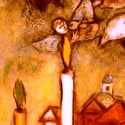
10.09.20 (Tishri 21, 5781) Surely our great need is to have heart, to find strength, resolution, and steadfast determination to walk boldly during these heartless and depraved days (2 Tim. 3:1-5). We are not without God's help, of course. Yeshua told us that the Ruach HaKodesh (רוּחַ הַקּדֶשׁ) would be "called alongside" (παράκλητος) to comfort us on the journey. The English verb "comfort" literally means "to give strength" (from com- ["with"] and fortis ["strong"]), an idea similarly expressed by the verb "encourage," that is, to "put heart [i.e., 'core'] within the soul." In Hebrew, the word courage is expressed by the phrase ometz lev (אמֶץ לֵב), meaning "strong of heart," denoting an inner quality of the will rather than of the intellect. Ometz lev means having an inner resolve, a passion, and a direction. The sages say "the mind is the eye, whereas the heart is the feet." May God be our Light and Salvation as we walk through the surrounding darkness...
יְהוָה אוֹרִי וְיִשְׁעִי מִמִּי אִירָא
יְהוָה מָעוֹז־חַיַּי מִמִּי אֶפְחָד
Adonai · oh·ree · ve·yeesh·ee · mee·mee · ee·ra?
Adonai · ma·ohz · chai·yai · mee·mee · ef·chad?

"The LORD is my light and my salvation; whom shall I fear?
The LORD is the strength of my life; of whom shall I be dread?"
(Psalm 27:1)
Download Study Card

Hebrew Lesson:
Psalm 27:1 Hebrew reading lesson (click):
Menachem Mendl once wrote that there are three things fitting for us to do: upright kneeling, motionless dancing, and silent screaming... Not everyone will understand the pain that moves us to seek inner healing, but Gods' Presence shines for us all...
Shavuah Tov Audio Podcast:
Final Portion of Torah...
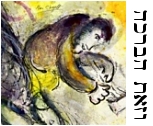
10.09.20 (Tishri 21, 5781) V'zot HaBerakhah ("this is the blessing") is the very last portion of the Torah, which records Moses' last words to the people just before his death. It is always read just after the festival of Sukkot on the holiday called "Simchat Torah." After reading this portion, we will "rewind the scroll" back to Parashat Bereshit to begin reading the Torah all over again. We do this every year because Talmud Torah - the study of Torah - never ends! A true student of Scripture cannot claim to have completed the study of the Torah, for the implications of such study extend forever. And so the cycle continues, over and over in a continuous chain of study, ever widening, and all encompassing.
Torah First and Last...

[ We read the last -- and first -- portion of Torah for the holiday of Simchat Torah... ]
10.09.20 (Tishri 21, 5781) Our Torah reading for this time of year is a bit complicated. In addition to the passages we read for the holiday of Sukkot, we also read the Book of Ecclesiastes (i.e., Kohelet) for the Sabbath of Sukkot. We will also read both the last portion of the Torah (i.e., V'zot HaBerakhah: Deut. 33:1-34:12) as well as the first chapter of the Torah (i.e., Gen. 1:1-2:3) for the holiday of "Simchat Torah" (which immediately follows Sukkot). Finally, on the Sabbath that follows the celebration of Simchat Torah, we will read the entire portion of Bereshit (i.e., Gen. 1:1-6:8). The upshot is that during this season of the year we will read the end of the Torah scroll and then "rewind" it to the beginning...
Every year we read the Torah from beginning to end... We do this every year because Talmud Torah - the study of Torah - is an ongoing venture in the life of a Jew. In this connection, it is interesting to note that the very first letter of the Torah is the Bet (בּ) in the word bereshit (בְּרֵאשִׁית), and the very last letter of the Torah is the Lamed (ל) in the word Israel (יִשְׂרָאֵל). Putting these letters together we get the word lev (לֵב), "heart," (note the similarity to the English word "love") suggesting that the entire Torah - from the first letter to the last - reveals the heart and love of God for us... Moreover, the first letter of Scripture is a Bet (בּ), as explained above, and the last letter is a Nun (ן) in the word "Amen" (אָמֵן), so the whole Bible - from beginning to end - reveals the Person of God the Son (בֶּן) for us...
Note: The holiday of Simchat Torah has its precedent in the Hak'hel (הקהל) ceremony where the people were assembled to hear the reading of the Torah by the king of Israel once every seven years just after the holiday of Sukkot (see Deut. 31:10:13). For more on this subject, see "Every Letter of Torah."
Hebrew Lesson:
Deut. 33:1 Hebrew reading lesson (click):
Prophetic Listening...

10.09.20 (Tishri 21, 5781) A verse from Torah recalls Yeshua's words that "every scribe who has been trained for the kingdom of heaven is like a master of a house, who brings out of his treasure what is new and what is old" (Matt. 13:53). The medieval sage Rashi noted that the phrase, "And it shall come to pass if you hear" in Deut. 11:13, i.e., ve'hayah im shamo'a tishme'u (וְהָיָה אִם־שָׁמעַ תִּשְׁמְעוּ), is grammatically puzzling, since it the Hebrew reads "if you hear, you will hear," which suggests that as we listen attentively to the words of Torah, we will hear more, and we will encounter spiritual connections and applications that are new and ready for this hour. The early sages commented: "If you listen to the old, you will listen to the new" (Berachot 40a). Focusing our attention on the commandments even while in exile is likened to practice for the world to come, since then they will not be new to you when the final redemption appears. Happy and blessed are all those who love the Torah (Psalm 1:1-2). More light comes as we live in the truth (John 13:17). As Yeshua also said: "For to the one who has, more will be given, and he will have an abundance, but from the one who has not, even what he has will be taken away" (Matt. 13:12).
Hebrew Lesson:
Deut. 11:13a on "hearing" (click graphic below):
 |
Torah of Death and Life....

10.08.20 (Tishri 20, 5781) Why does God want us to face the truth about death? Why does Moses ask God to teach us to "number of our days?" (Psalm 90:12). The reason is that by nature people deny the reality of death - they hide their eyes from it, ignore it, and pretend it's not there - so they can continue to live under the illusion that they are in control of their lives, that they are the center, that they are immortal little "gods." Death threatens the ego and humbles us to confess the truth about life, namely that we are not in control, that we cannot choose to be immortals, that we do not have power to exist in ourselves, and therefore we need life from a different source - spiritual life - wherein we receive a new identity and a new being found in relation to God.
The "natural man" regards death as an offense or as "absurd" because it splits us in two, creating a "divided house" that cannot stand. The ego demands be god-like, important, valued as sacred, etc., yet the prospect of death crushes the aspiration and yields alienation from reality. This creates a painful tension or dualism within the heart where the meaning and purpose of life is lost.... The message of the gospel begins precisely there, however, speaking to broken people who thirst for life but find themselves living on "death row" - people who are humbled and who understand they cannot heal themselves from the "sickness unto death," as Kierkegaard used the term. The remedy is not to deny death or to live as if death is not a genuine horror, but to understand it as our natural estate, brought about by sin that exalts the ego over the God who made us.
"Die before you die; there is no chance after." (C.S. Lewis)
The power of the gospel is to partake in a new source of life and to be healed from the sickness of death by God's miracle in Messiah (2 Cor. 5:17). "Jesus saves" is not a cliché for the faith but the sober truth of reality. It is by our union or identification with Him, by the agency of the Holy Spirit, that we are imparted new existence, true spiritual being, that is not subject to the natural law of sin and death (Col. 3:9-11). Being "in Messiah" means you are "justified," that is, welcomed, affirmed, accepted and declared righteous by God, and that you are set free from the condition of "being unto death." You partake and share in the life (relationship) of God based on his redeeming love: you are "adopted" by God, made a member of his "household," and attain the inheritance of which is eternal life. Consequently you cry out "Abba, Father" to God who watches over you and leads you through the days of your sojourn here on earth (Rom. 3:32). Despite walking through the shadowy byways and tribulations of this world, you refuse to let death define you or be the last word: you trust that your Father is with you, working all things for your ultimate good (Rom. 8:28). You know who you are, where you are going, and what your end is because of Yeshua our Lord.
Facing death is essential because the message of the gospel must be grounded and framed in the language of our wretched desperation as lost souls in this world (Rom. 7:24). Death is the central problem of existence, and death is therefore the "propaedeutic" that leads us to the salvation found in Yeshua the Messiah... When we confront the truth of our condition, there is real hope for healing. "Die before you die; there is no chance after" (C.S. Lewis).
Hebrew Lesson:
Psalm 90:12 Hebrew reading lesson (click):
 |
Yeshua the Hidden Guest...
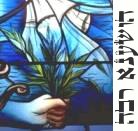
[ The following is related to the holiday of Sukkot, or the Feast of Tabernacles... ]
10.08.20 (Tishri 20, 5781) The Aramaic word "ushpizin" (אוּשְׁפִּיזִין) refers to the seven "guests" whom we remember and honor during the week-long festival of Sukkot, namely: Abraham, Isaac, Jacob, Joseph, Moses, Aaron, and King David, respectively. According to Jewish tradition, on each night a different guest (i.e., ushpiz: אוּשְׁפִּיז) enters the sukkah, and we are to symbolically welcome them by offering them a place at our table (this is similar to the tradition of putting Elijah's Cup on the table during the Passover seder). On the first night comes Abraham; on the second, Isaac, and so on.
Now in the Gospel of John we read that Yeshua said he go up to the Feast of Tabernacles "in secret" (ἐν κρυπτῷ), like an ushpiz (John 7:10). During the "middle of the festival," perhaps on the fourth day (the "Day of Joseph"), Yeshua went to the Temple and began teaching the people (John 7:14), and on the last great day, called Hoshana Rabba (הוֹשַׁעְנָא רַבָּא), when the High Priest led a parade to the pool of "Siloam" (שִׁלֹחַ) during the water libation ritual, Yeshua stood up and cried out, "If anyone thirsts, let him come to me and drink" (John 7:38).
Finally, on the morning following the festival, called Shemini Atzeret (שמיני עצרת), Yeshua returned to the Temple and said, "I am the light of the world. Whoever follows me will not walk in darkness, but will have the light of life" (John 8:12), recalling the words of the prophets: "On that day there shall be no light... and living waters shall flow out of Jerusalem; And the LORD will be king over all the earth. On that day the LORD will be one and his name one" (Zech. 14:6,9; Isa. 13:10; 30:26).
Hebrew Lesson:
Isaiah 55:1a Hebrew lesson (click):
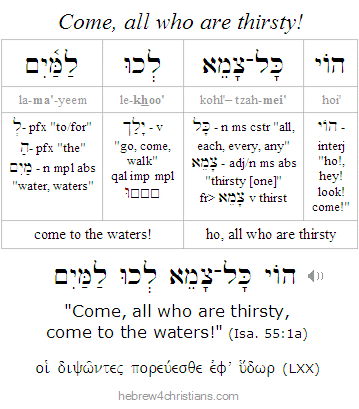 |
Note: For more on this see, "The Seven Ushpizin: Yeshua as the Hidden Guest."
Our Good Shepherd...

10.07.20 (Tishri 19, 5781) The walk of faith is one of "holy suspense," trusting that God is on the other side of the next moment, "preparing a place for you" (John 14:3). In the present, then, we live in unknowing dependence, walking by faith, not by sight. For "hope that is seen is not hope; for who hopes for what he sees?" (Rom. 8:24). This is the existential posture of faith - walking in darkness while completely trusting in God's daily care. Our task at any given moment is always the same - to look to God and to accept His will. This is where time and eternity meet within us, where God's kingdom is revealed in our hearts. Therefore our Good Shepherd Yeshua taught us: "Don't be anxious about tomorrow, for tomorrow has its own troubles. Live one day at a time" (Matt. 6:34).
יְהוָה רעִי לא אֶחְסָר
בִּנְאוֹת דֶּשֶׁא יַרְבִּיצֵנִי
עַל־מֵי מְנֻחוֹת יְנַהֲלֵנִי
נַפְשִׁי יְשׁוֹבֵב
יַנְחֵנִי בְמַעְגְּלֵי־צֶדֶק לְמַעַן שְׁמוֹ
Adonai · roh·ee · lo · ech·sar
bee·noht · de'·she · yar·bee·tzei'·nee
al-mei · me·noo·choht · ye·na·cha·lei'·nee
naf·shee · ye·sho·vev
yan·chei'·nee · ve·ma·a·ge·lei · tze'·dek · le·ma'·an · she·mo

"The LORD is my shepherd; I shall not want.
He makes me lie down in green pastures.
He leads me beside still waters.
He restores my soul.
He leads me in paths of righteousness for his name's sake."
(Psalm 23:1-3)

Hebrew Study Card
"Yea, even if I walk in the valley of the shadow of death, I will fear no evil, for you are with me" (Psalm 23:4). O God of Light, Light of the world, surely You know my need for light as I look to You, especially when darkness tries to extinguish my hope. Despite my inability to see you now, help me to know that you are with me; let "thy rod and thy staff comfort me" and lead me closer to you. Lord, when I am afraid, quicken the faith you have put within my heart. Be Thou my Shepherd in my darkness, O Lord my God...
Hebrew Lesson:
Click to listen and learn the Hebrew text:
The heart of faith senses the LORD's presence, even in the darkness, and hears the Spirit saying, "I am with you..." Love hopes all things and believes even in the midst of troubles.
I do not see the road ahead of me, I cannot know for certain where it will end. Nor do I really know myself, and the fact that I think I am following your will does not mean I am actually doing so. But I believe the desire to please you does in fact please you, and I hope I have that desire in all that I am doing. I hope that I will never do anything apart from that desire. And I know that if I do this you will lead me by the right road, though I may know nothing about it. Therefore, I will trust you always, though I may seem to be lost and in the shadow of death. I will not fear, for your are ever with me, and you will never leave me to face my perils alone. -- Thomas Merton: Seeds of Contemplation
"Who among you fears the LORD and hears (שָׁמַע) the voice of his Servant? Let him who walks in darkness and has no light trust in the Name of the LORD and rely on his God... I will lead the blind in a way that they do not know, in paths that they have not known I will guide them. I will turn the darkness before them into light, the rough places into level ground. These are the things I do, and I do not forsake them" (Isa. 50;10; 42:16).
One Day at a time...
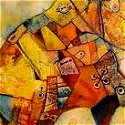
10.07.20 (Tishri 19, 5781) Instead of fretting over the tests and struggles we inevitably face in this life, we might look for reasons to be grateful, for how else can we come to know that the Lord is with us apart from his ongoing deliverance? We ask the Lord for our daily bread (לֶחֶם חֻקֵּנוּ), but I wonder if we are not starving ourselves with fear of the future... Daily bread cannot be stored or hoarded lest it become spoiled and rotten (Exod. 16:20). We must live today in complete trust before the Lord our God, who is forever faithful and true. He it is who said, "Don't be anxious about tomorrow, for tomorrow has its own troubles. Live one day at a time" (Matt. 6:34). It makes no sense to worry about the future if the LORD is the Good Shepherd who tenderly watches over your way (Psalm 23:1).
Hebrew Lesson:
Psalm 23:1 Hebrew lesson (click):
Torah your Heritage...
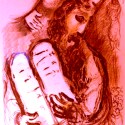
10.07.20 (Tishri 19, 5781) Our spiritual inheritance is bound up with the Torah: it is part of our story, our history, and our heritage as follows of Yeshua, the Jewish Messiah (see Deut. 33:4; Matt. 5:17-19; Gal. 3:7; Rom. 4:16; Luke 24:27). הַיְשׁוּעָה מִן־הַיְּהוּדִים - "Salvation is of the Jews" (John 4:22). The stories, rituals, and laws of the Torah serve as parables and allegories that inform the deeper meaning of the ministry of Messiah: "Now these things happened to them as an example, but they were written down for our instruction, on whom the end of the ages has come (1 Cor. 10:11). "For whatever was written in former days was written for our instruction, that through endurance and through the encouragement of the Scriptures we might have hope" (Rom.15:4). Therefore you are no longer a stranger or outsider to the great heritage of the LORD (Eph. 2:19). Disciples of Yeshua are called talmidim (תַּלְמִידִים) -- a word that comes from lamad (לָמַד) meaning "to learn." Among other things, then, following the Messiah means becoming a student of the Scriptures He loved and fulfilled (Matt. 5:17-18; Luke 24:44-45). Only after learning from Yeshua as your Teacher will you be equipped to "go to all the nations and teach" others (Matt. 28:19).
You are no longer an "outsider" to the covenants and blessings of Israel, friend (see Eph. 2:19; Gal. 3:26). Being a Jew (i.e., יְהוּדִי, from יְהוּדָה "one who praises") is really not an ethnic distinction but a matter of genuine faith in the Lord God of Israel. A true Jew is one whose heart has been transformed by the Spirit of the Living God (Rom. 2:28-19). "For in Yeshua the Messiah neither being circumcised nor being uncircumcised matters; what matters is being briah chadashah (בְּרִיאָה חֲדָשָׁה), a new creation (Gal. 6:15). "Therefore, if anyone is in Messiah, he is a new creation. The old has passed away; behold, the new has come" (2 Cor. 5:17). But understand that Yeshua clearly upheld the truth of Torah (Matt. 5:17-21), and therefore Torah is clearly part of your heritage as a follower of Yeshua, the "Christ," that is, the anointed King (i.e., Messiah) of the Jews... Indeed, the first thing Yeshua did after his resurrection was to teach his followers how the Torah, the writings, and the psalms all bore prophetic witness of Him (Luke 24:27, 44). Moreover Yeshua told his followers that the true prophets of Israel all bore witness of Him (see Matt. 5:11-12). If you love God's salvation -- his Yeshua -- then may you proclaim yigdal Elohim - "Let God be magnified" (Psalm 70:4).
 |
Hebrew Lesson:
Psalm 70:4 Hebrew reading lesson (click):
|













